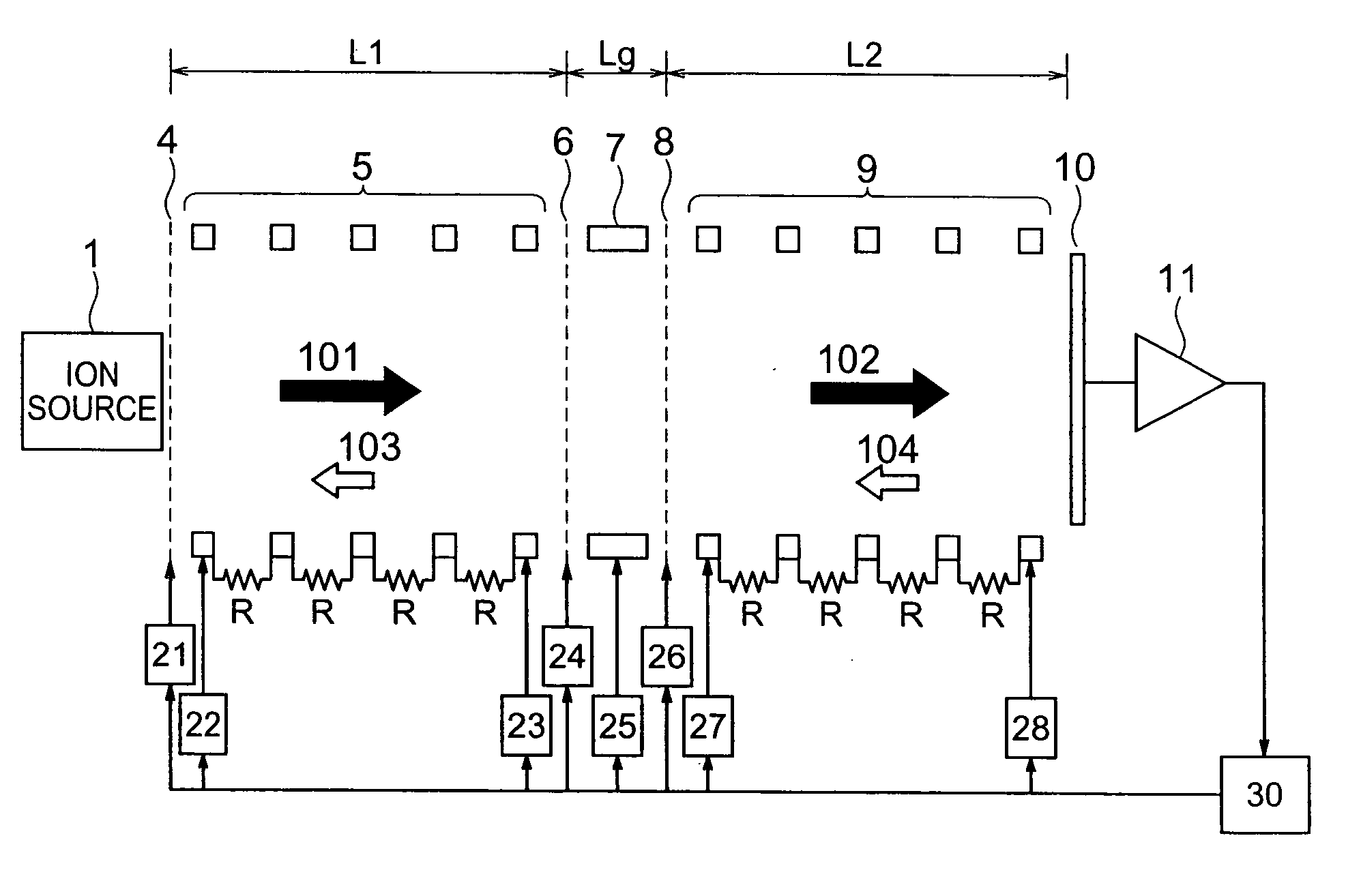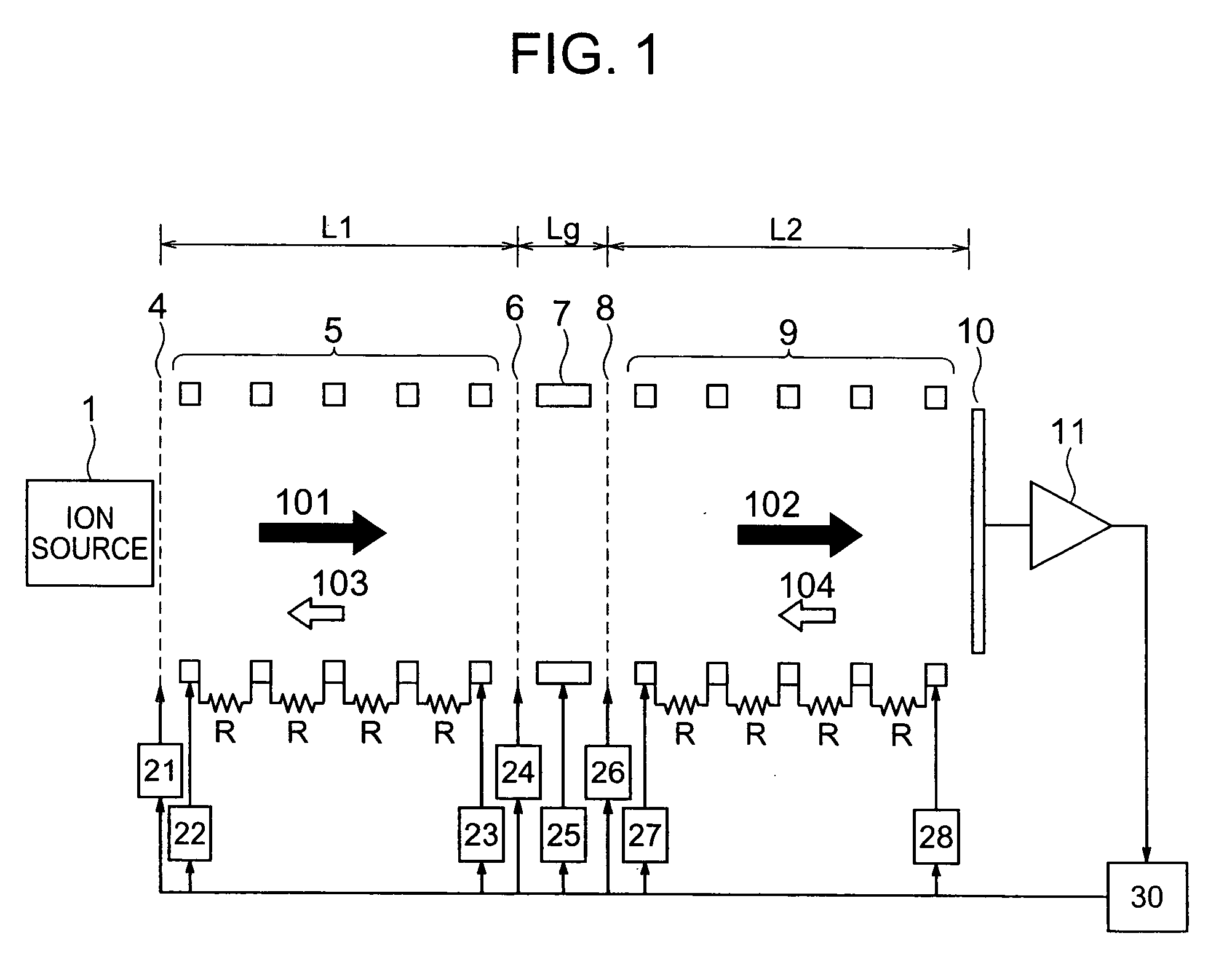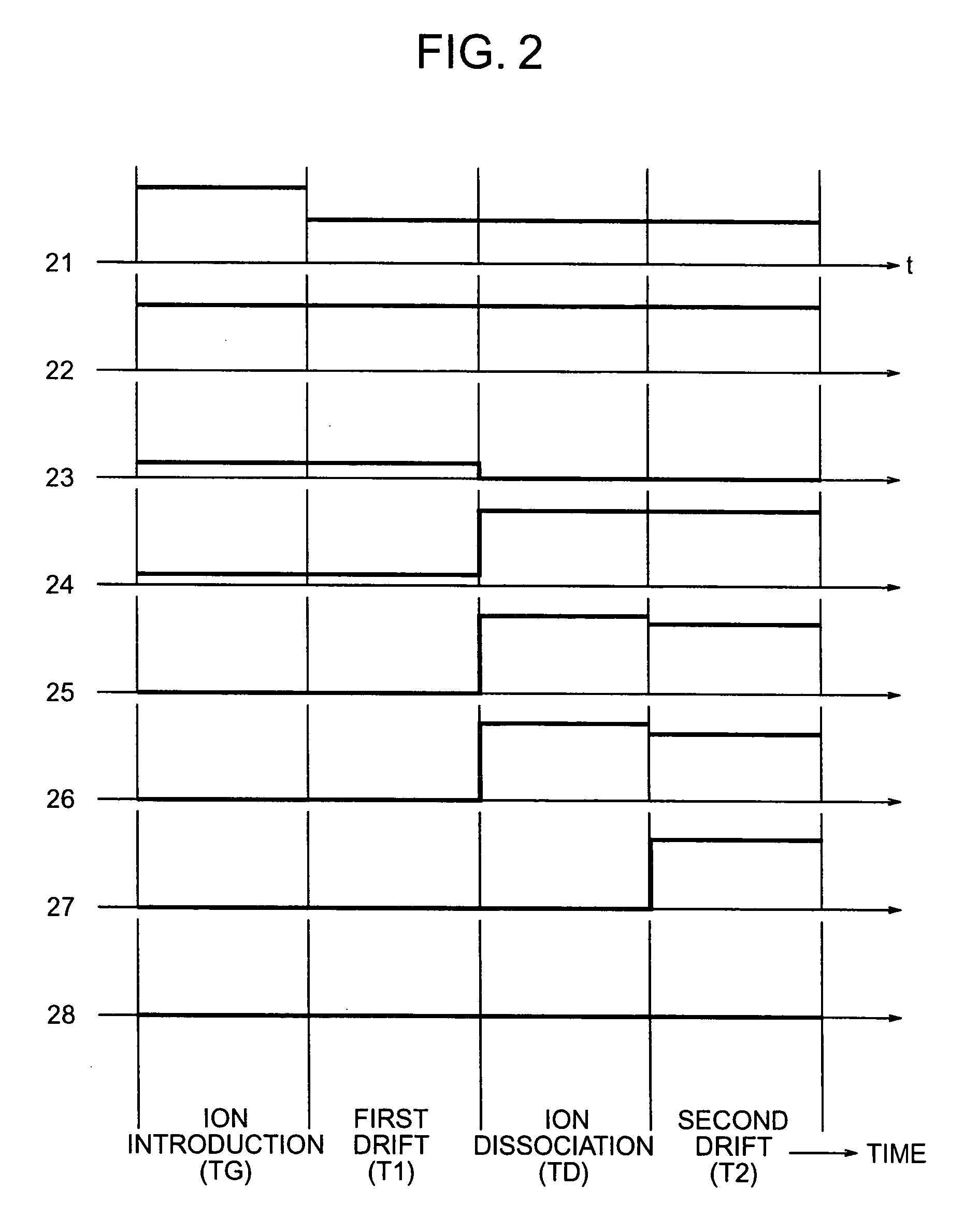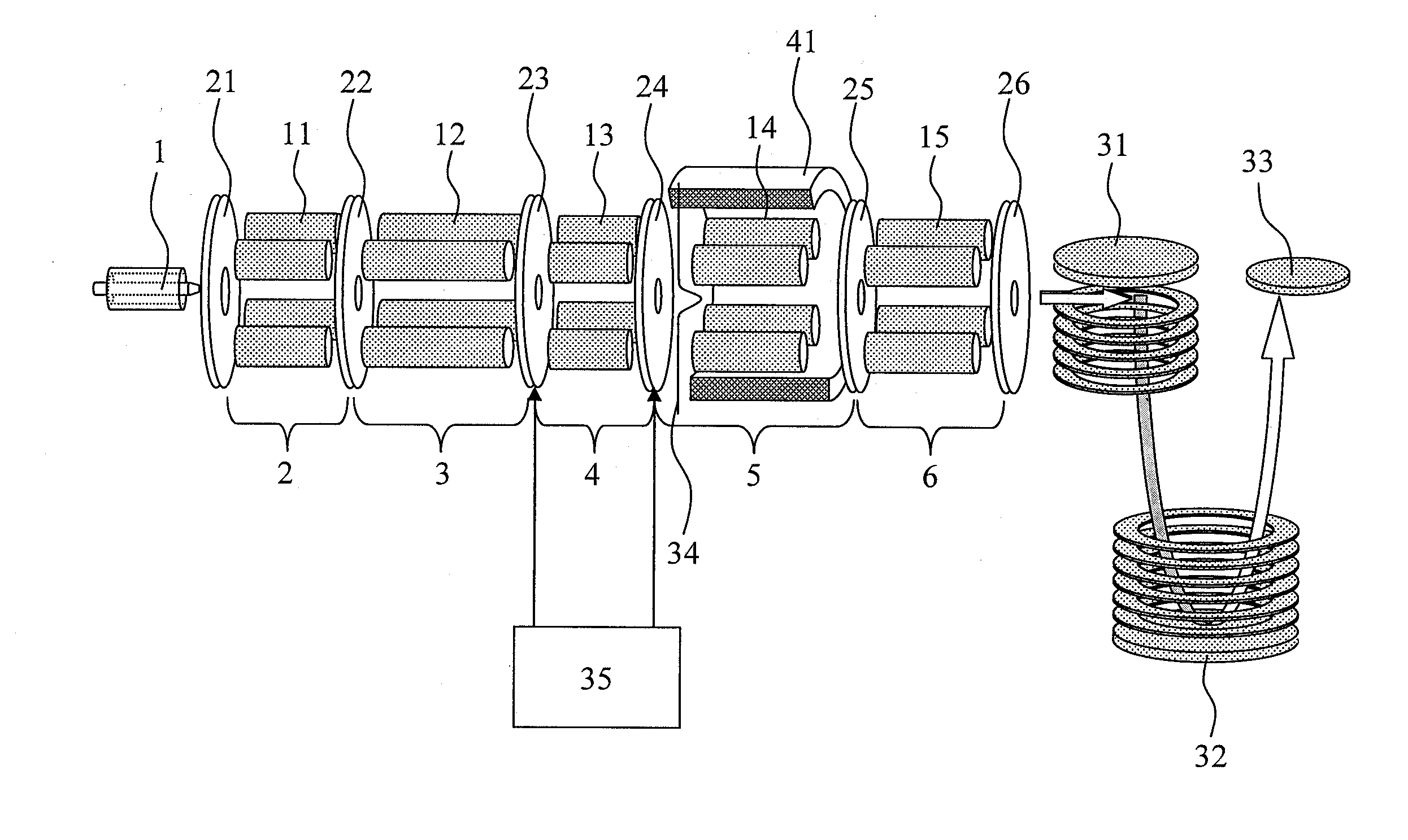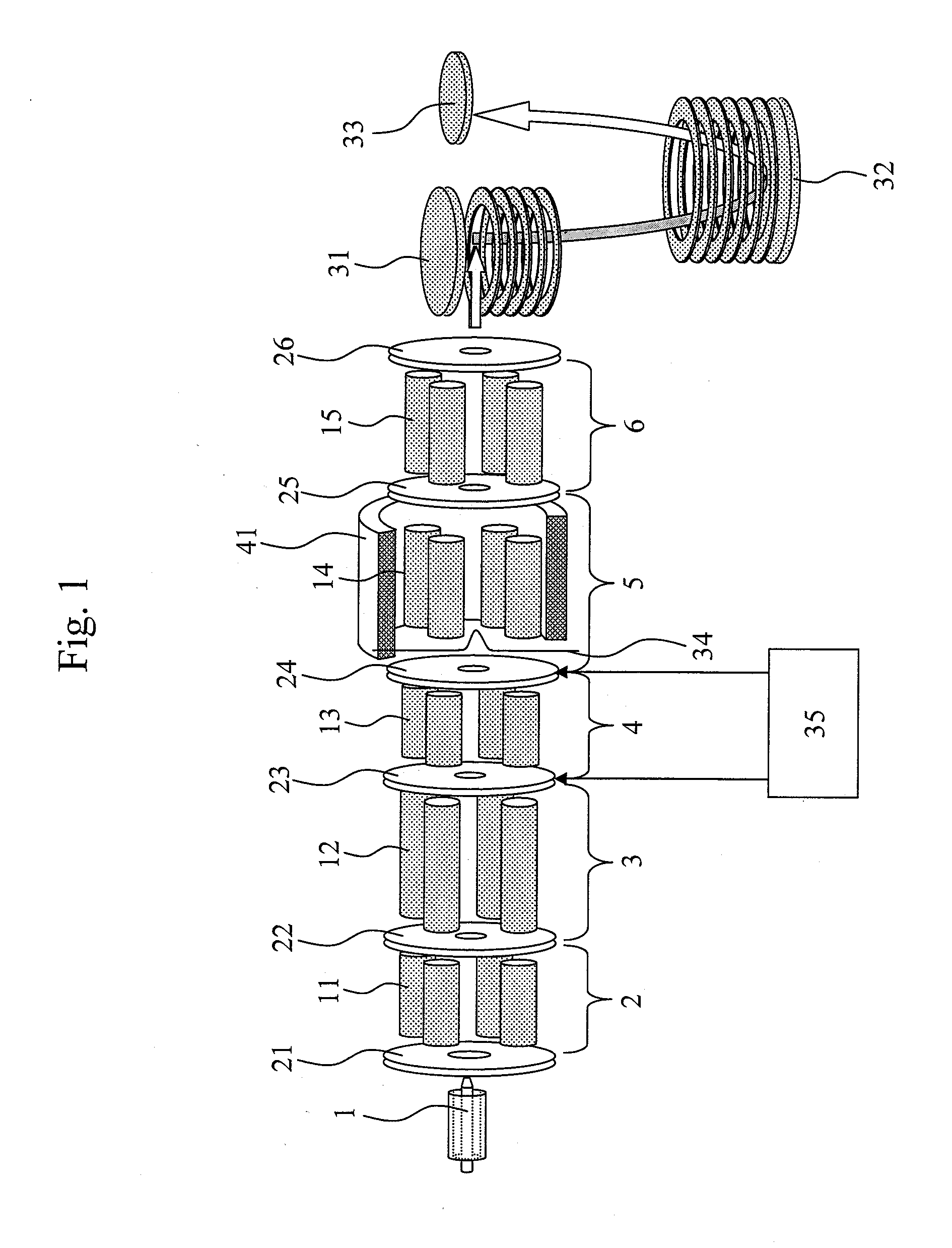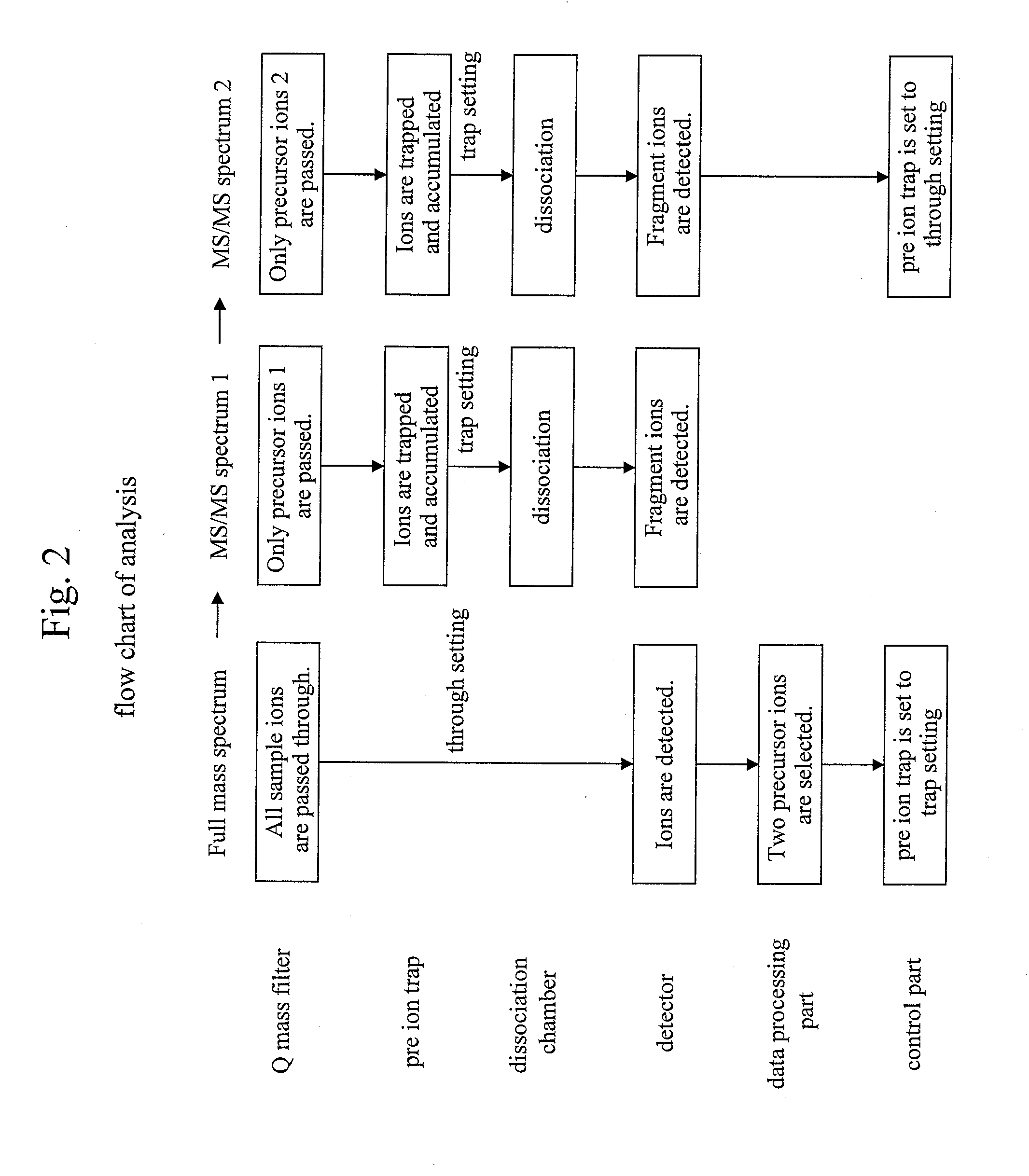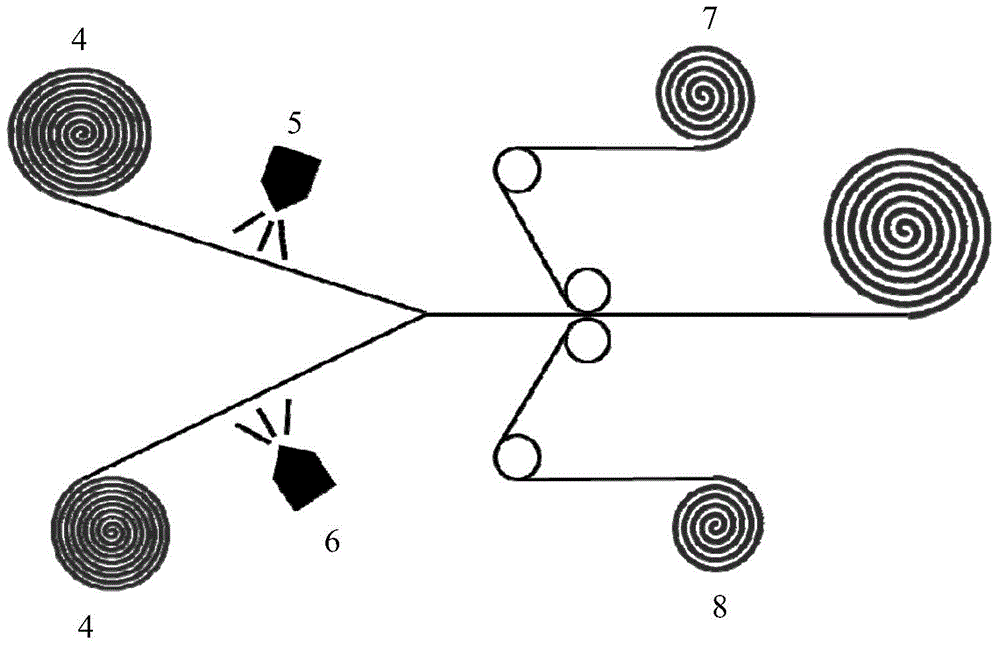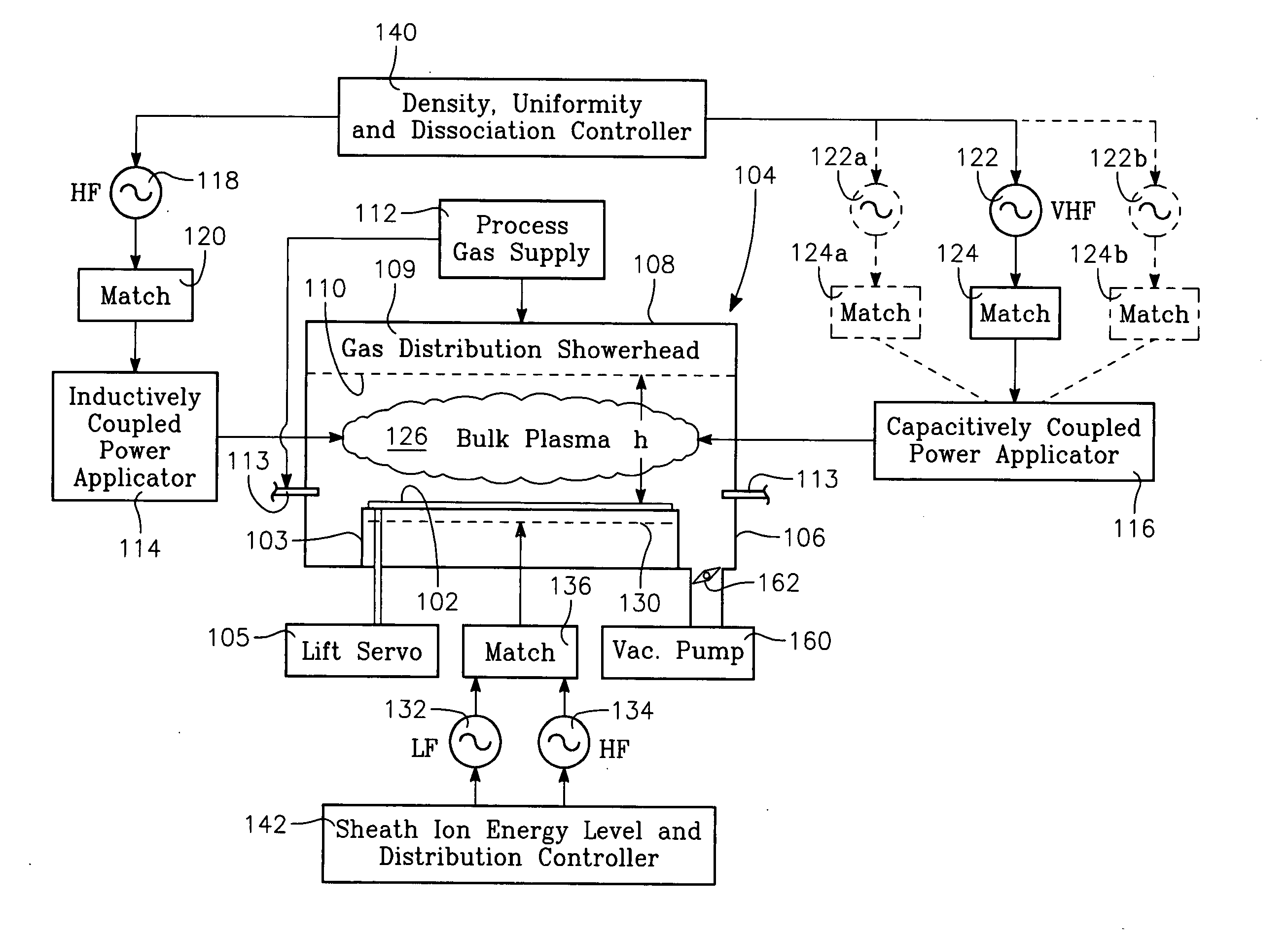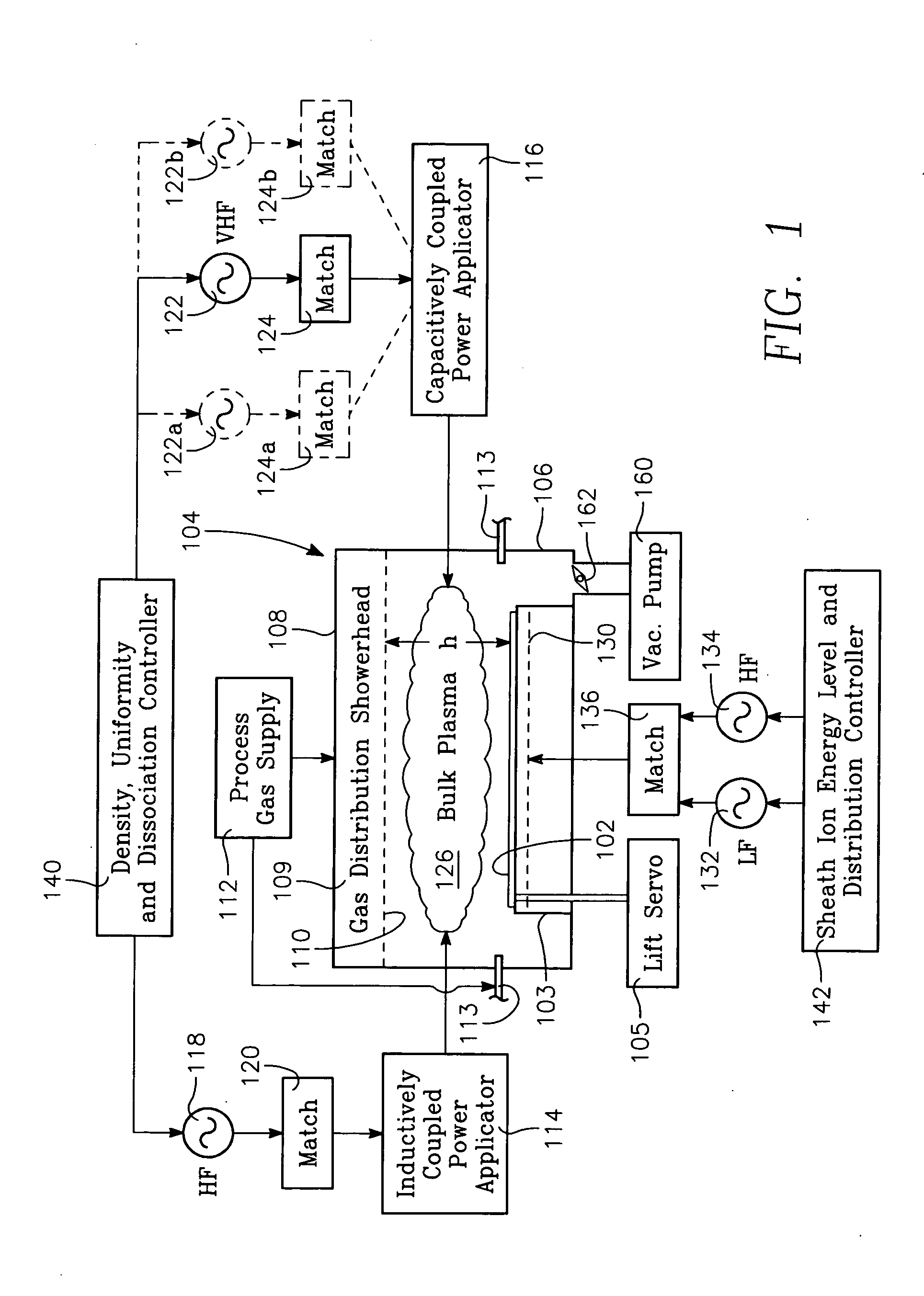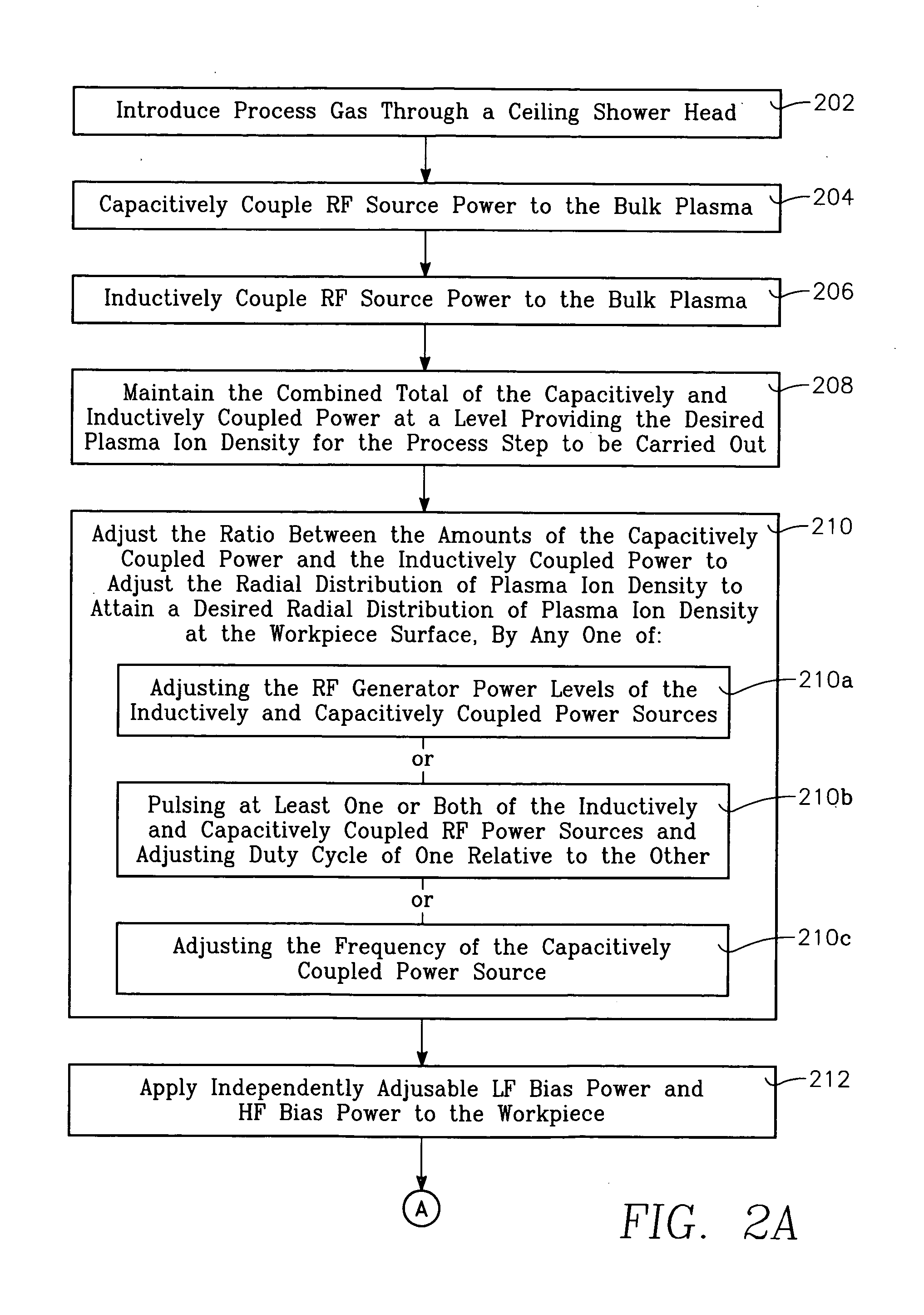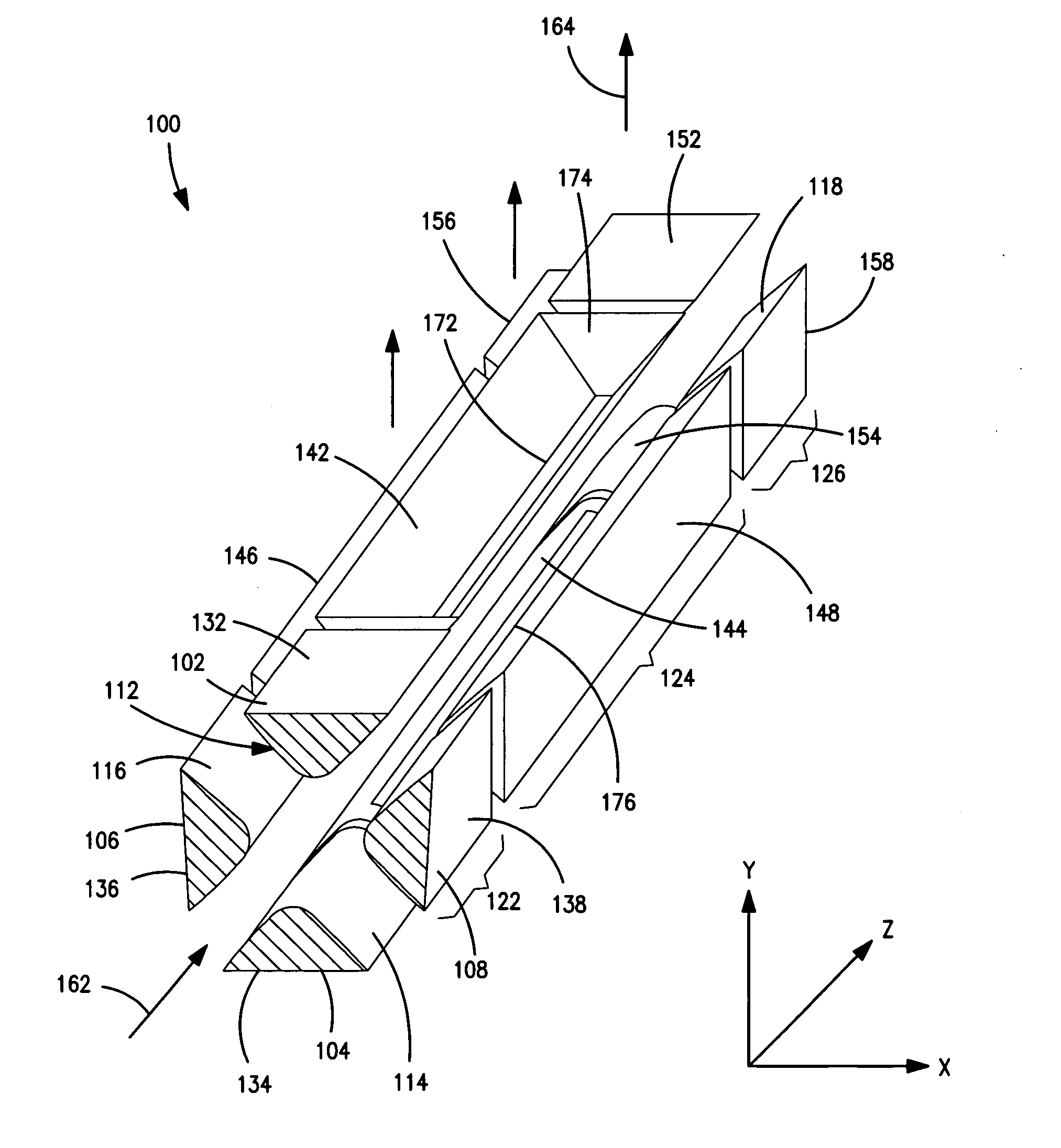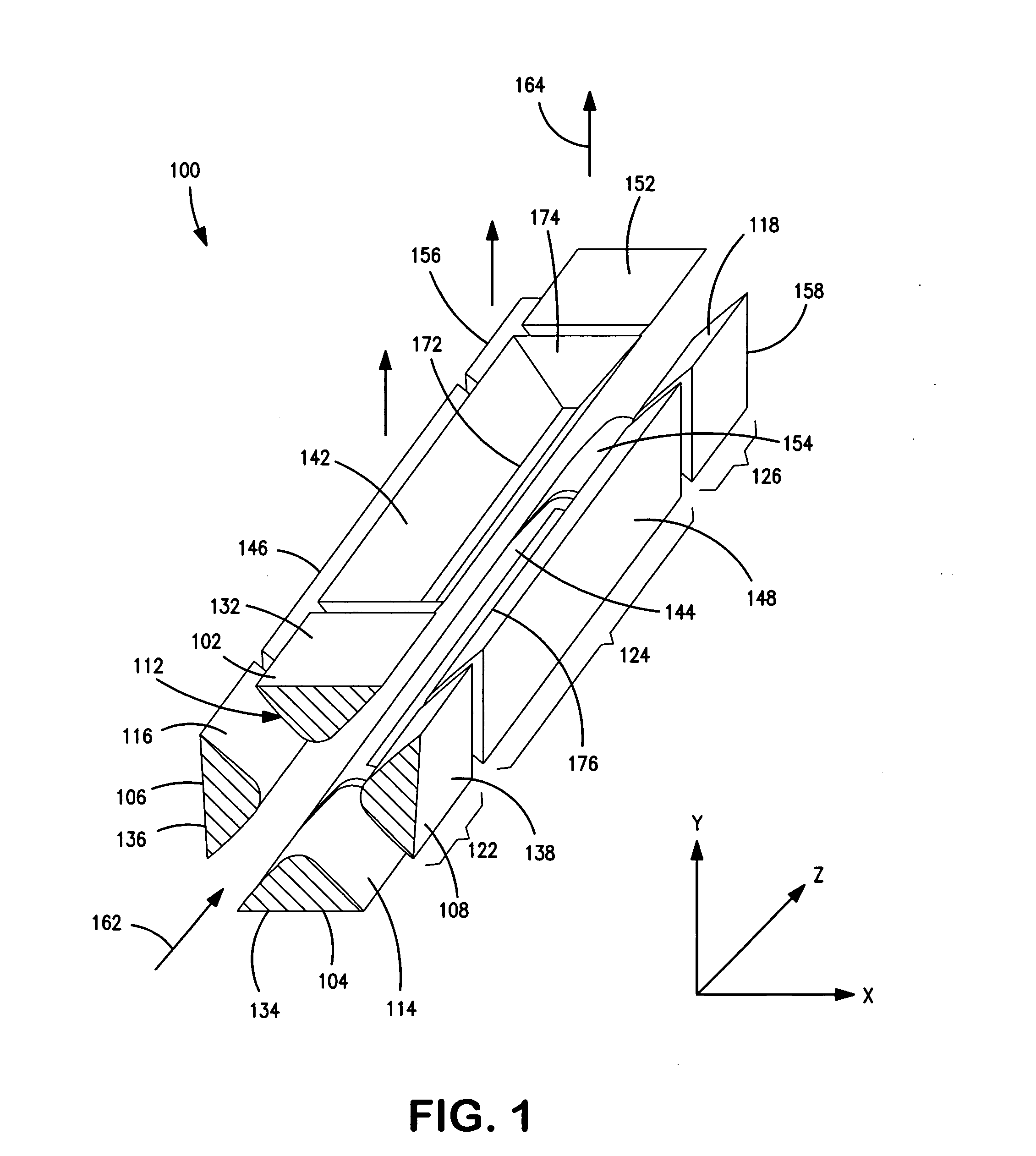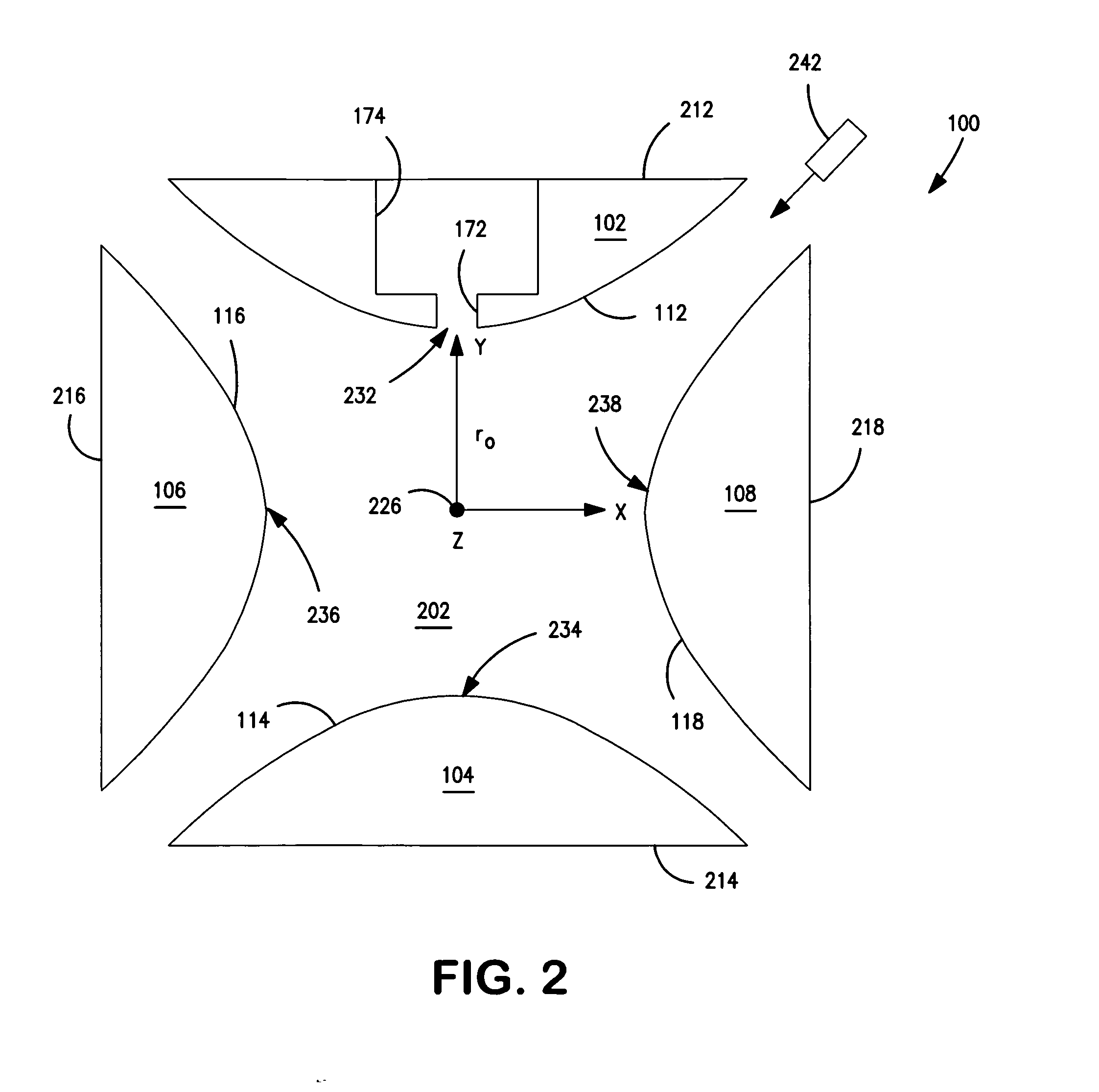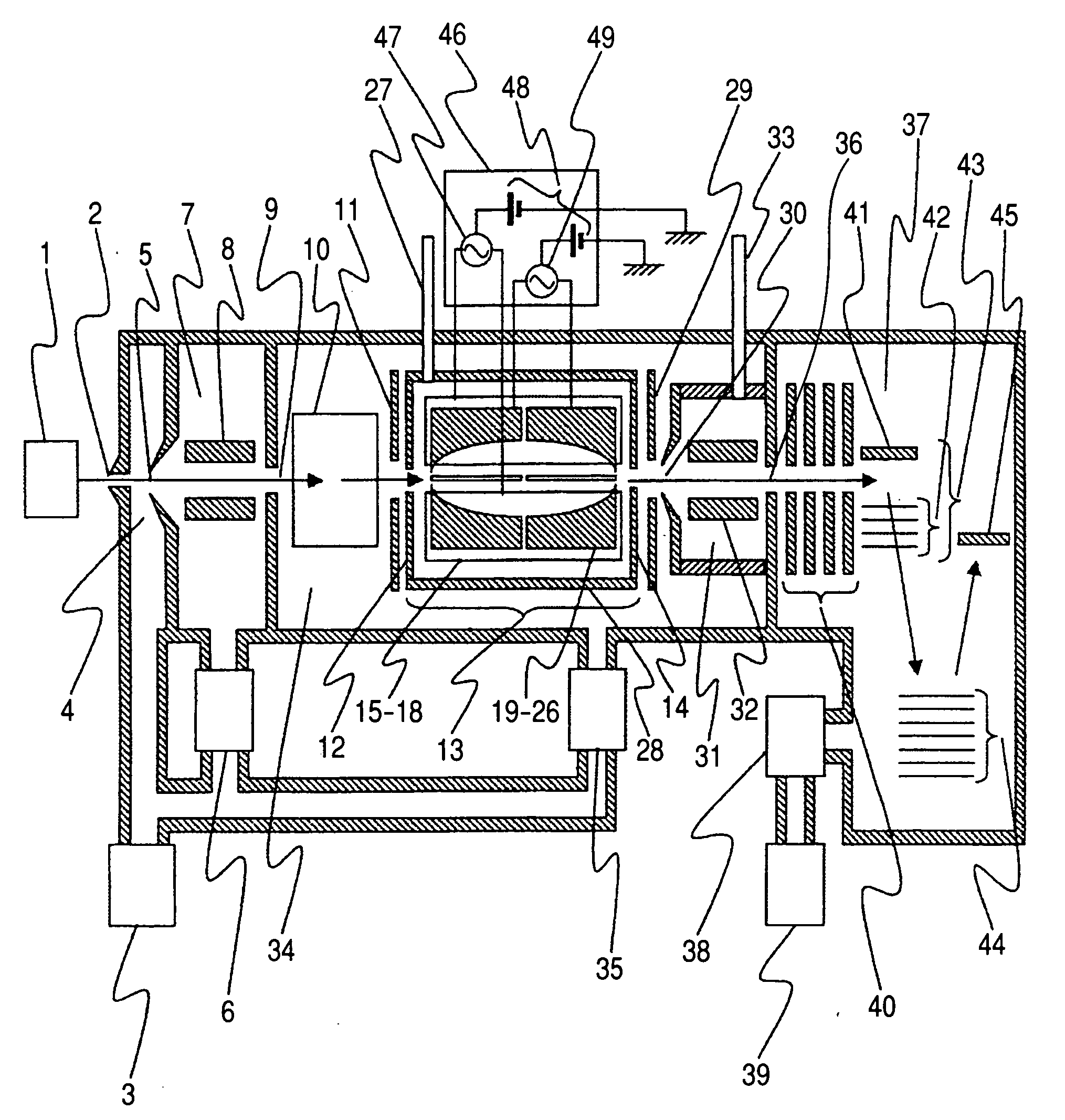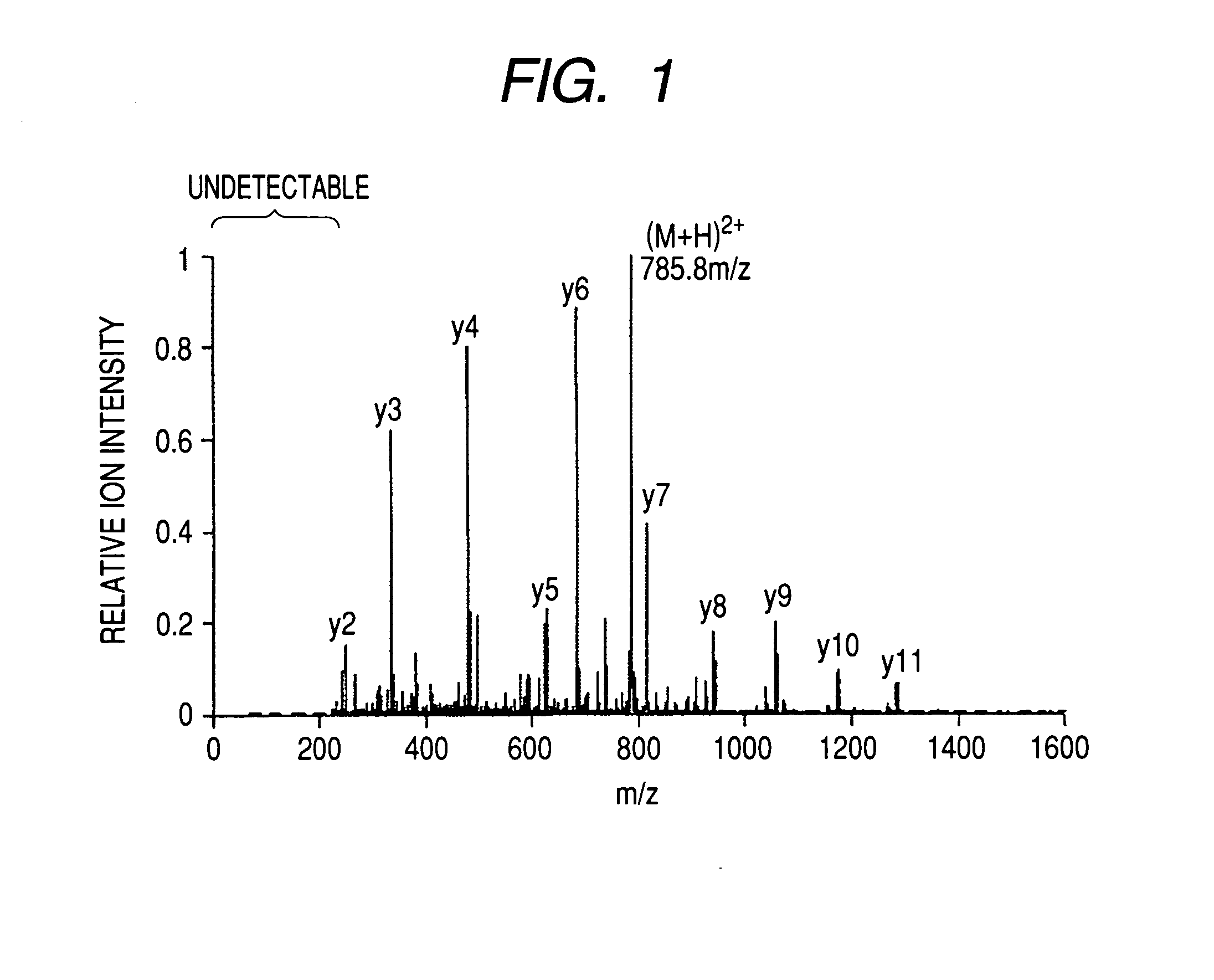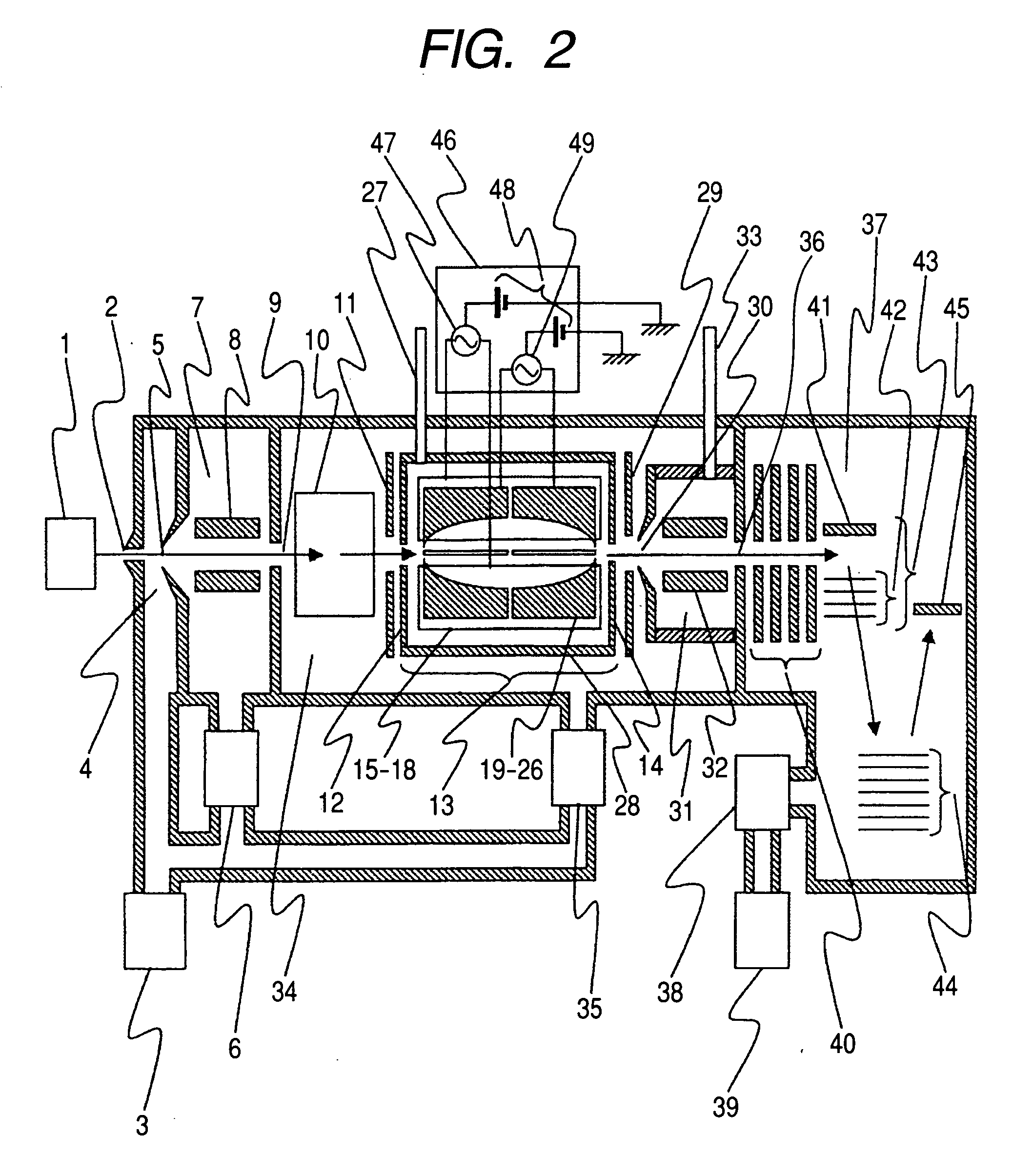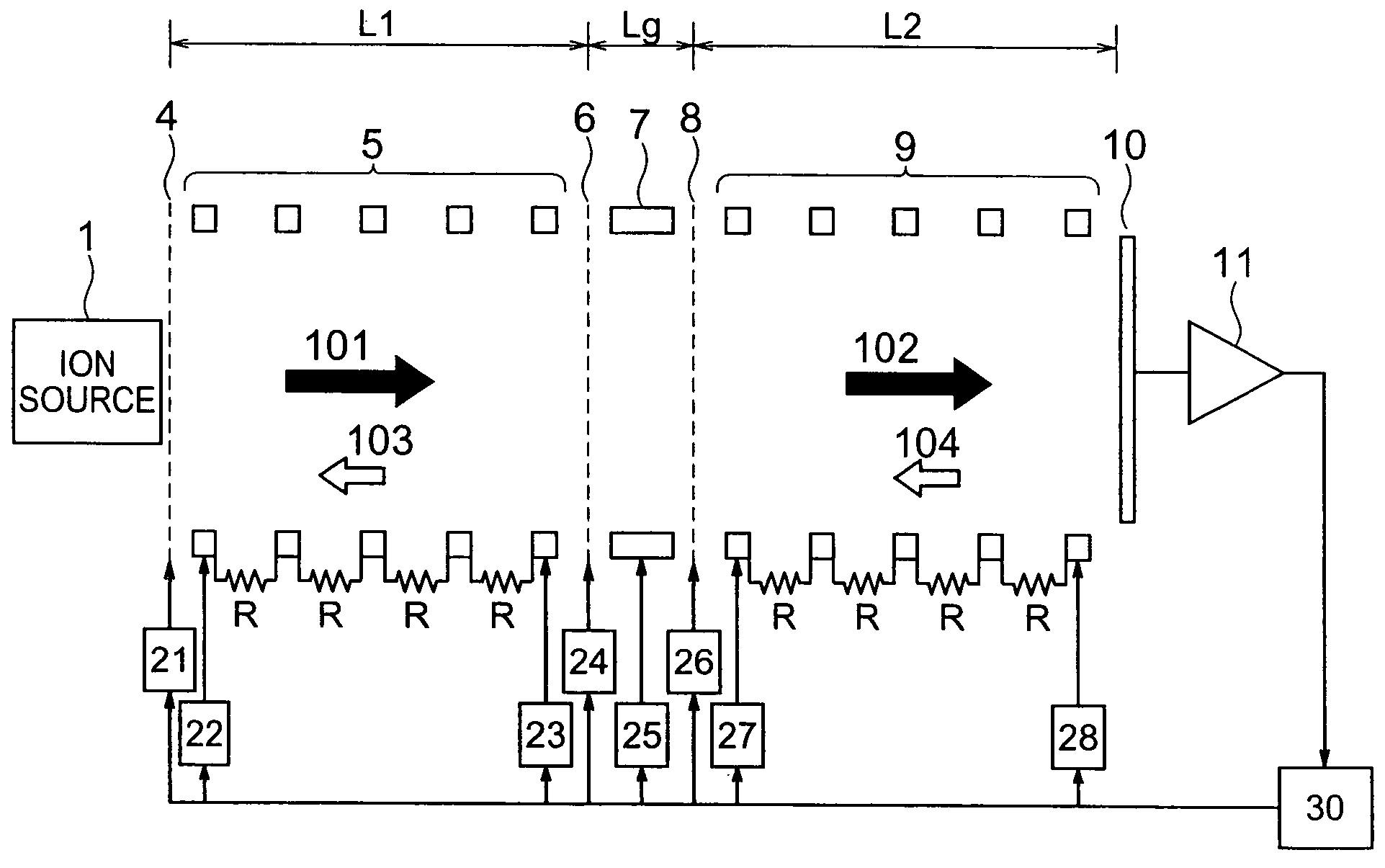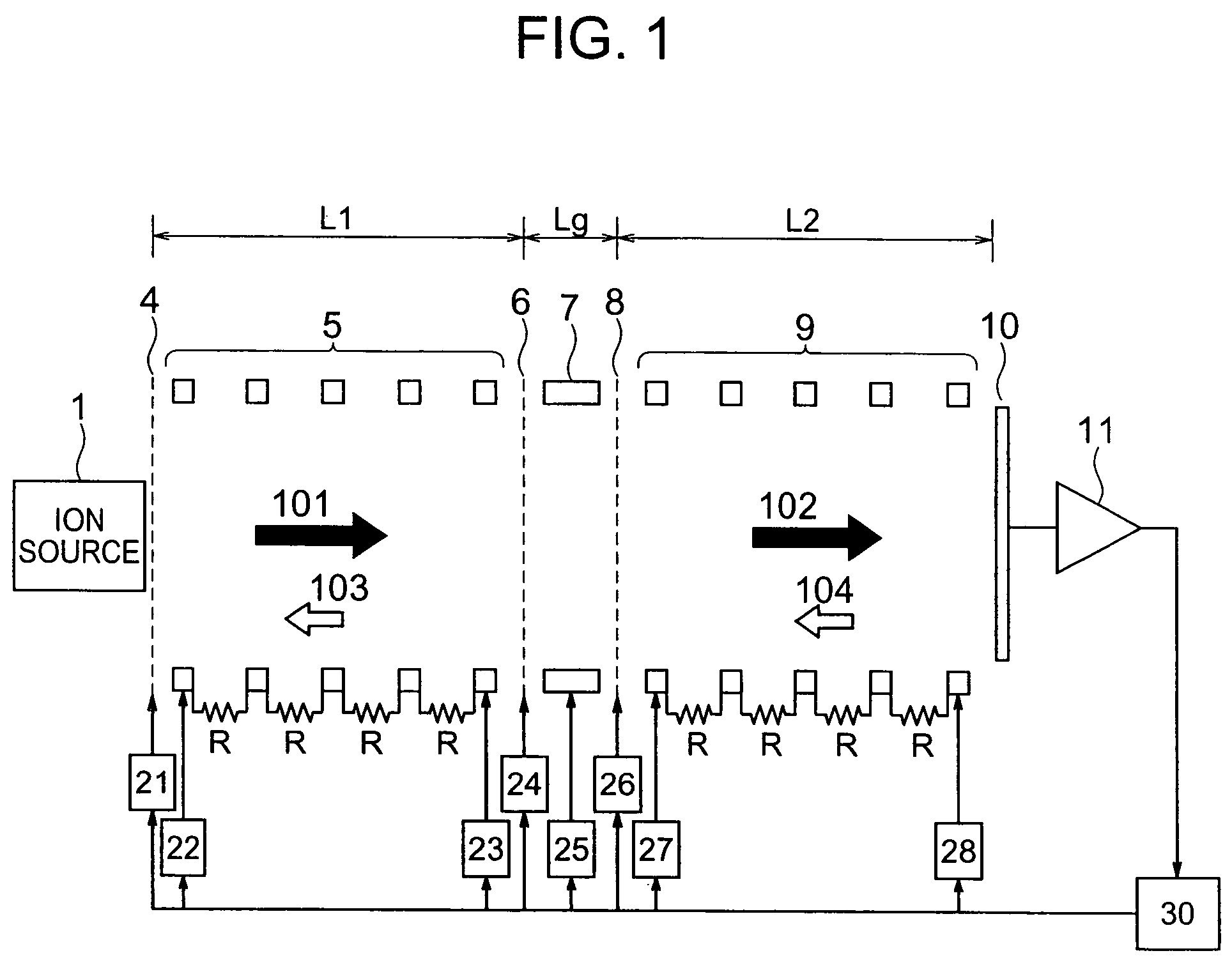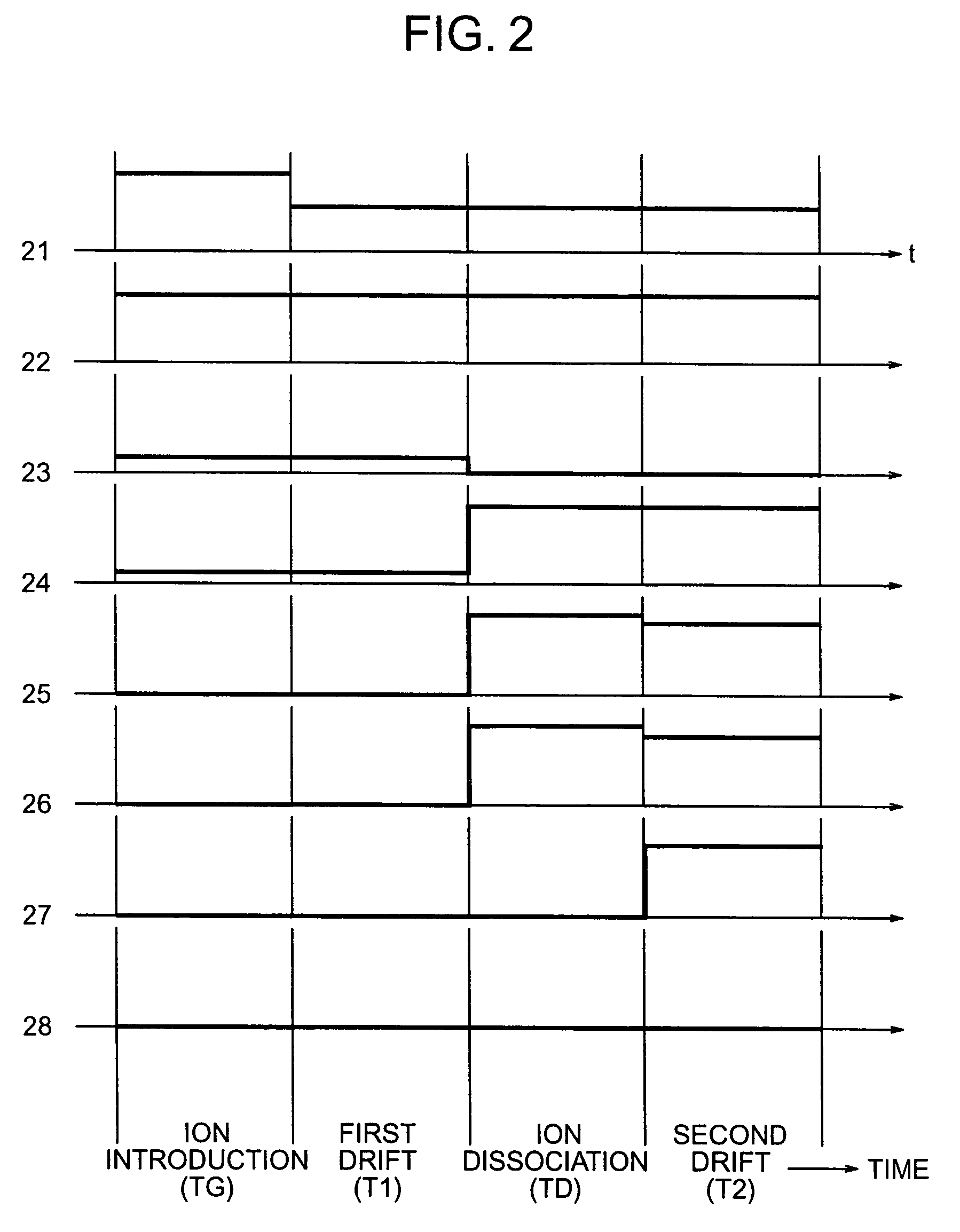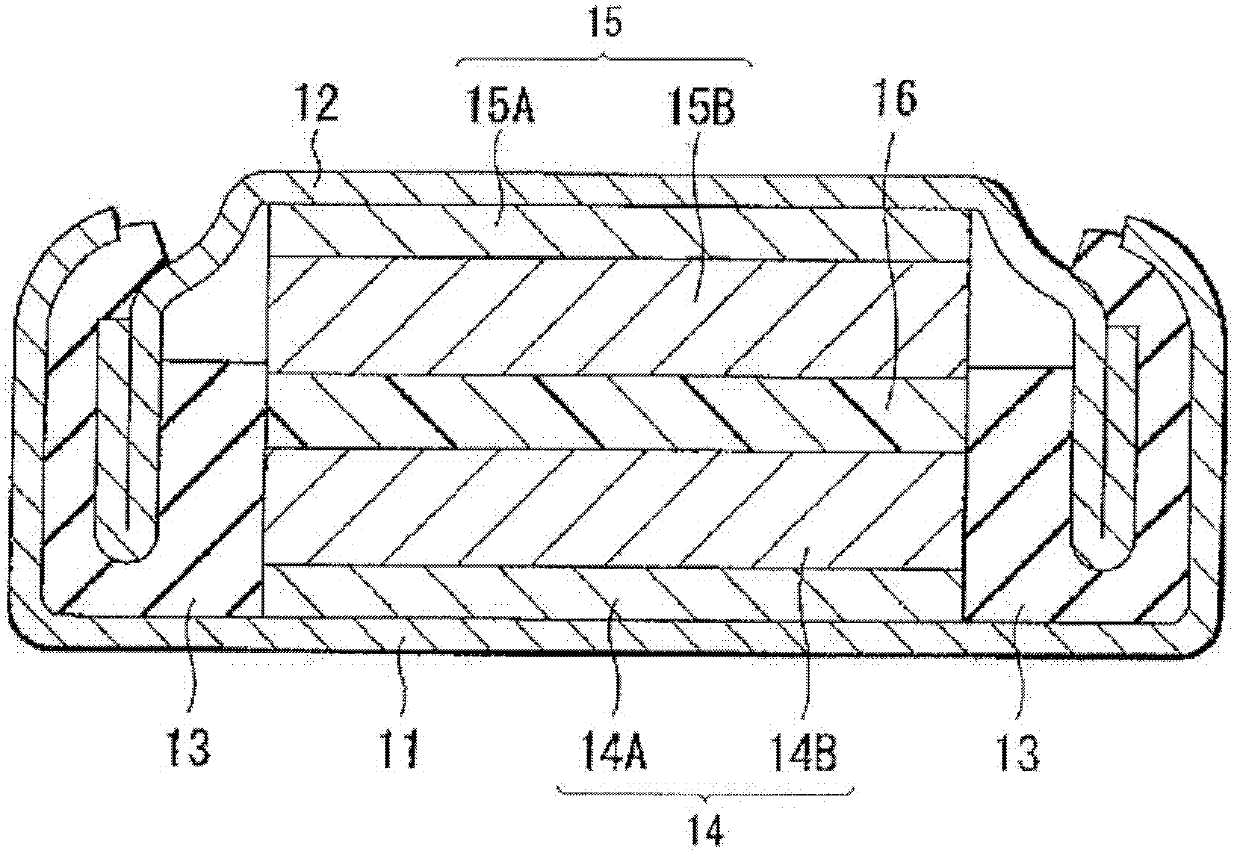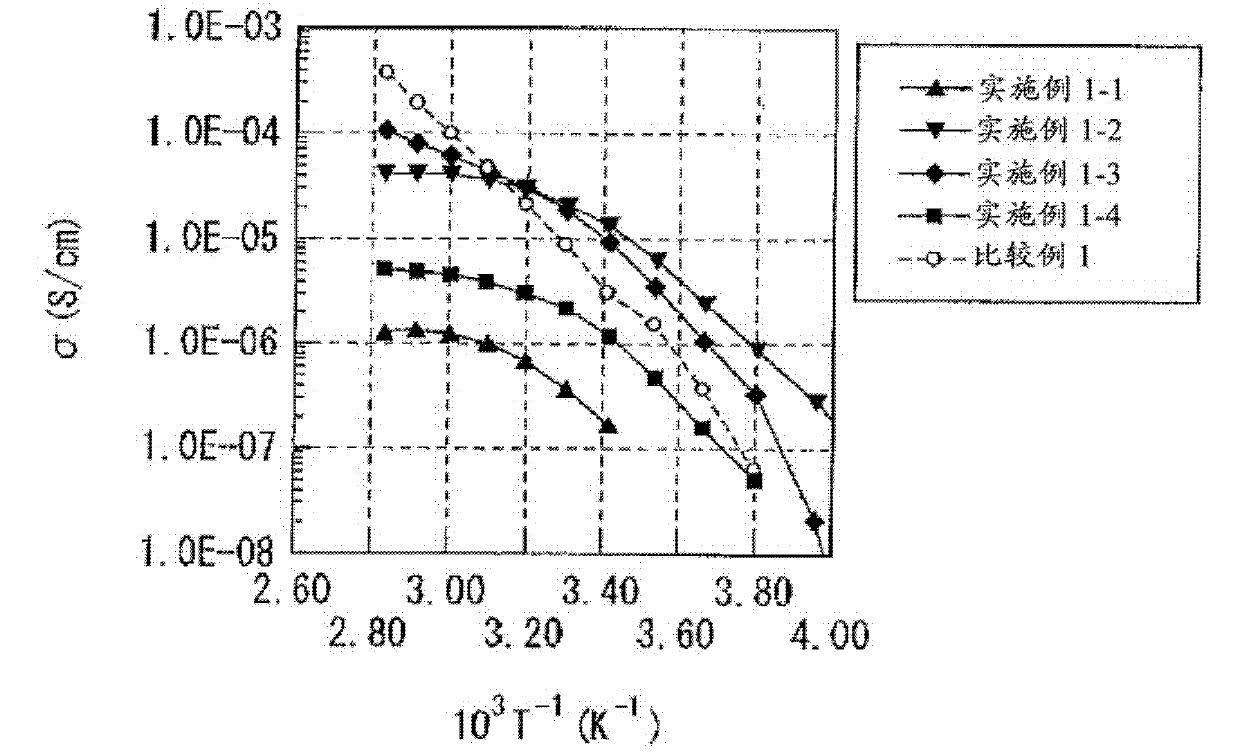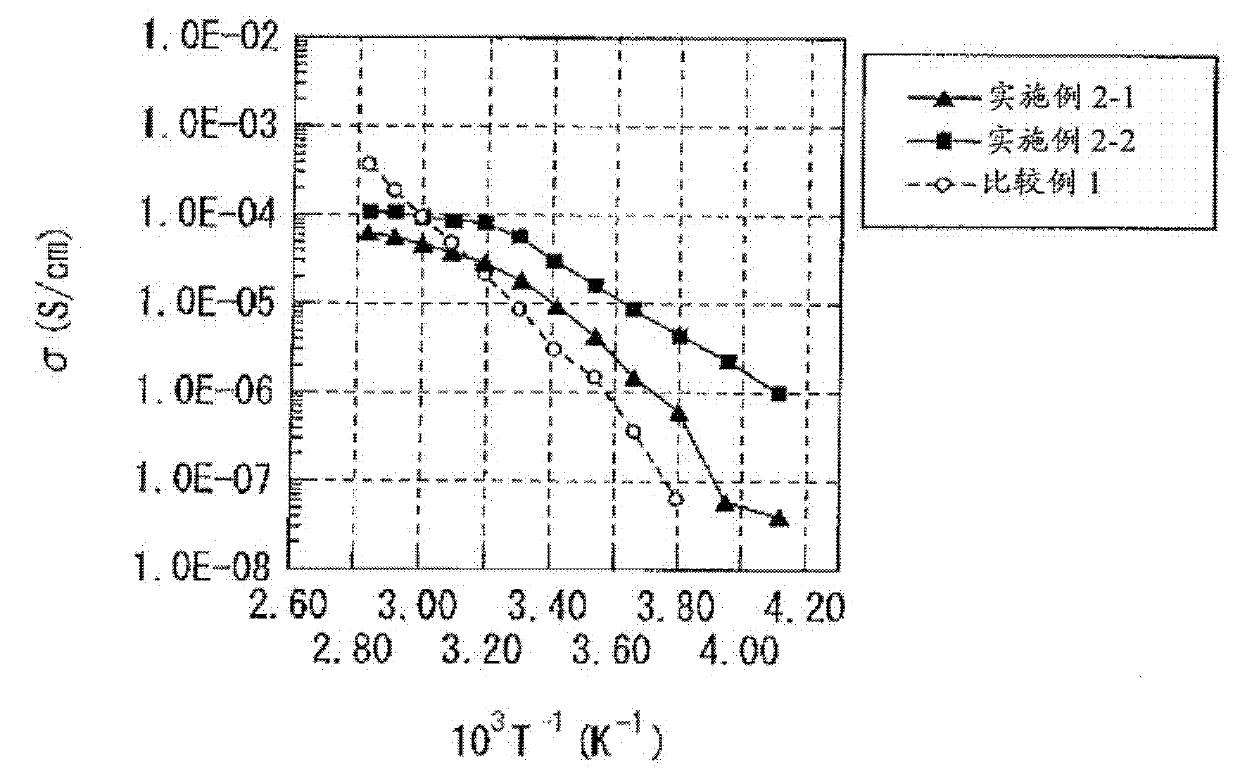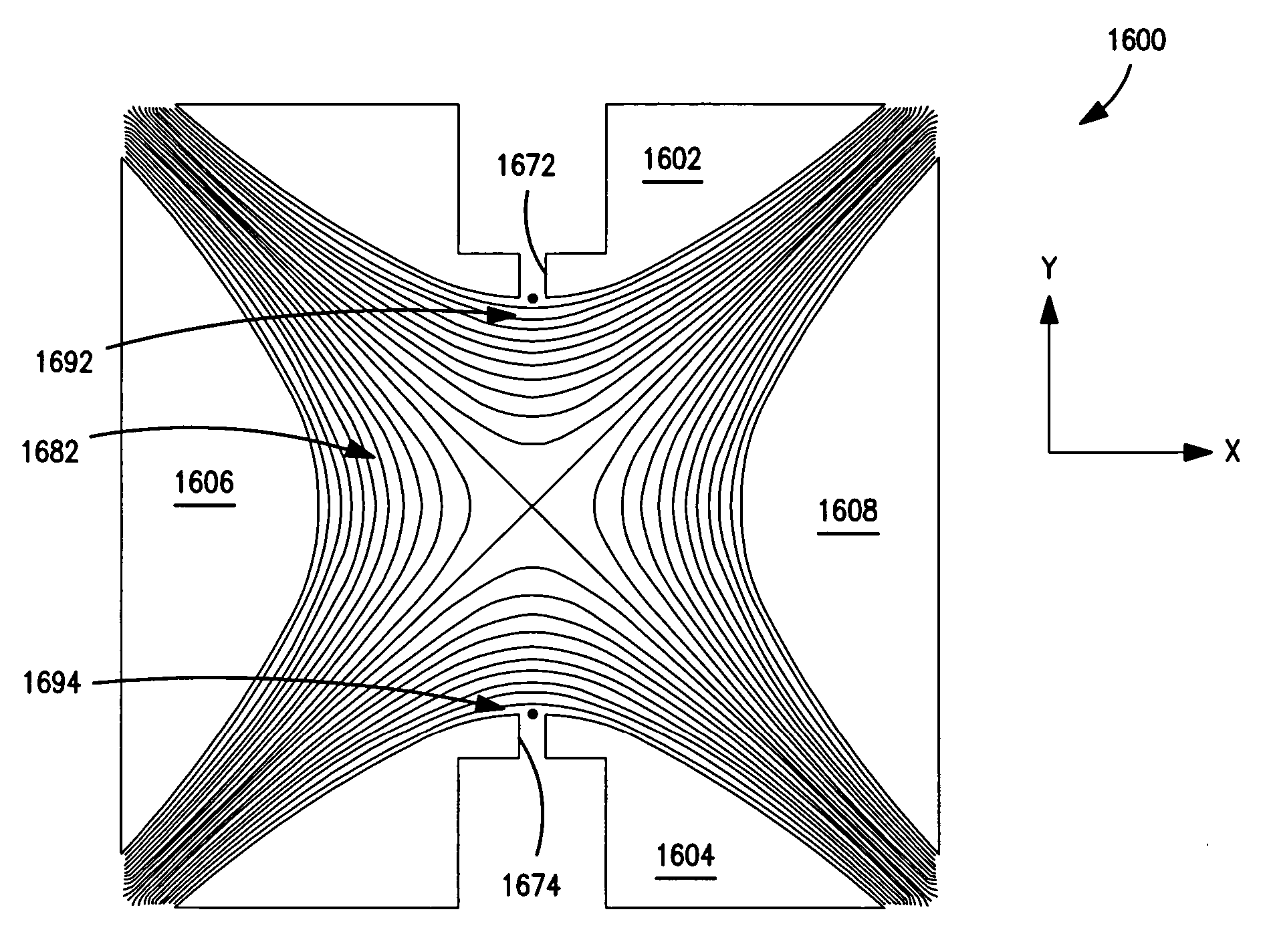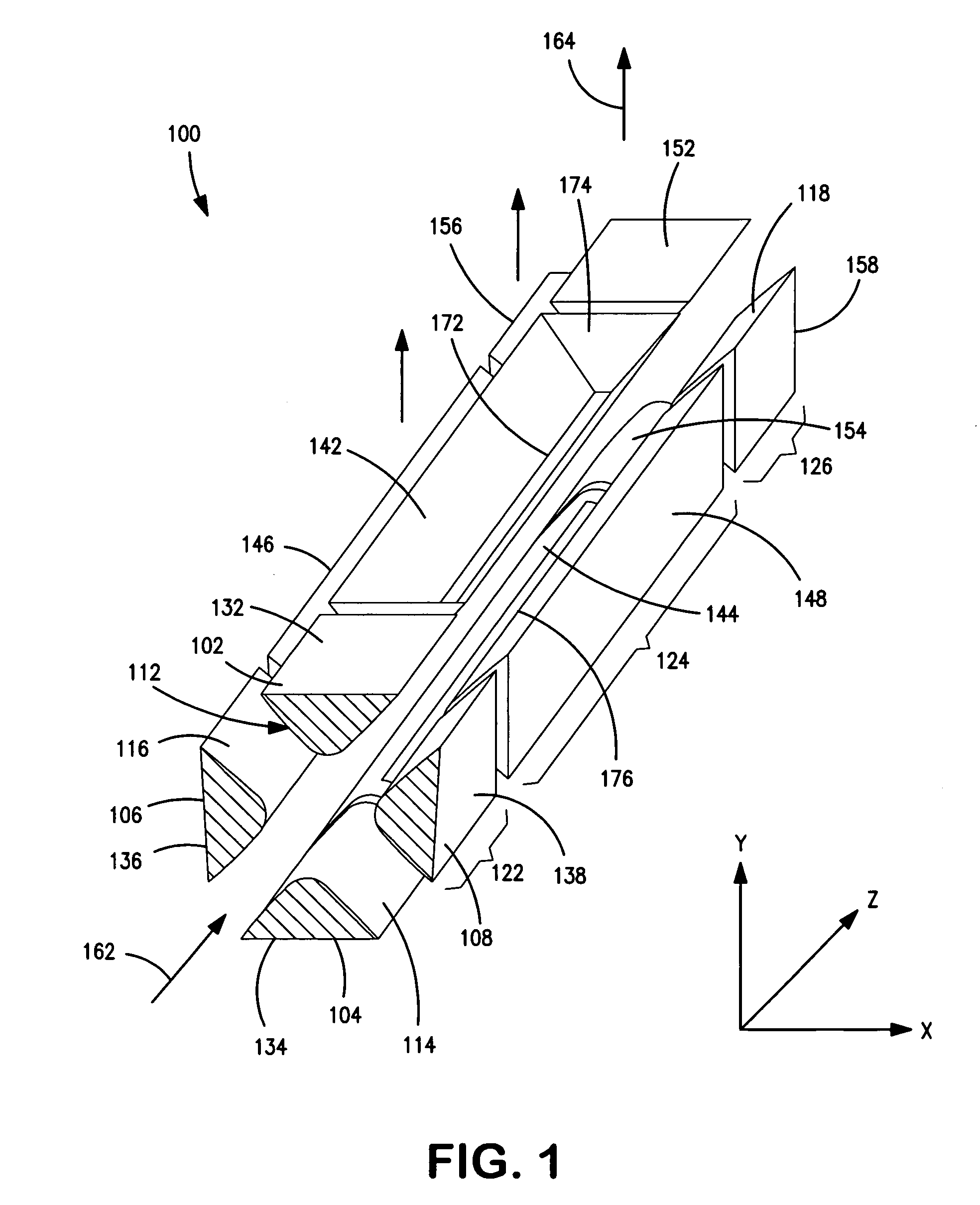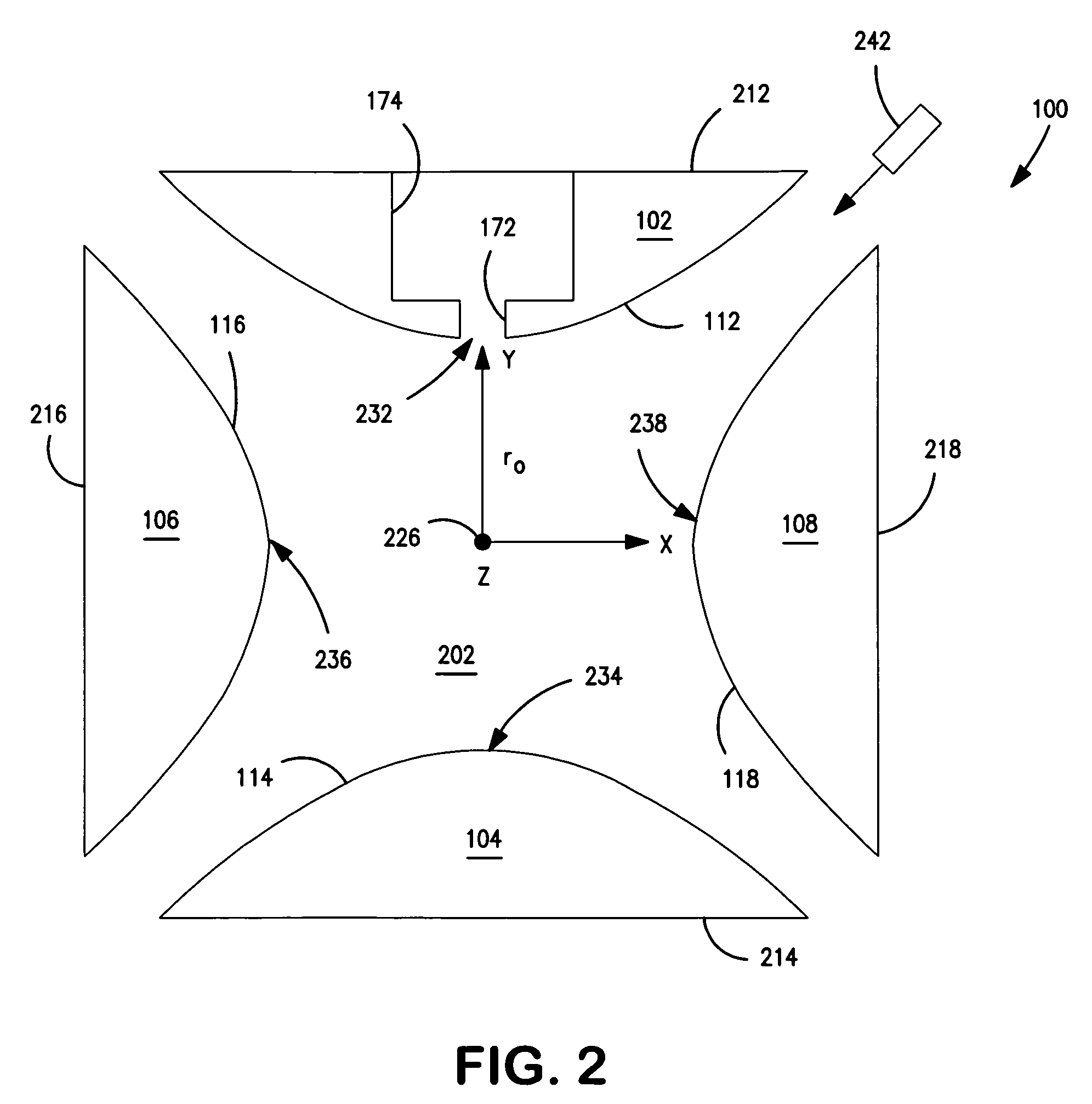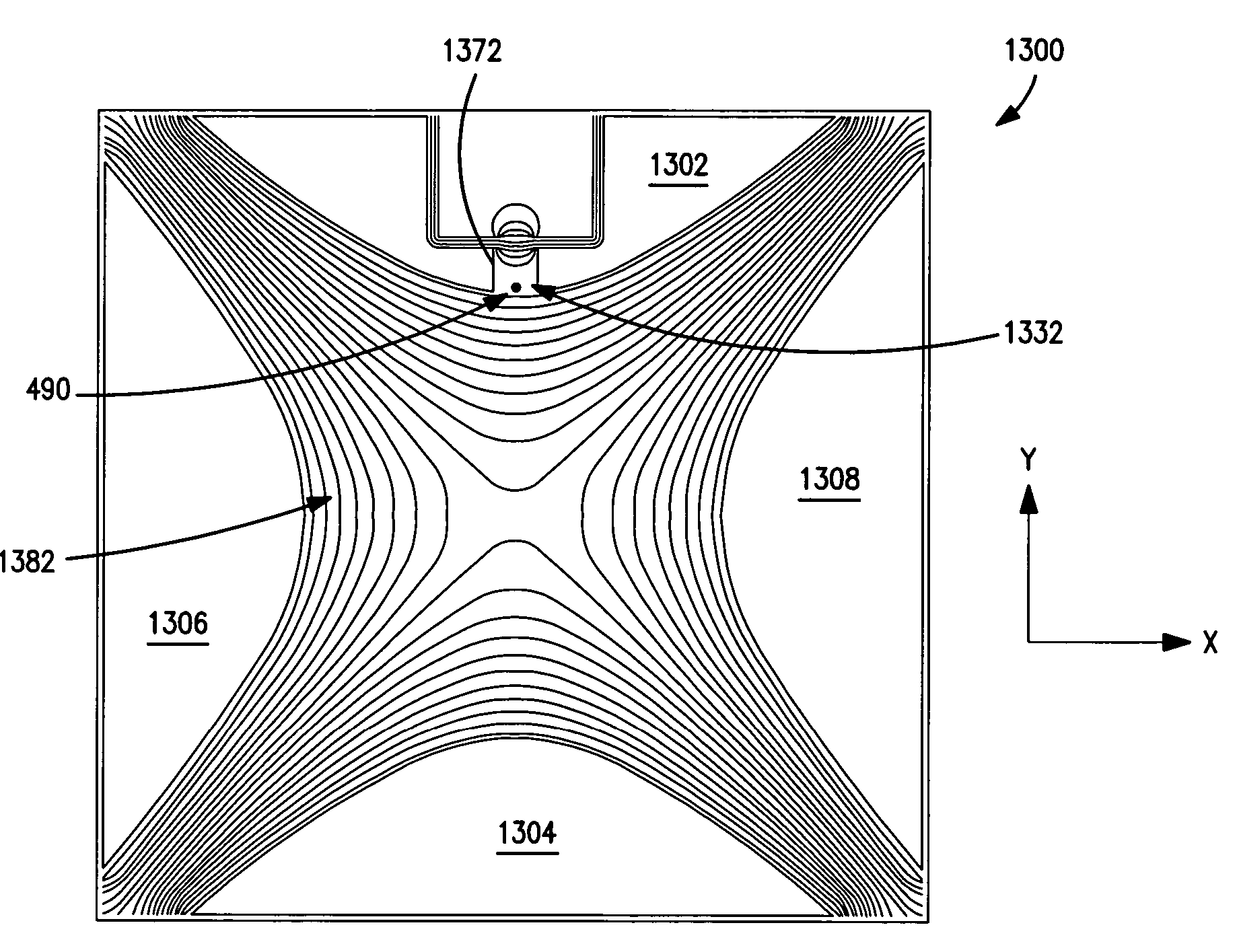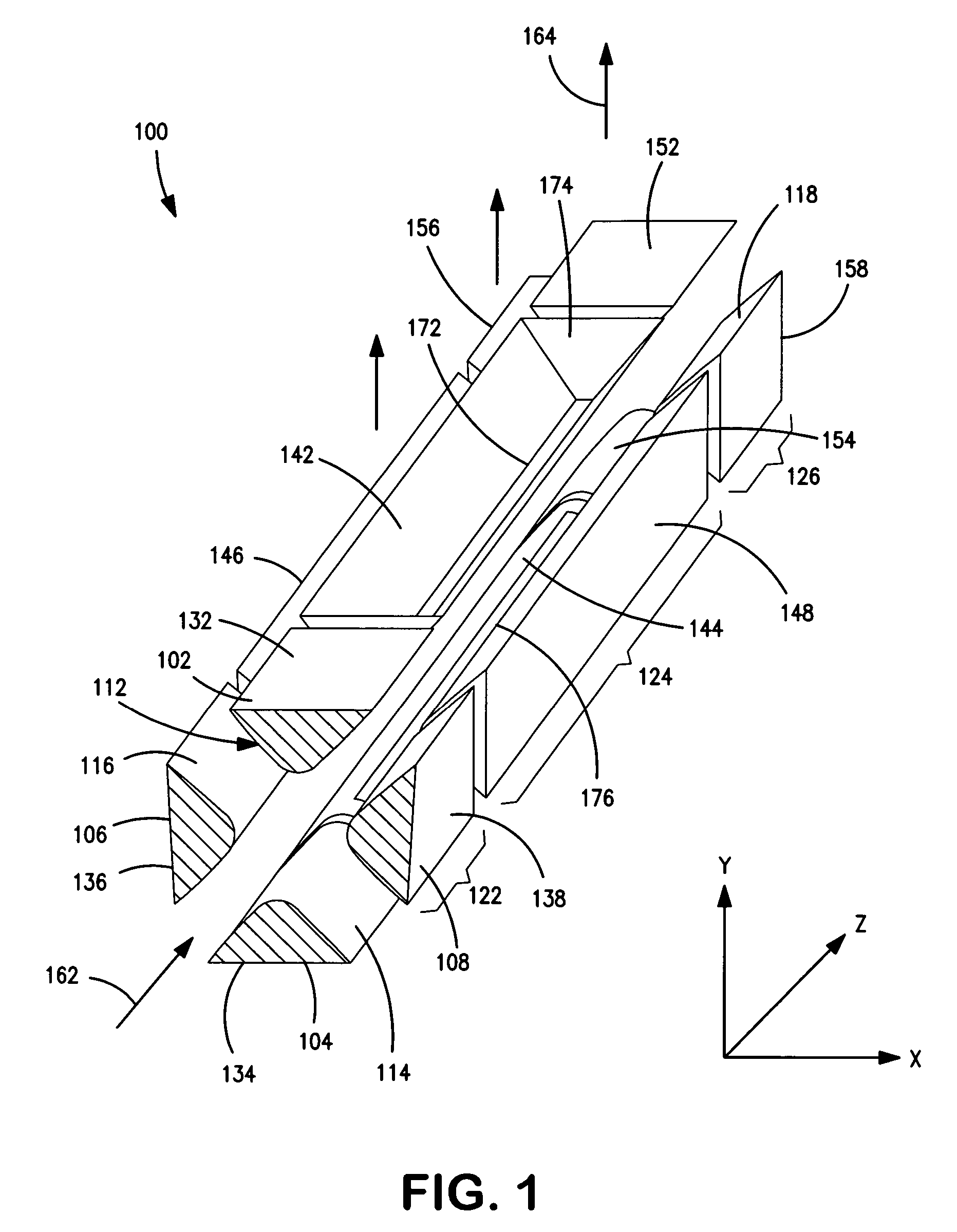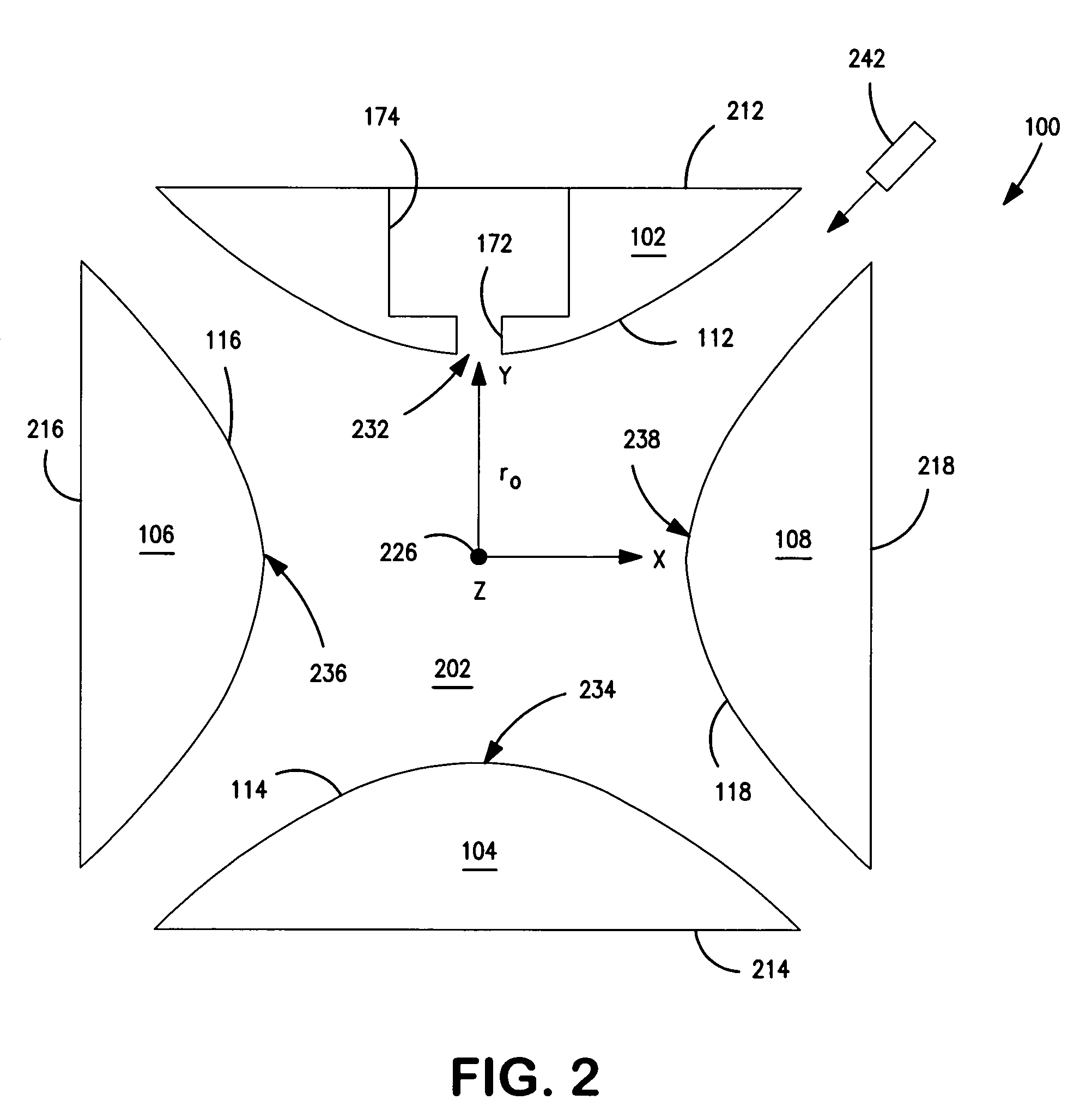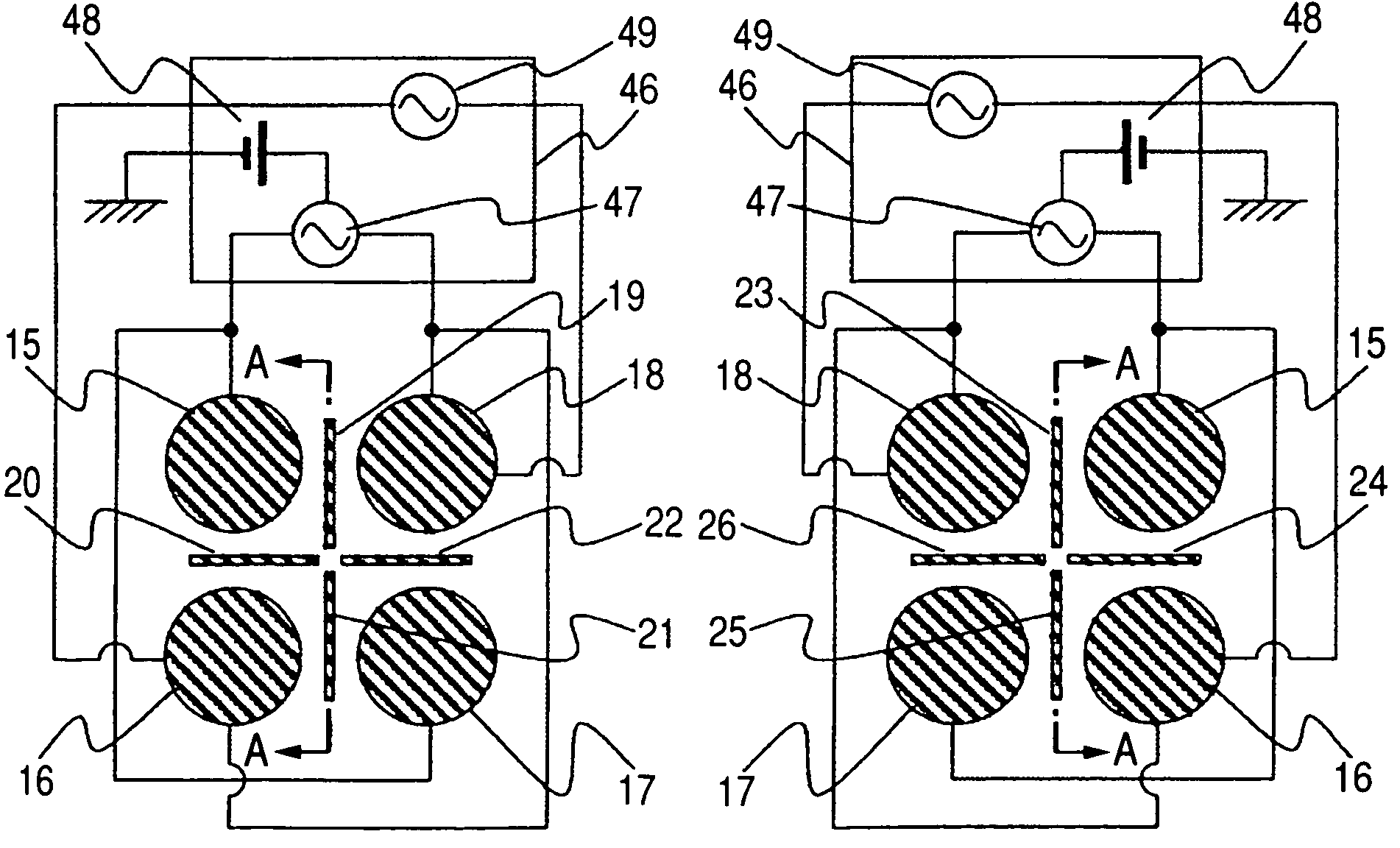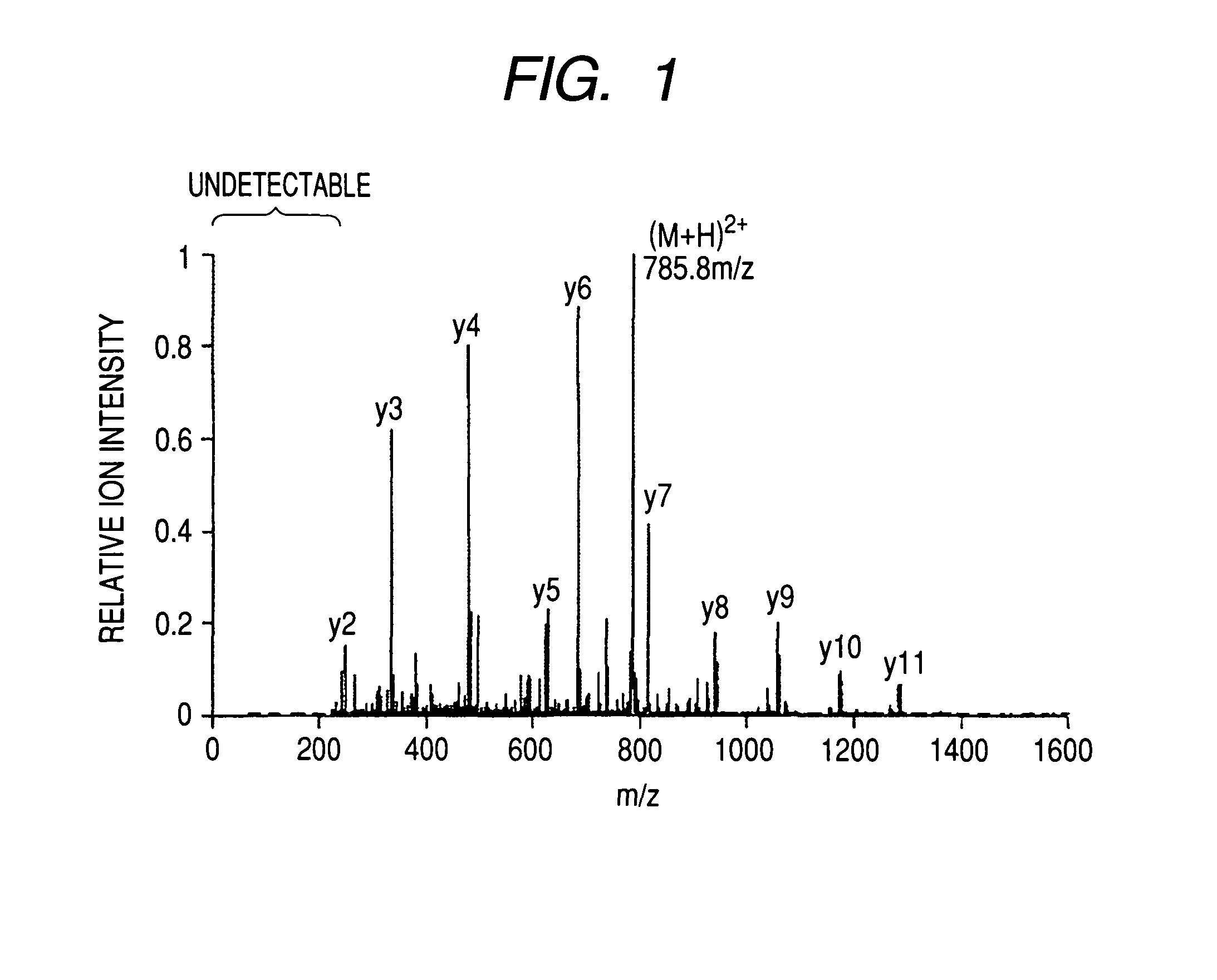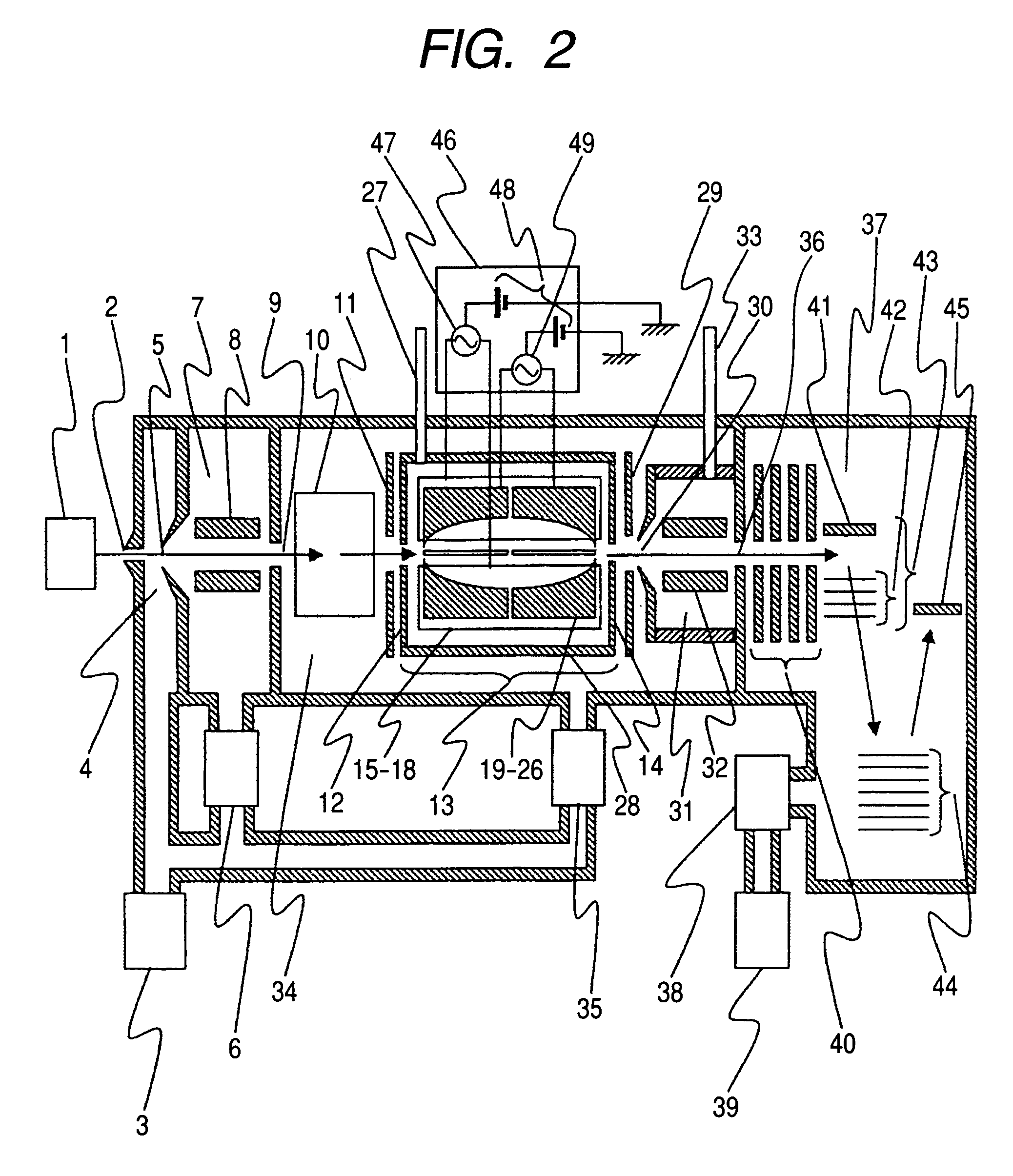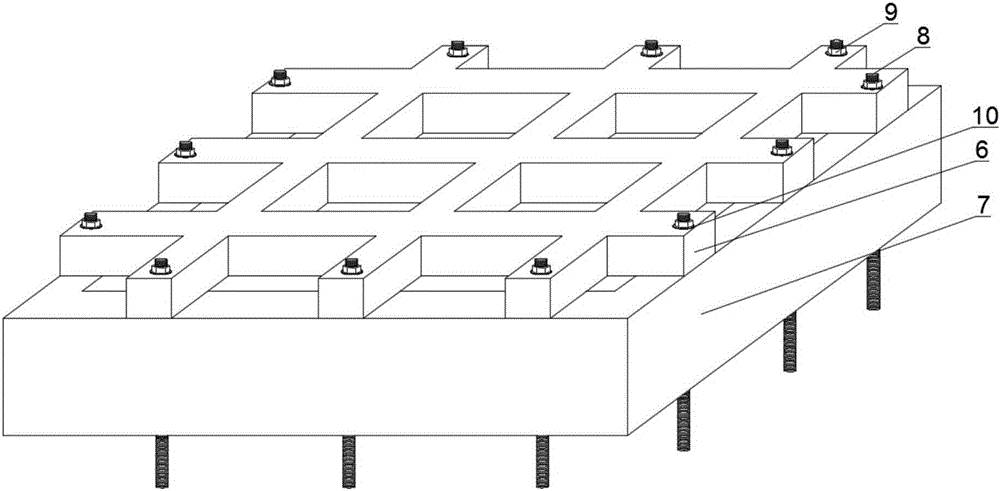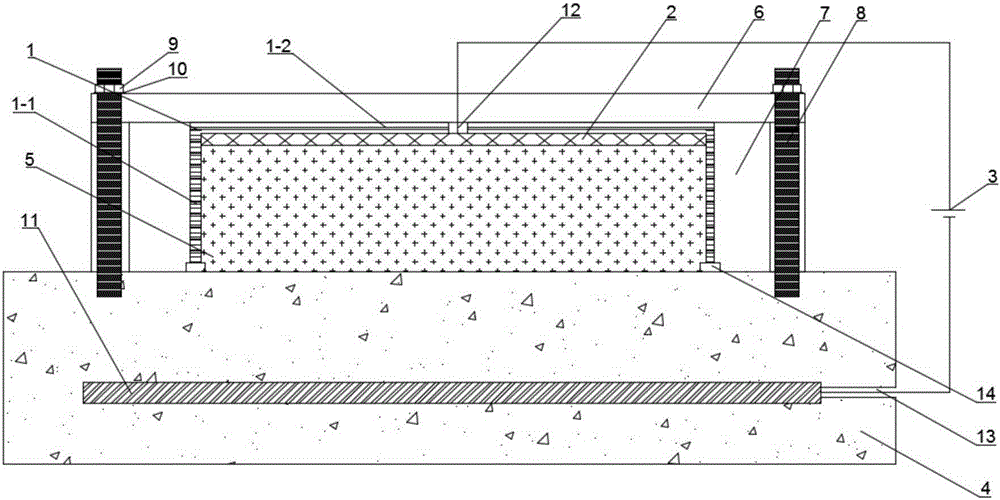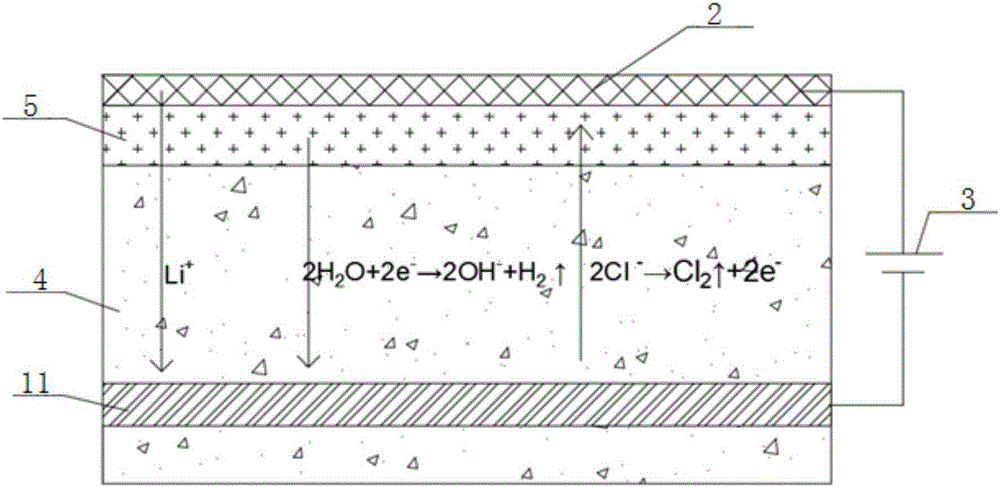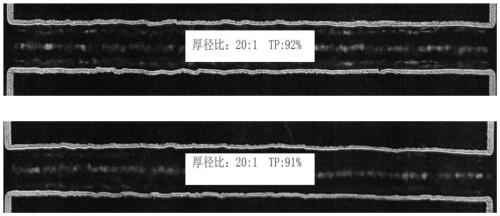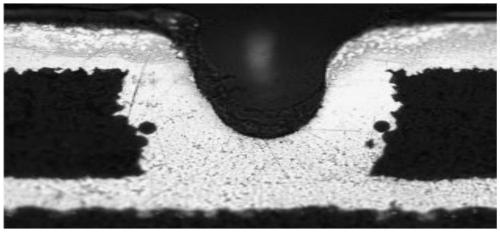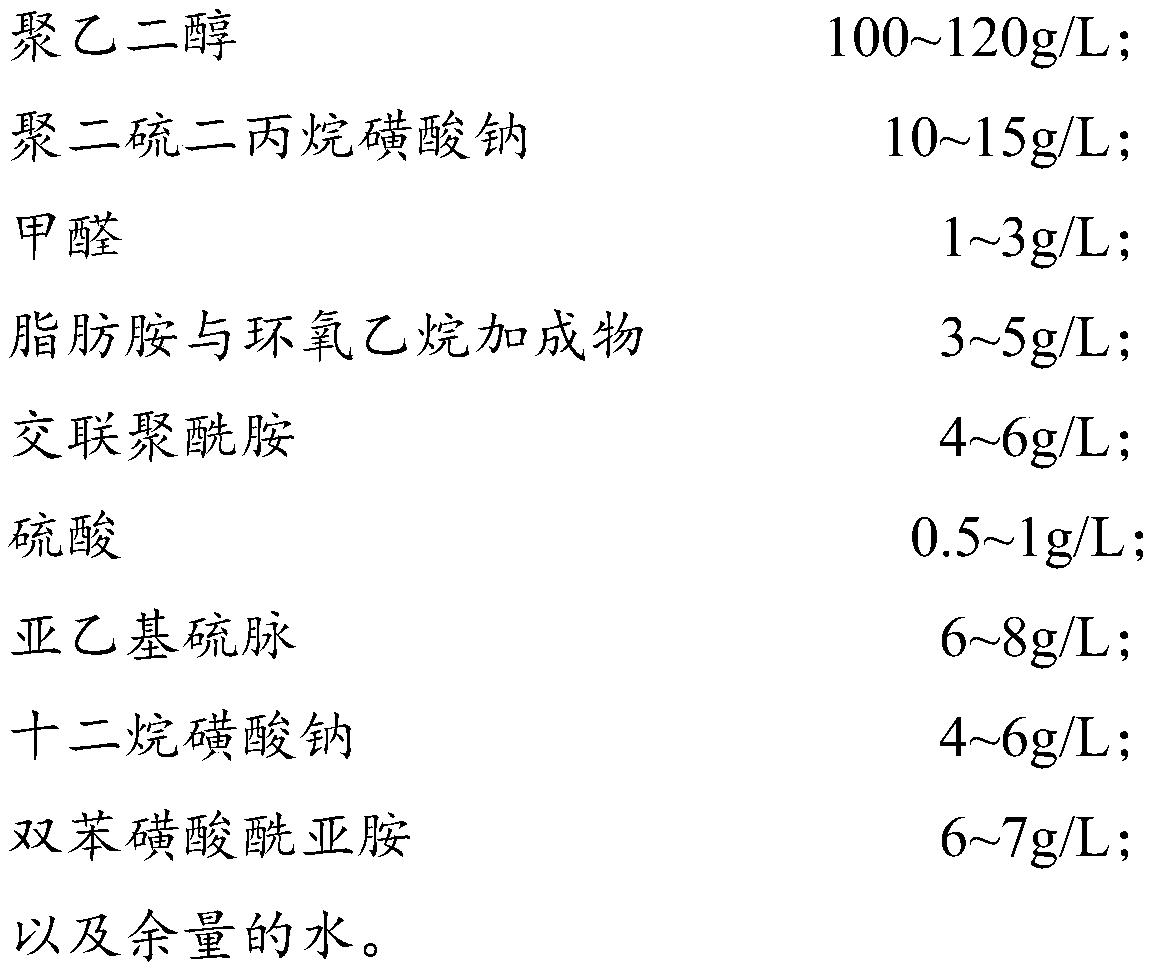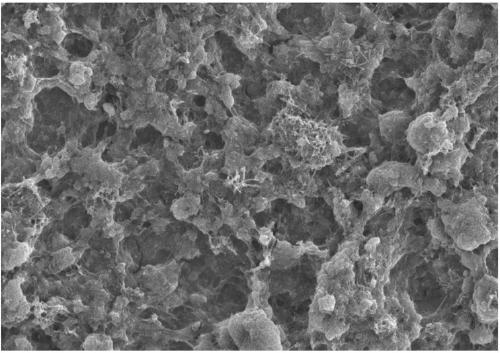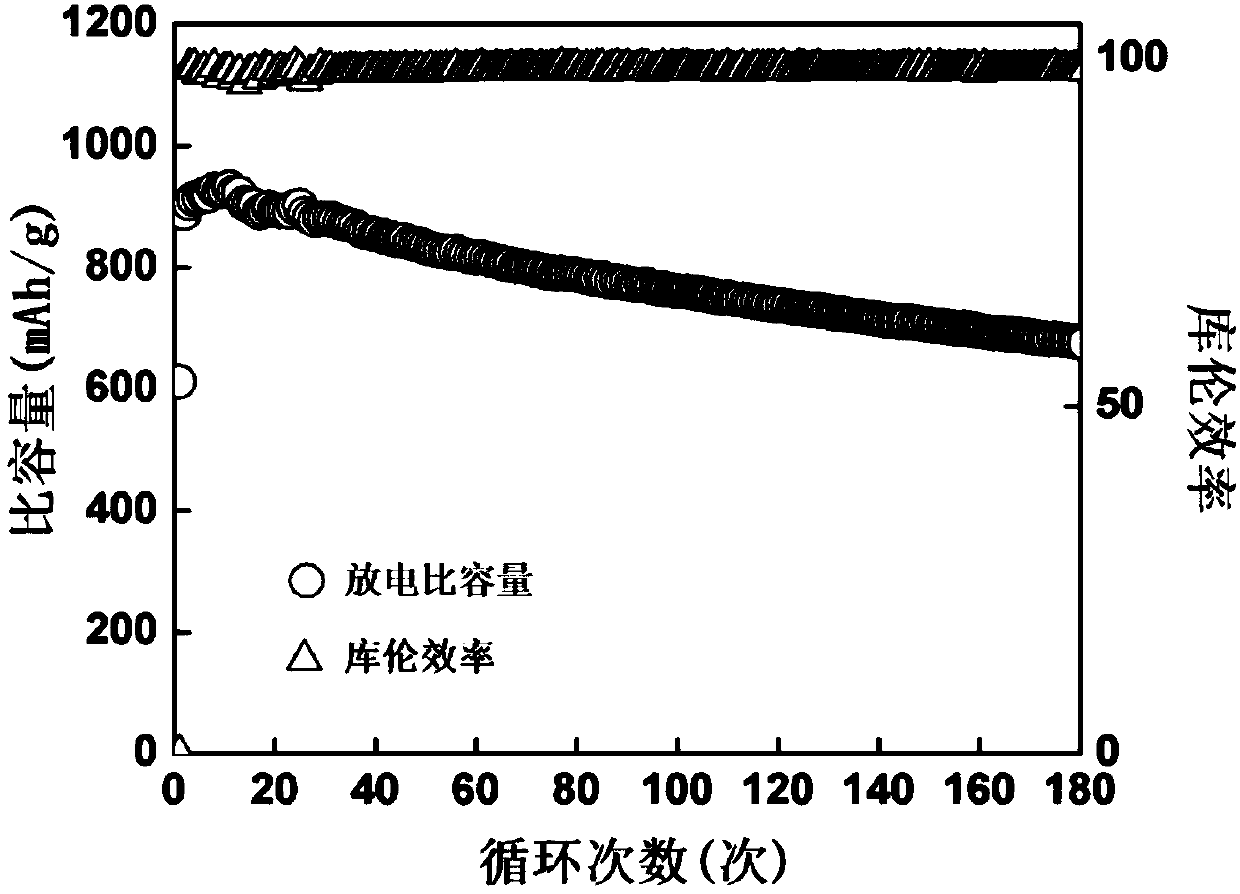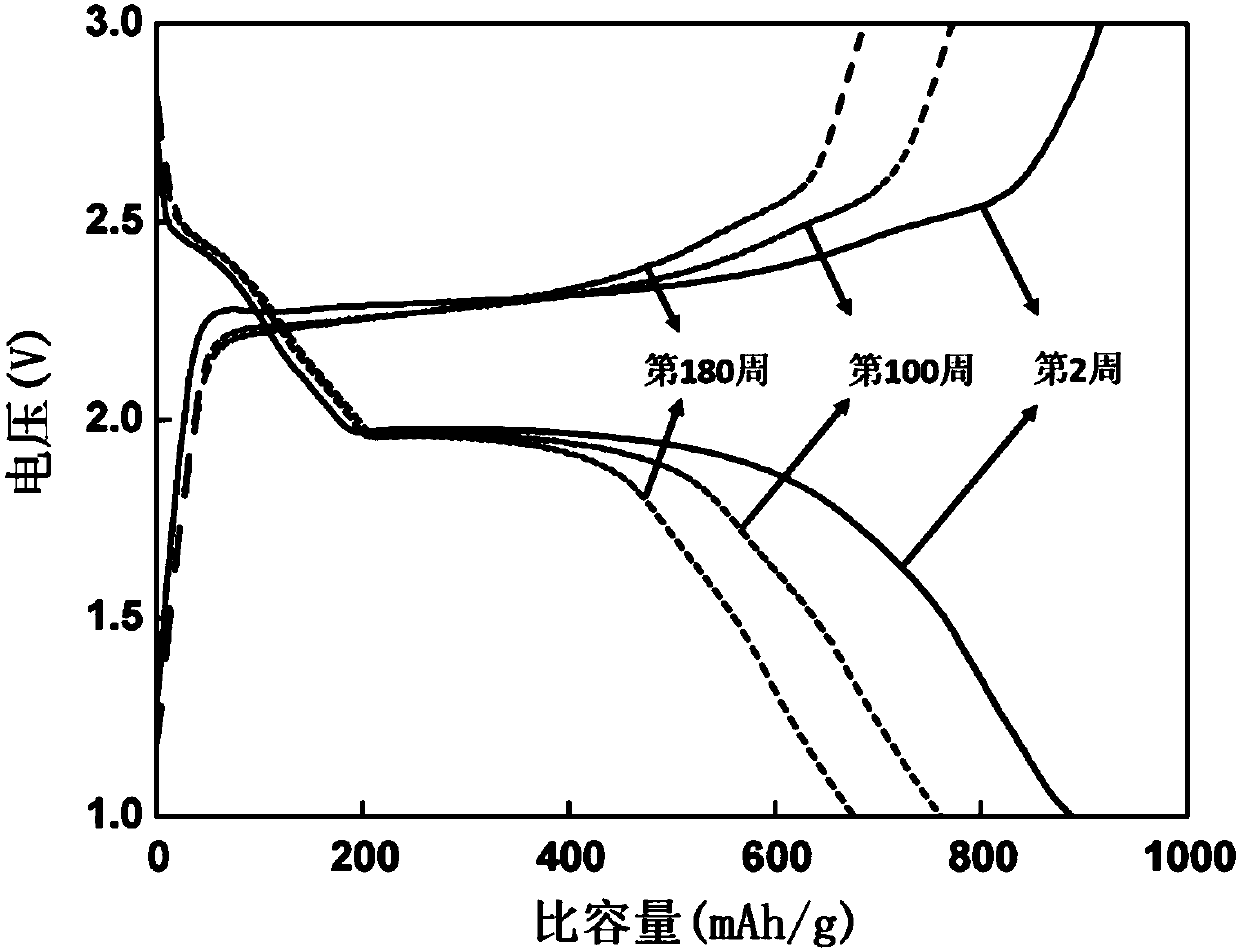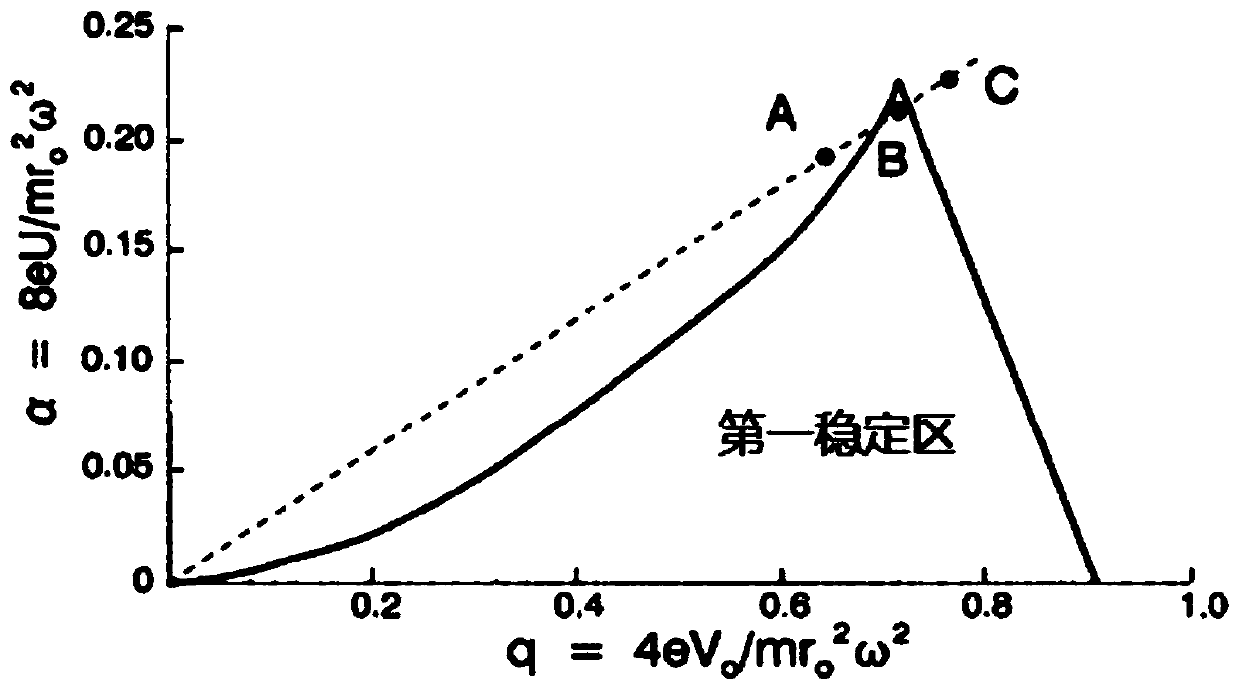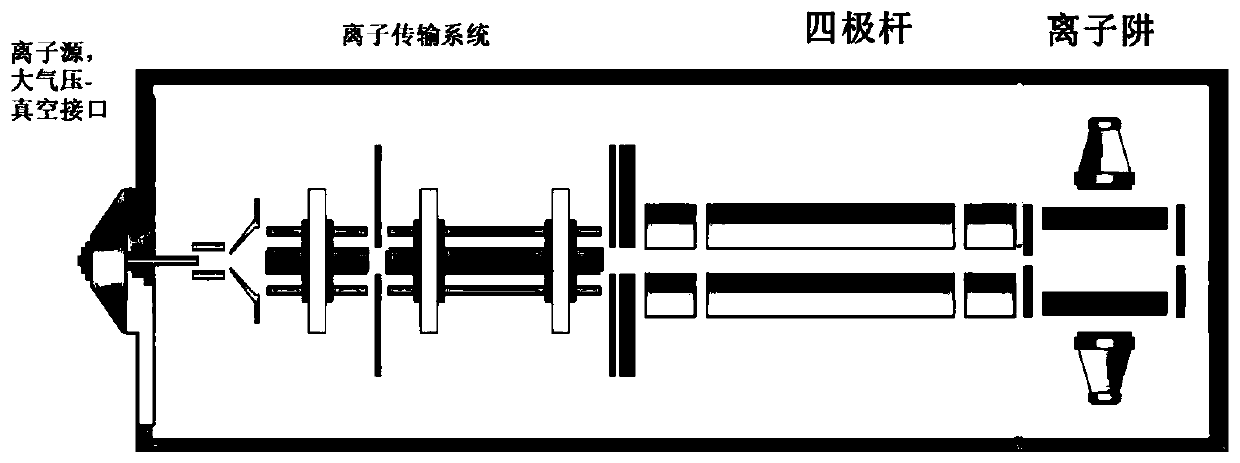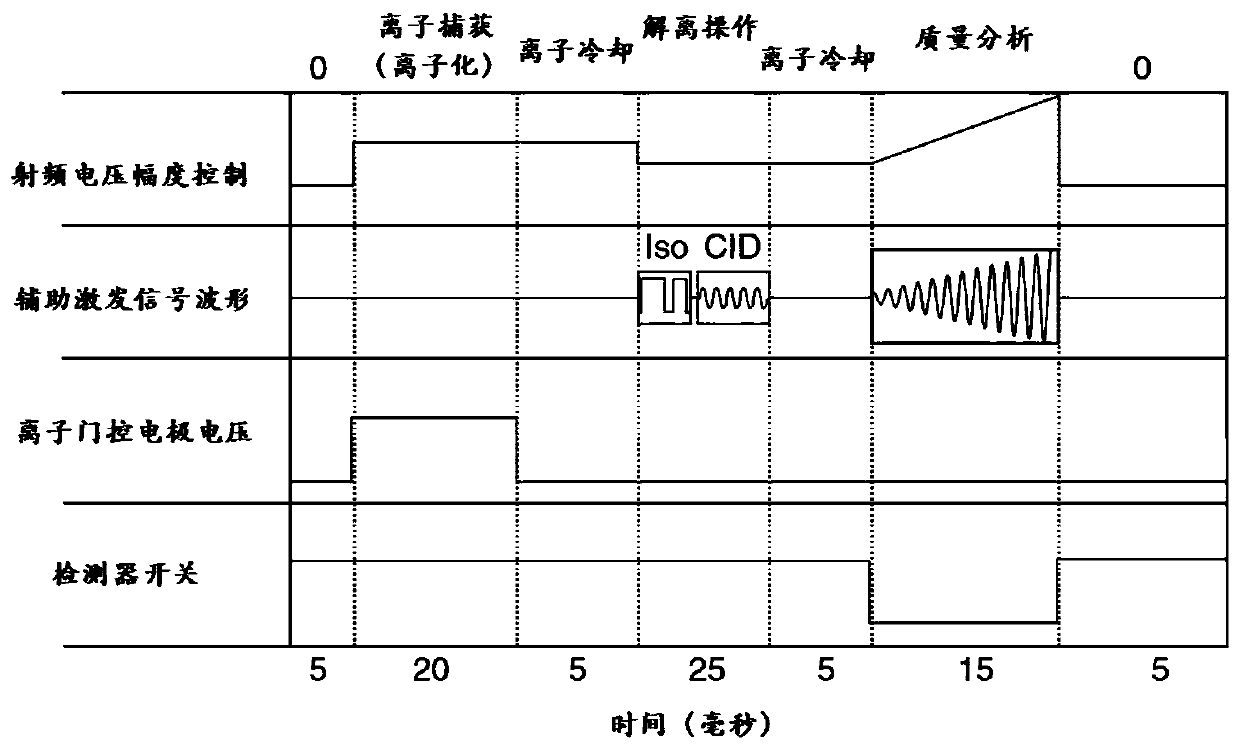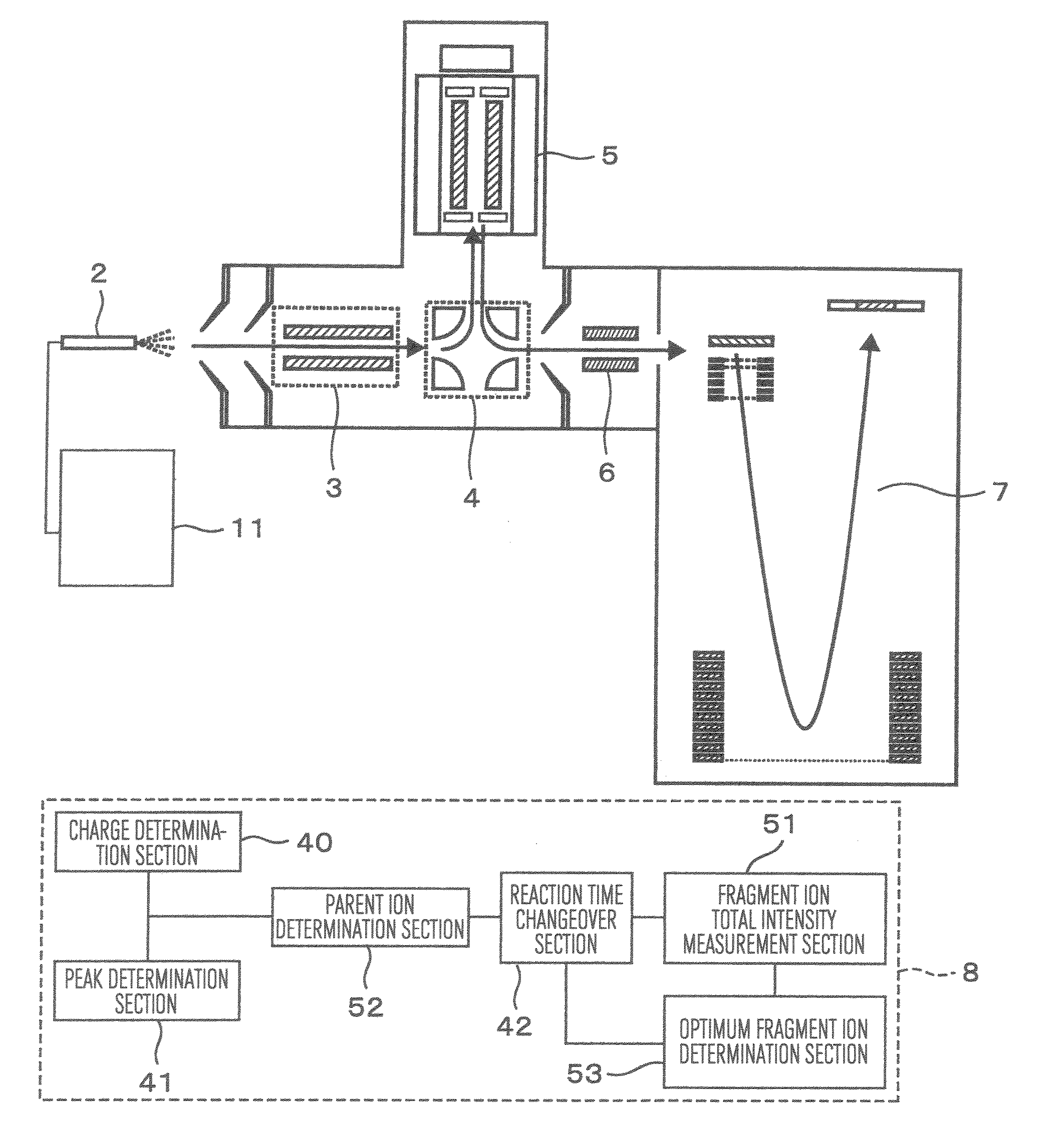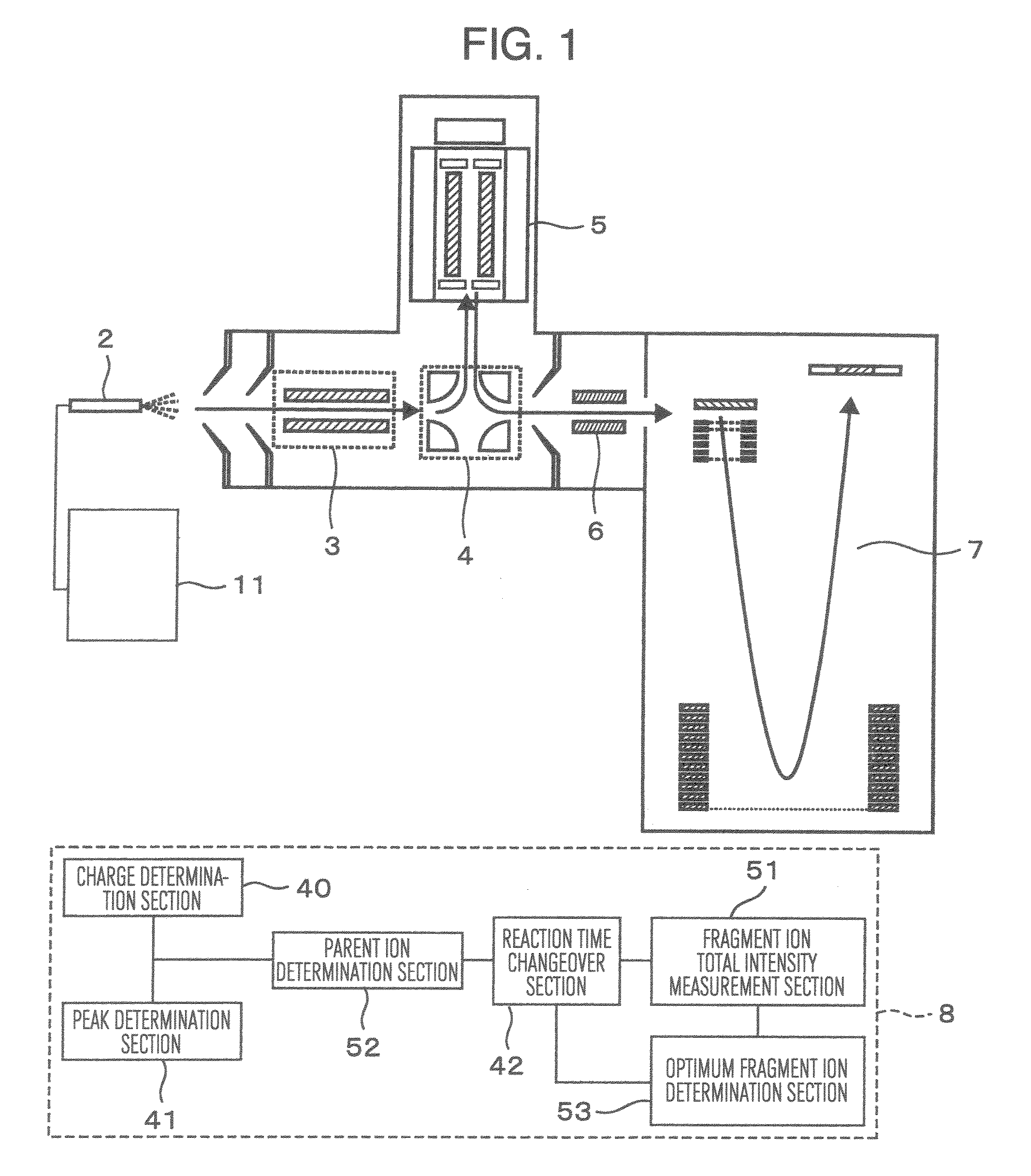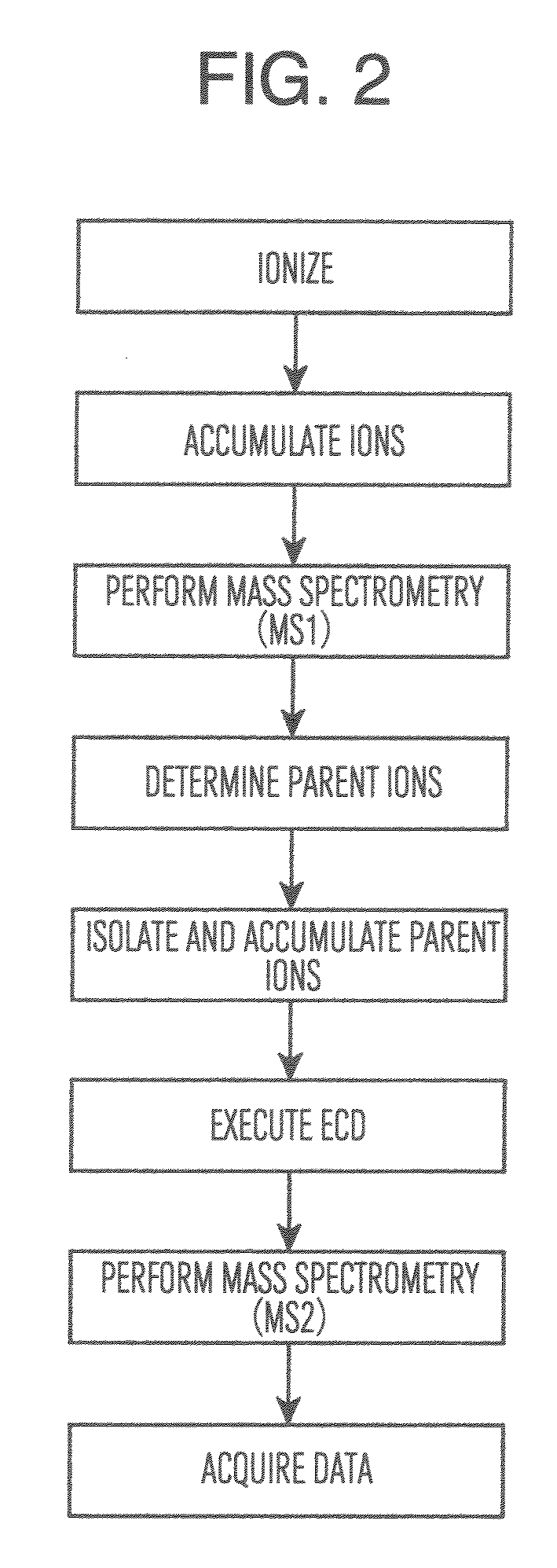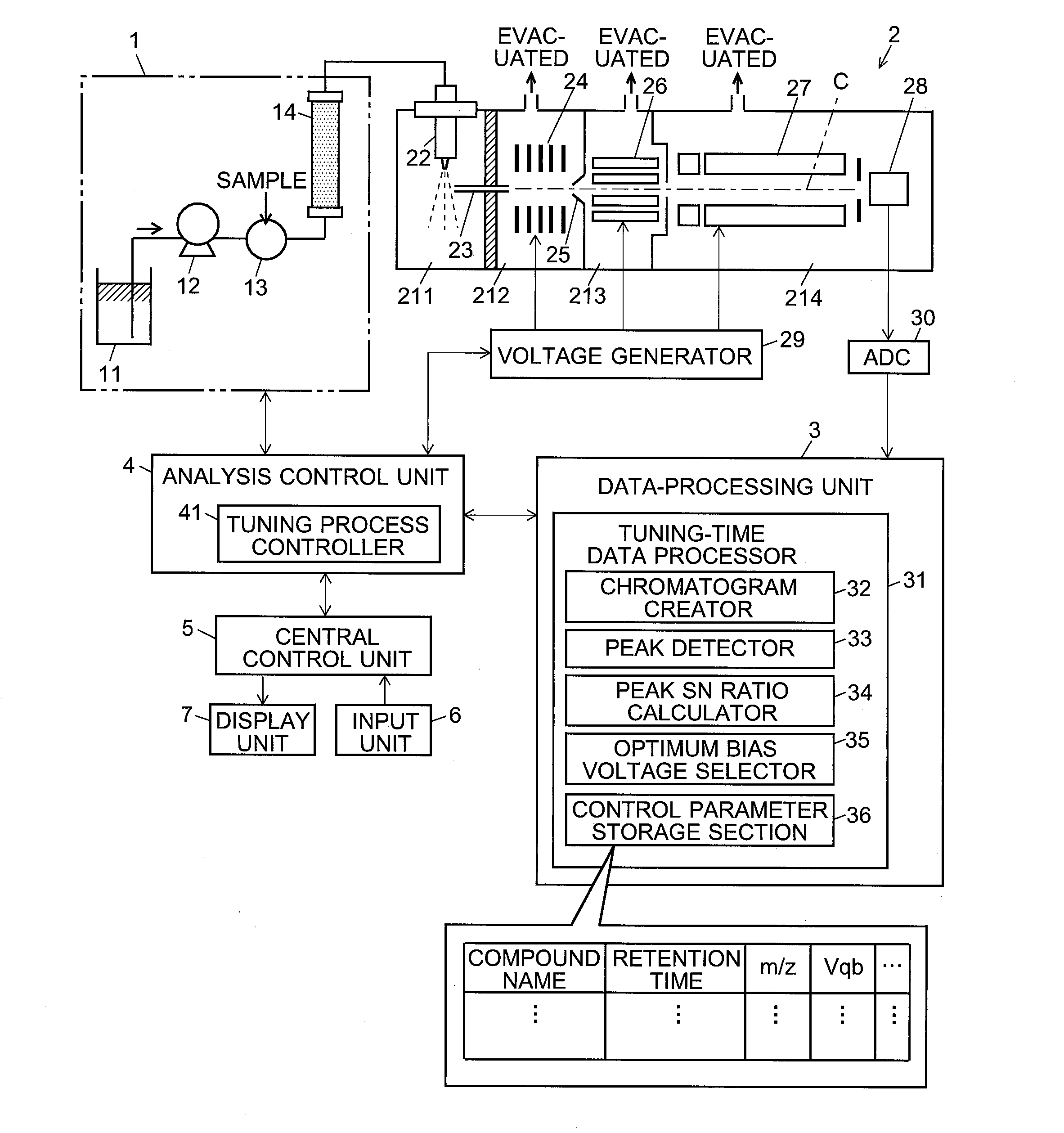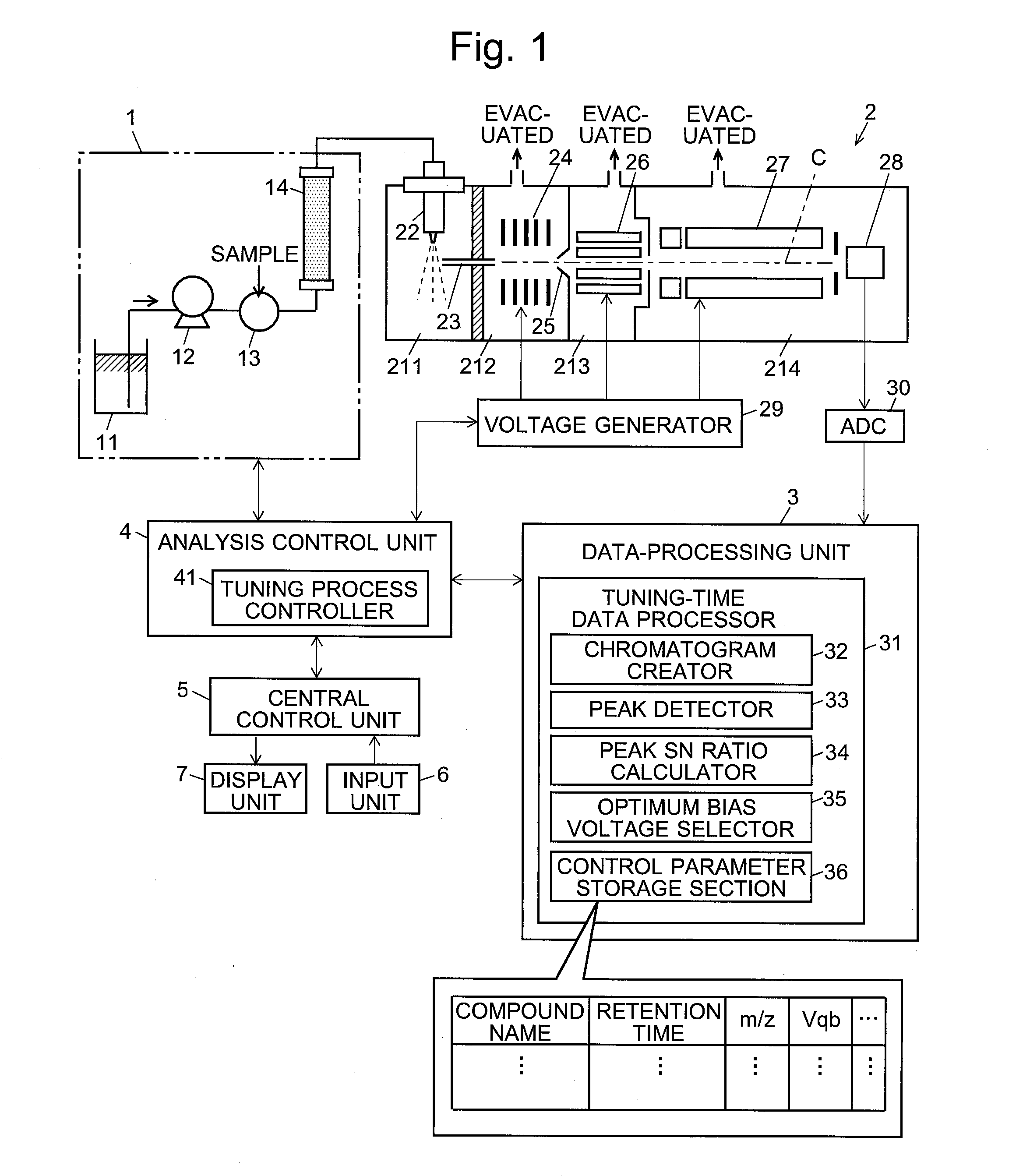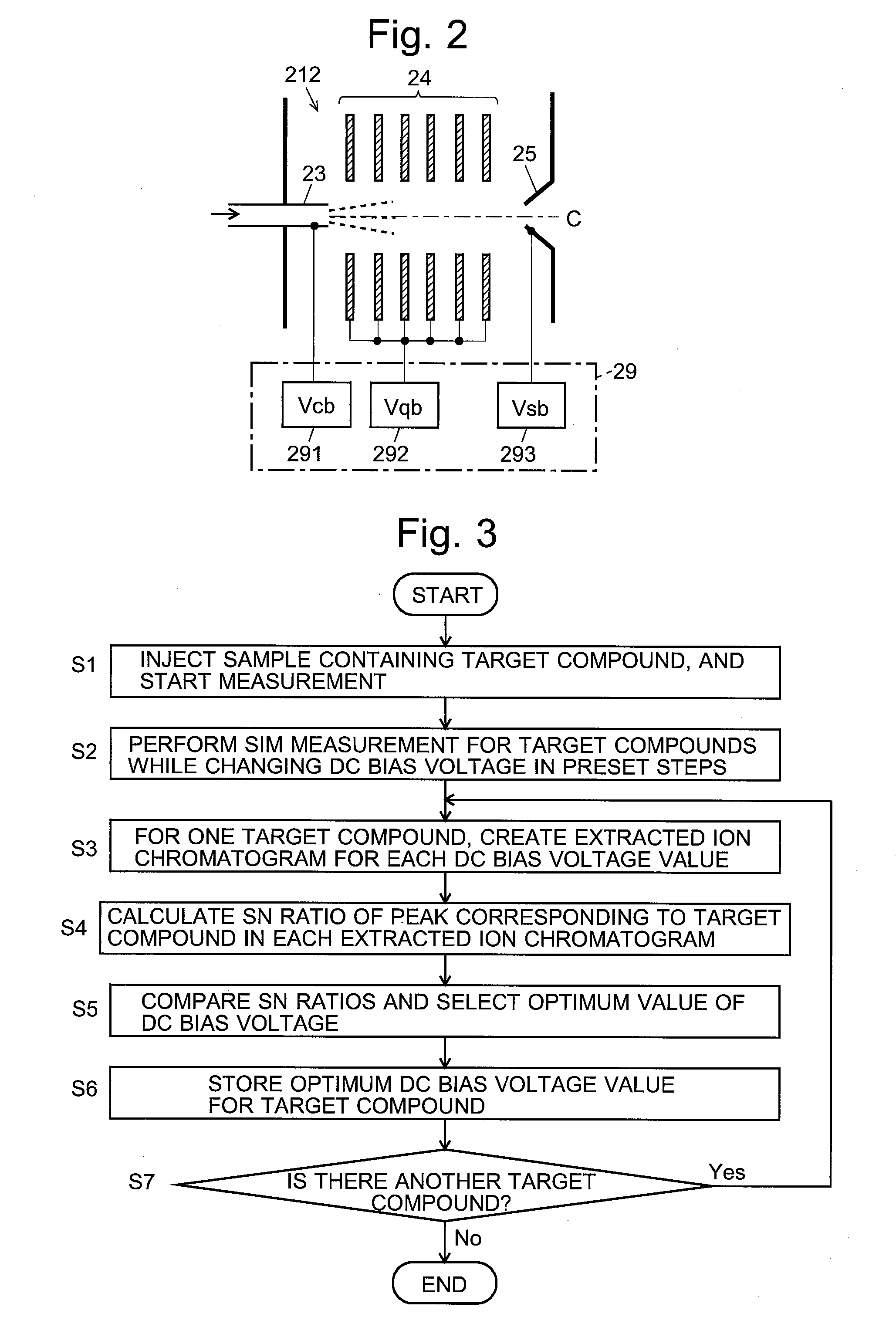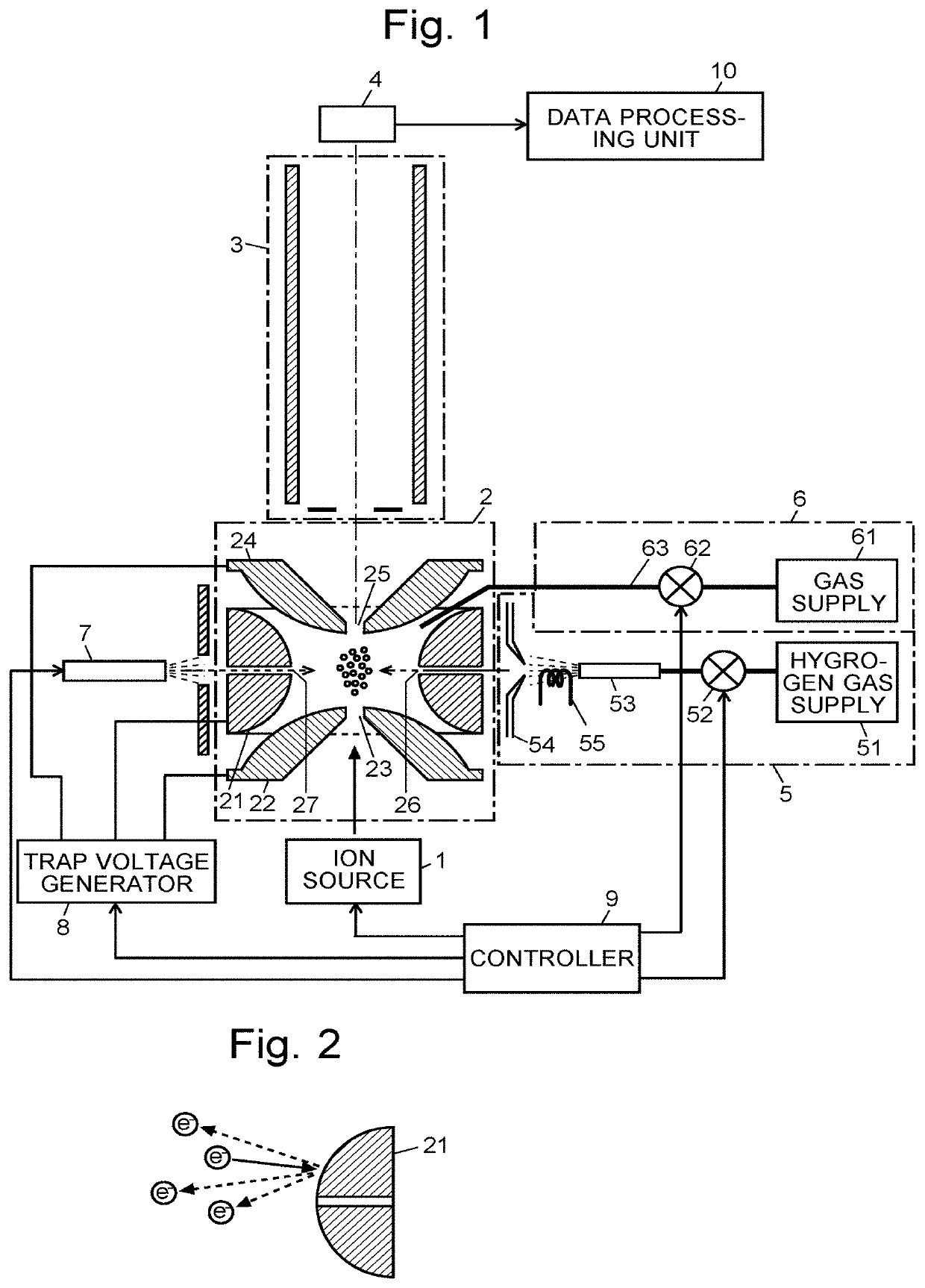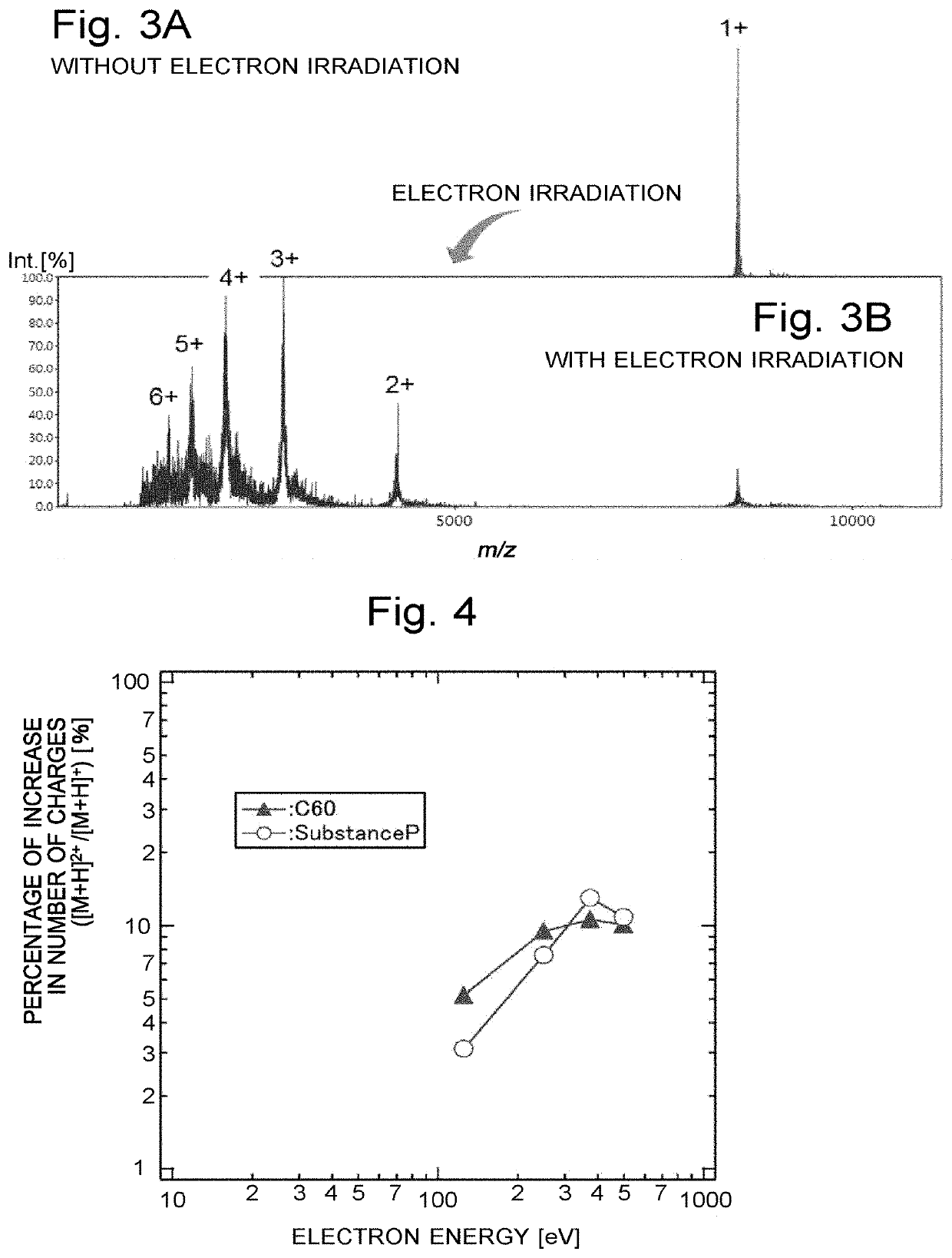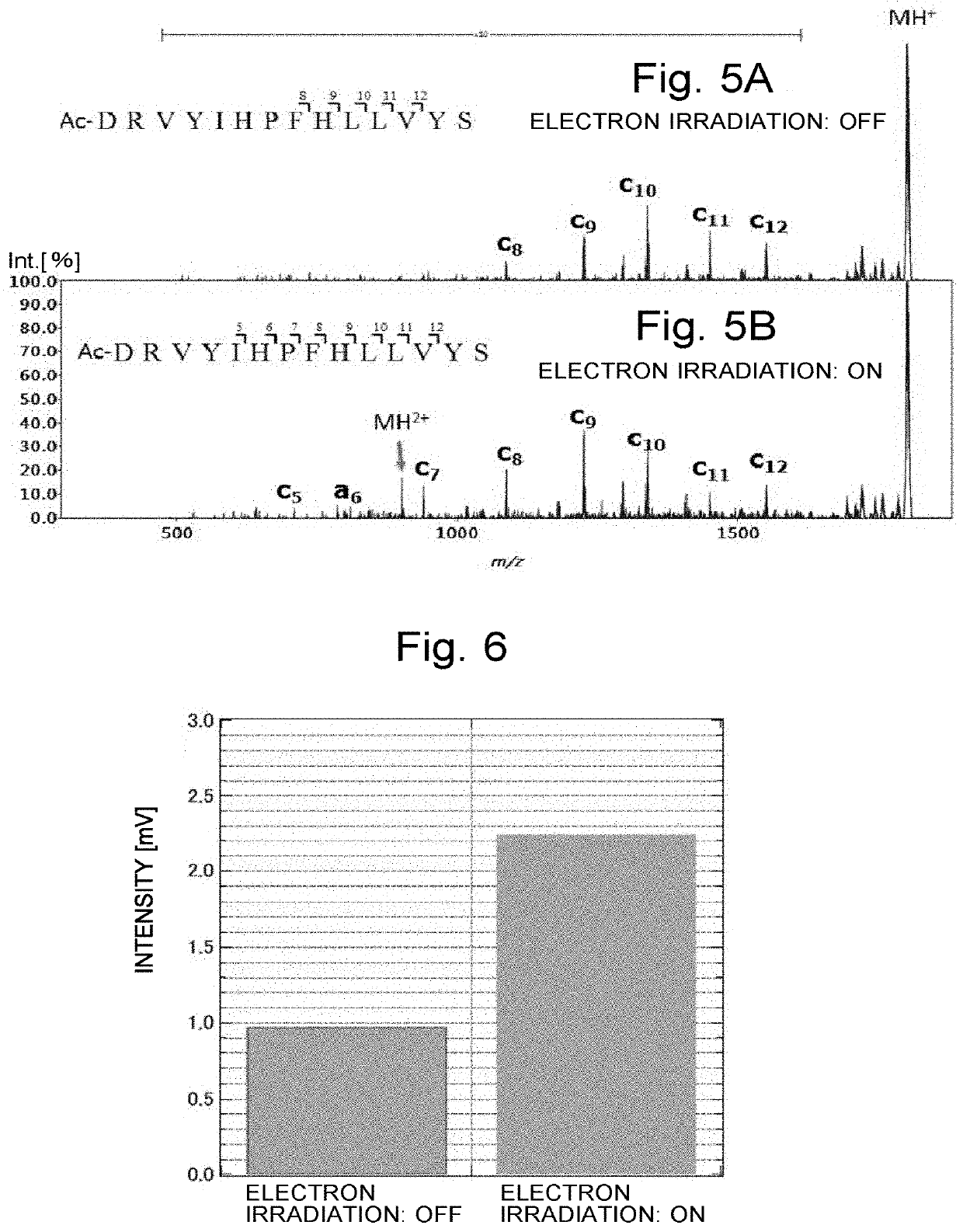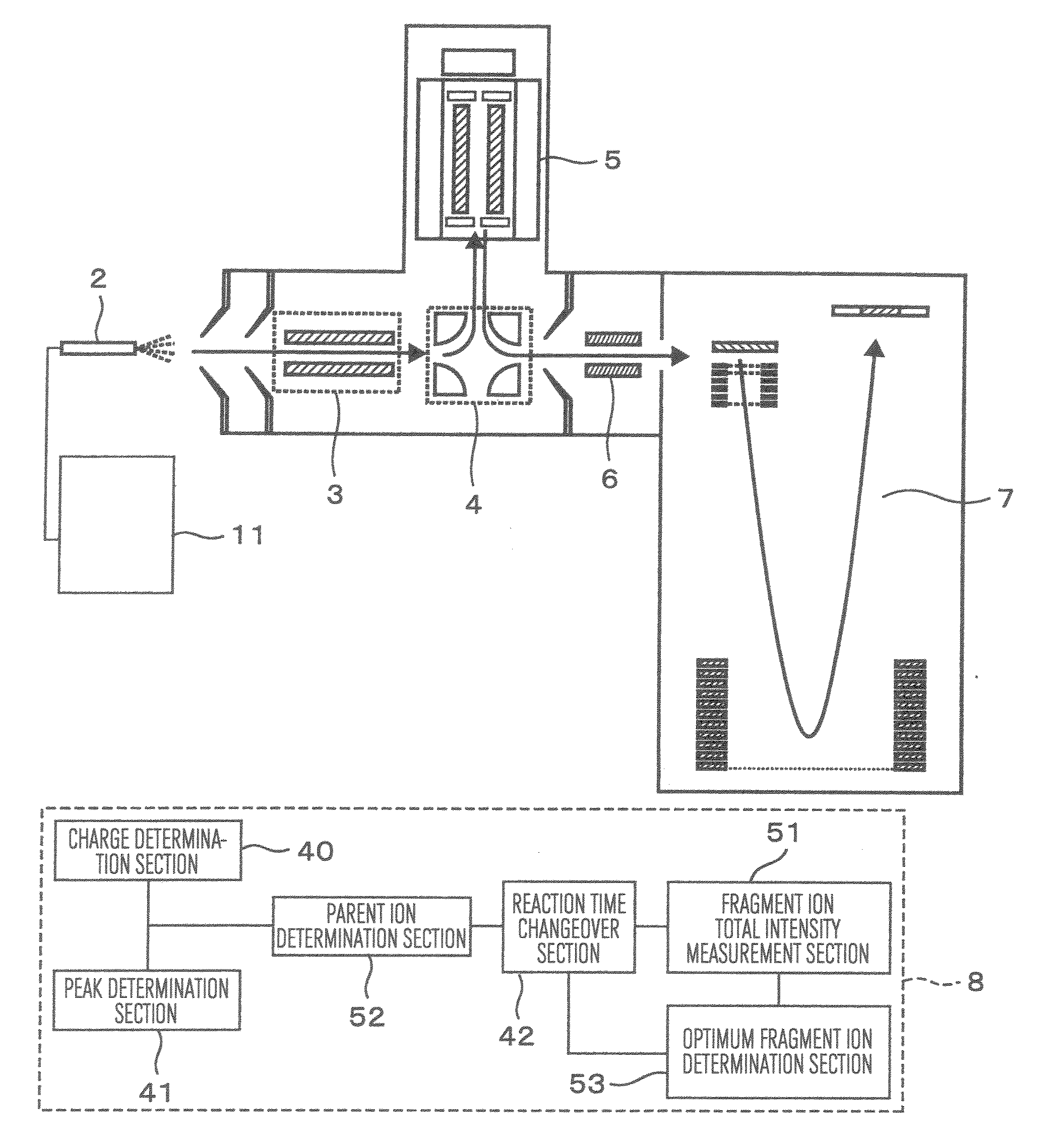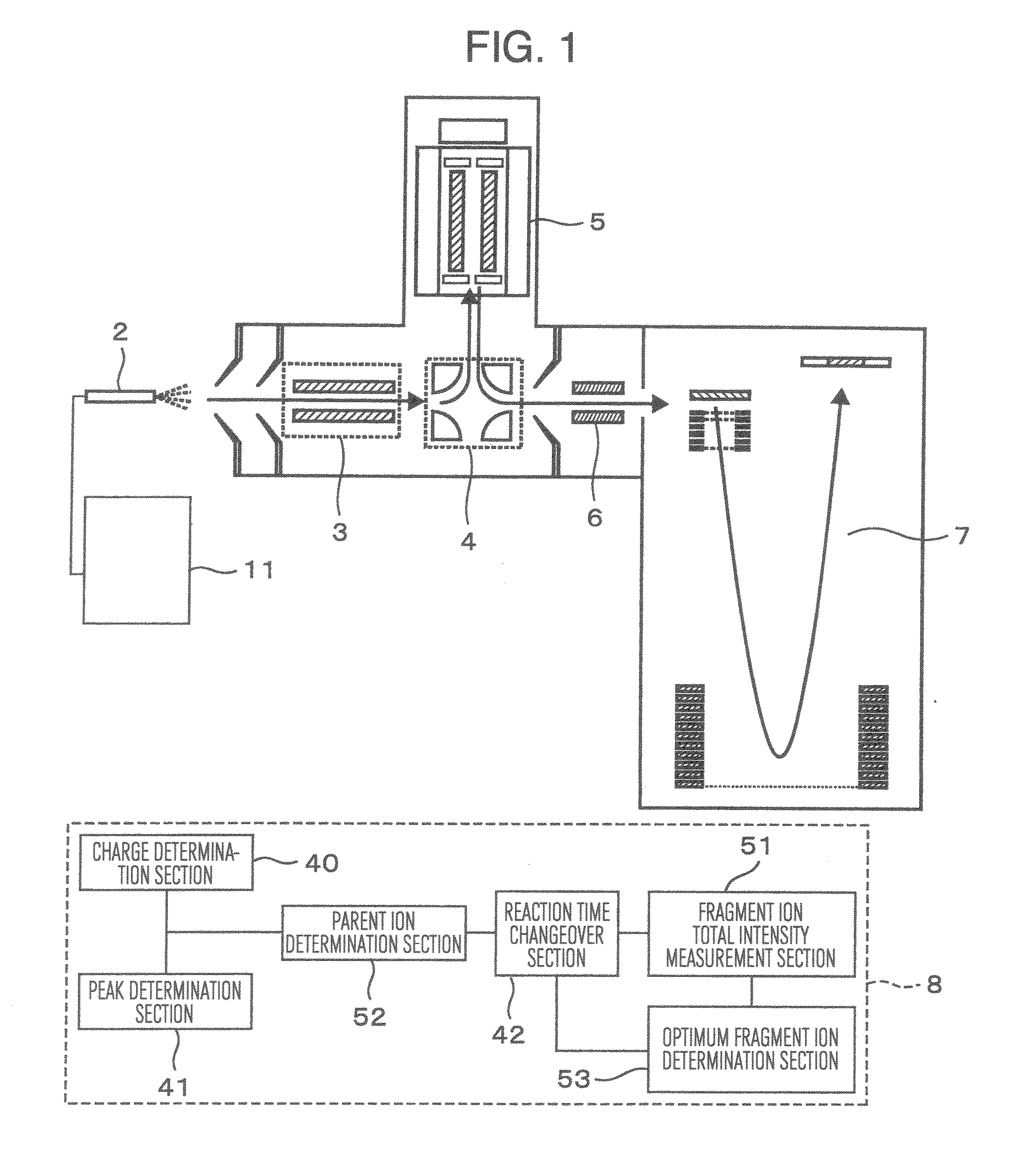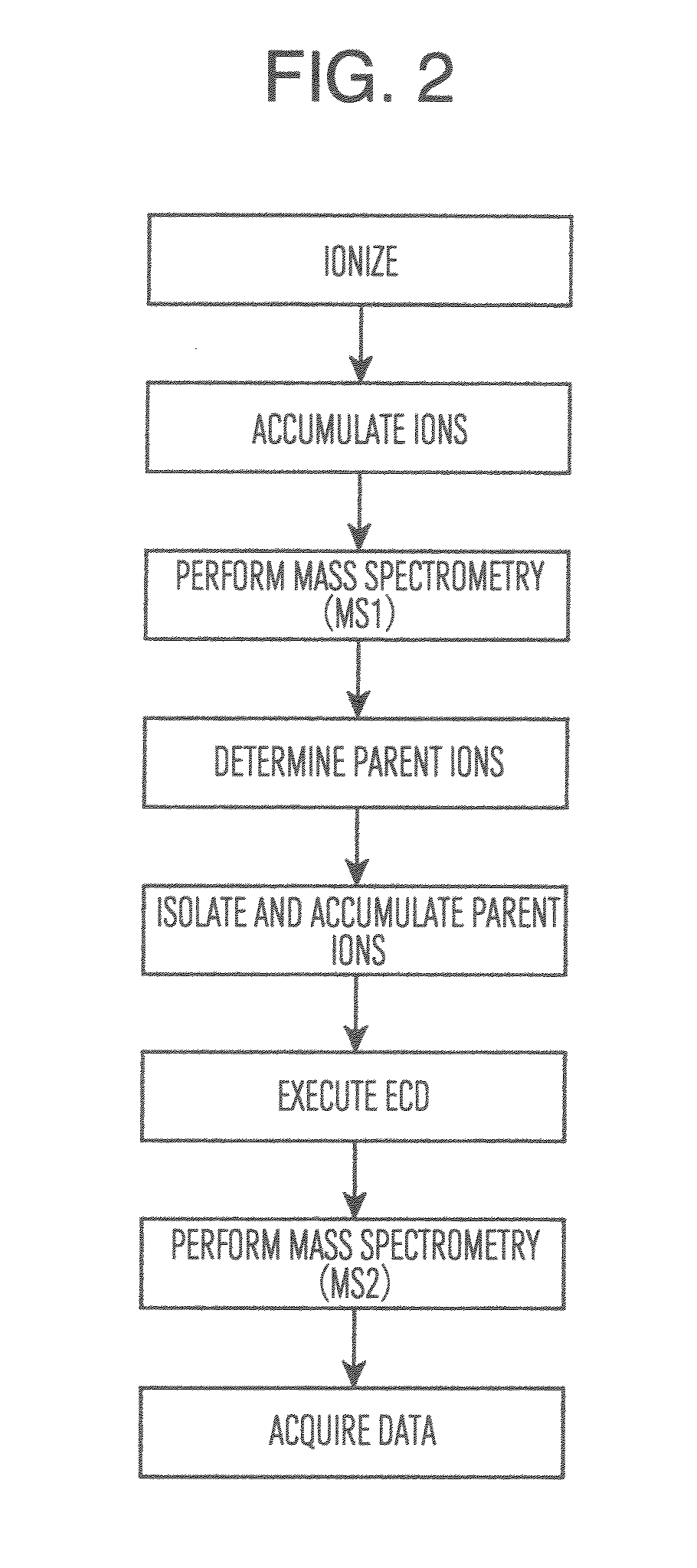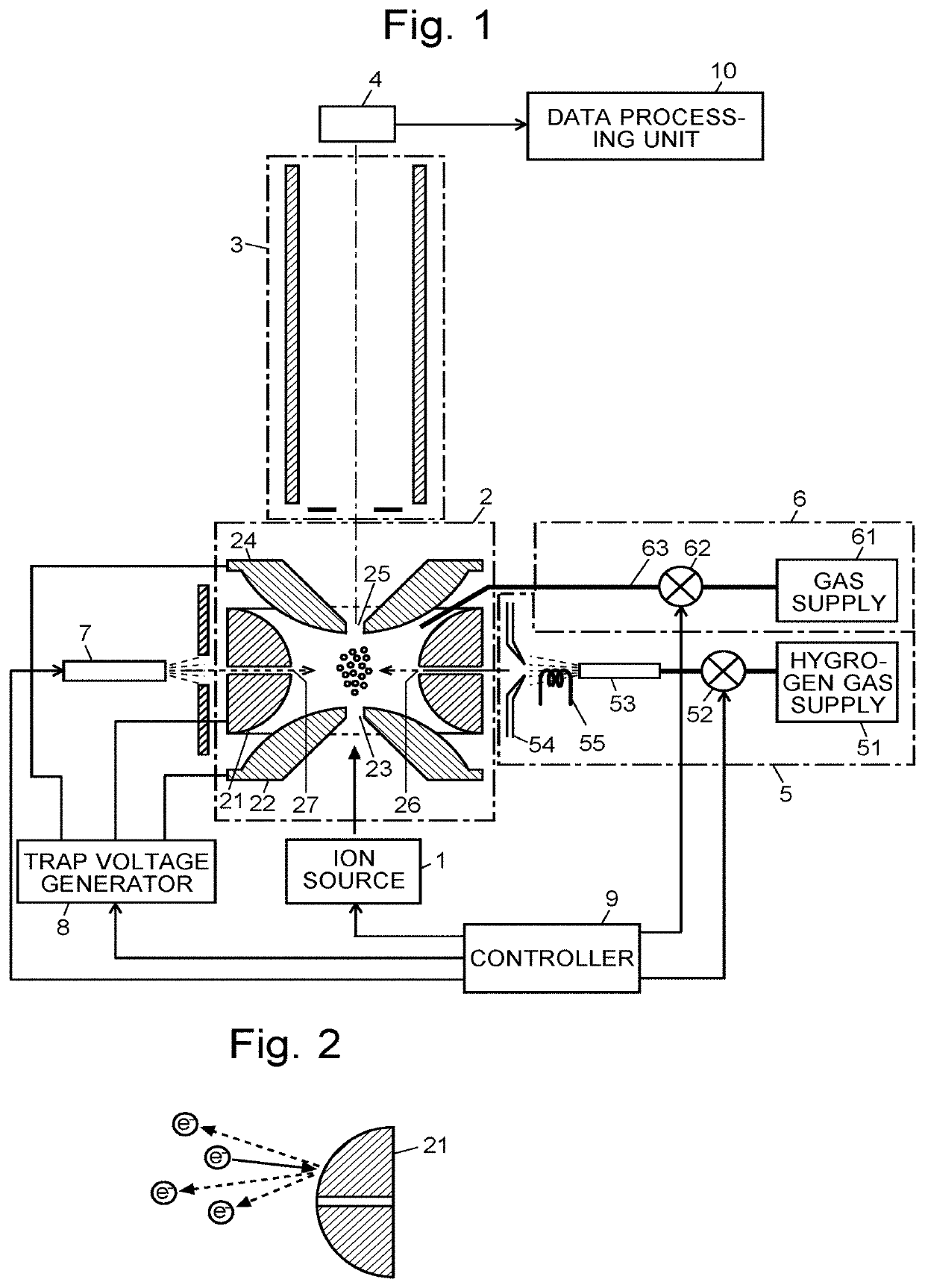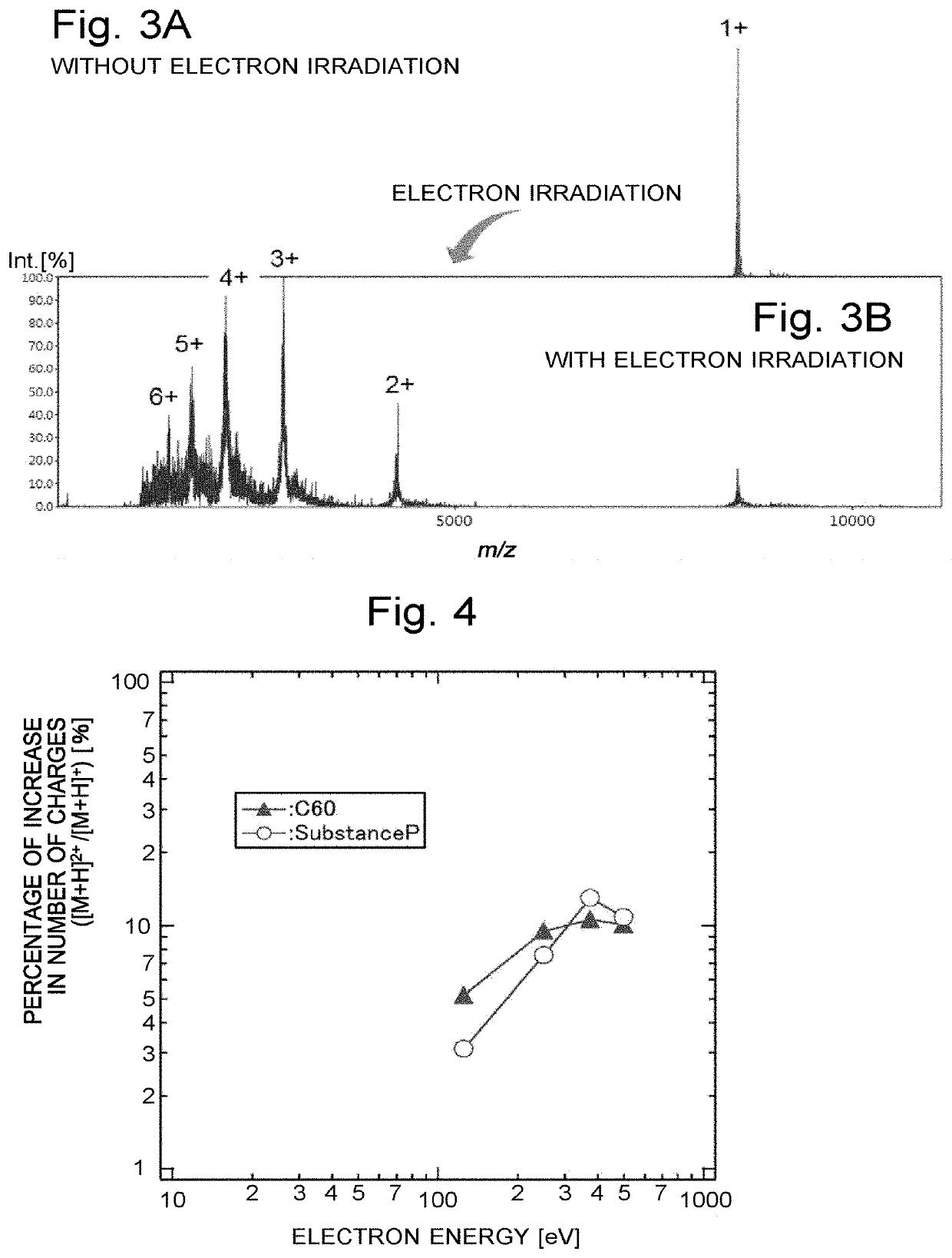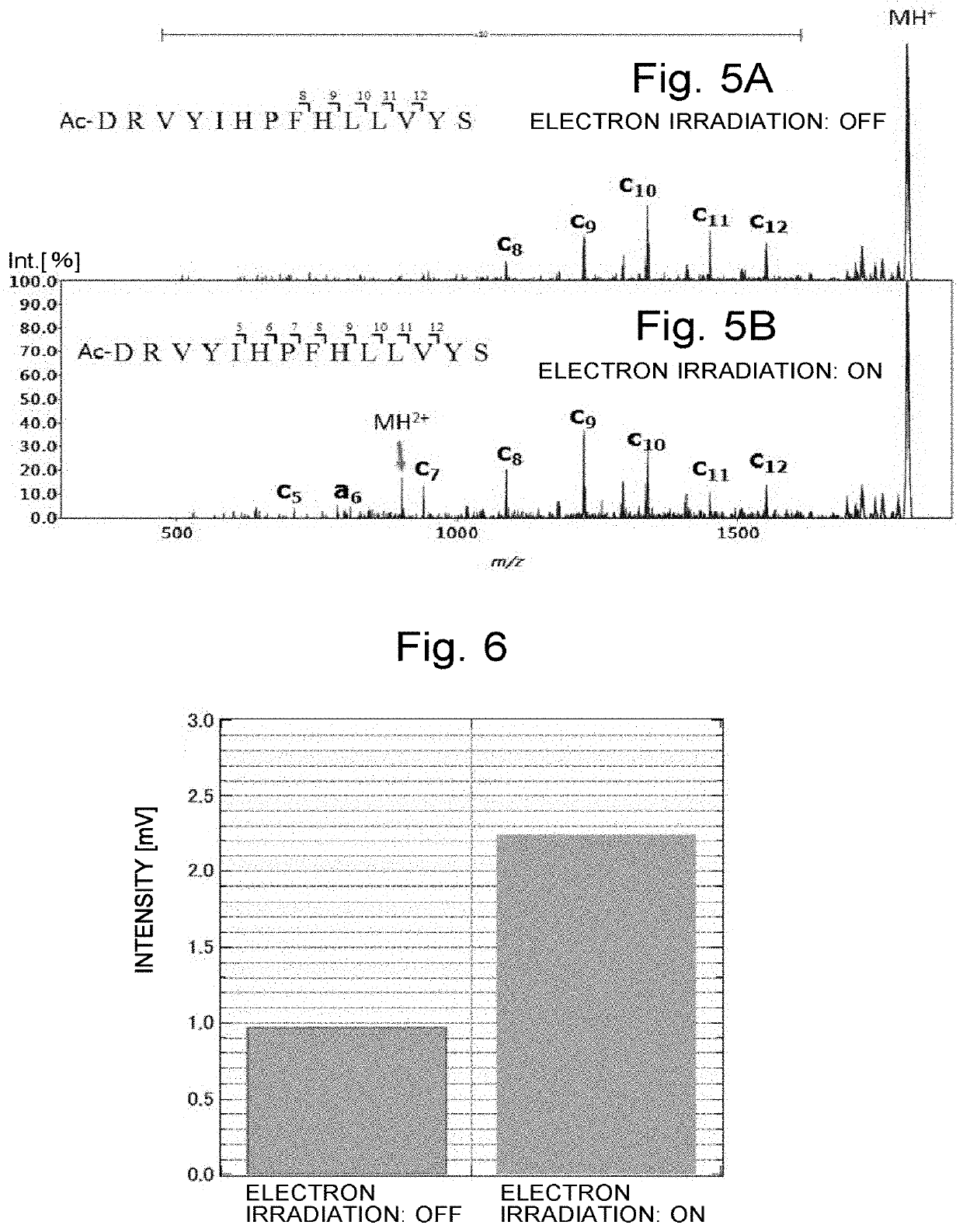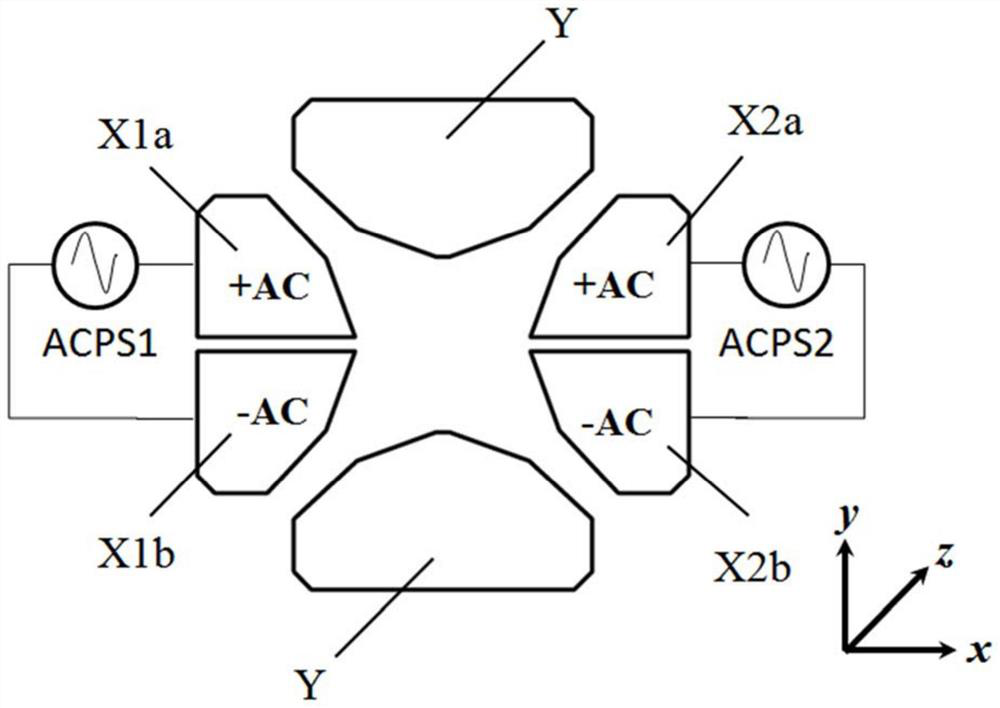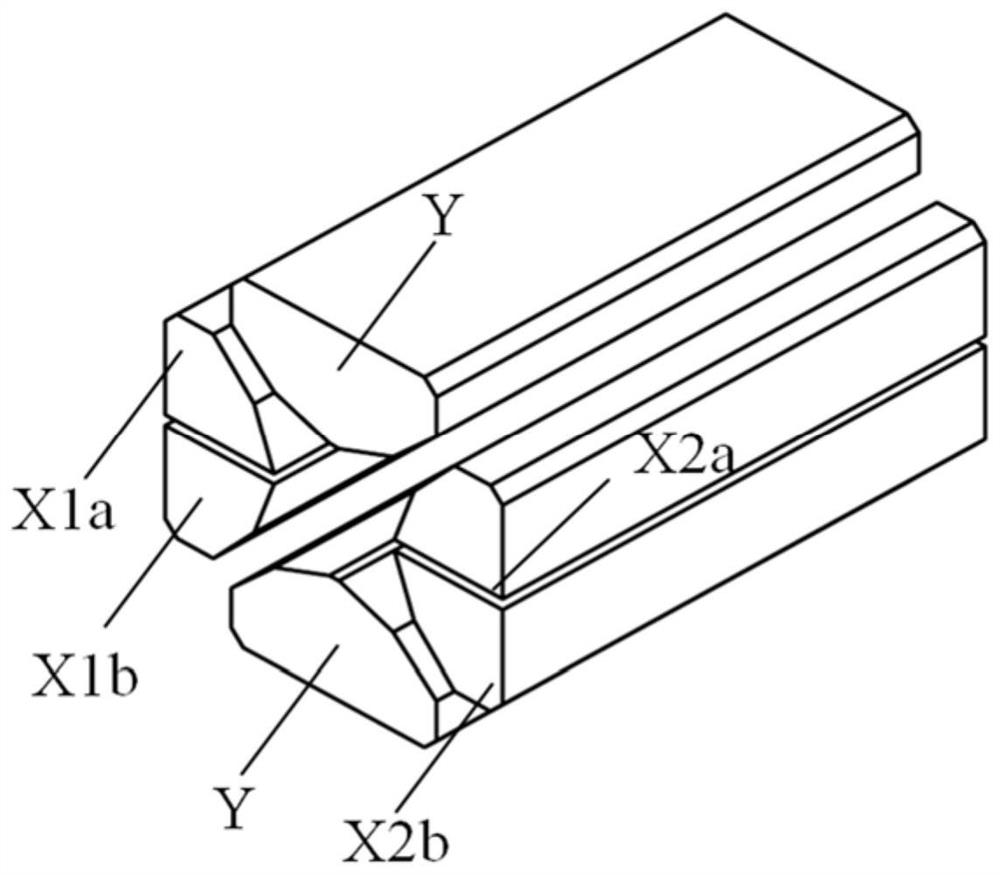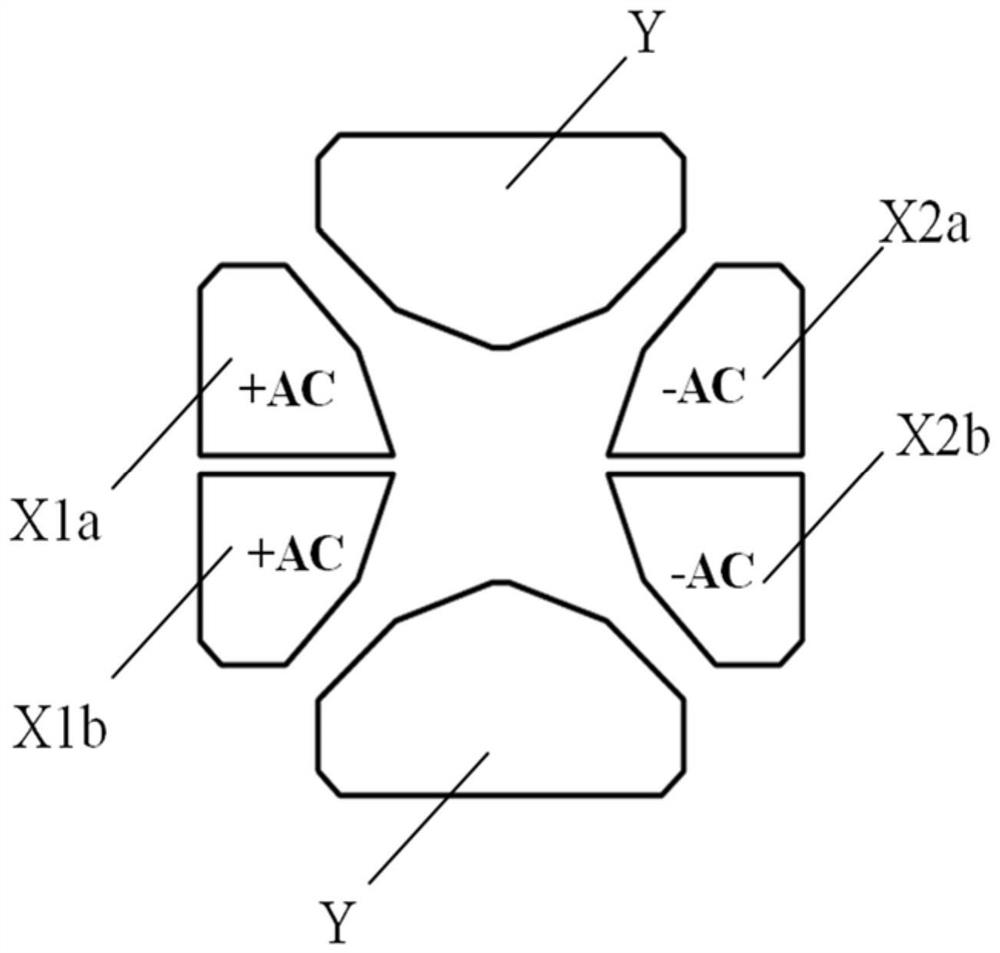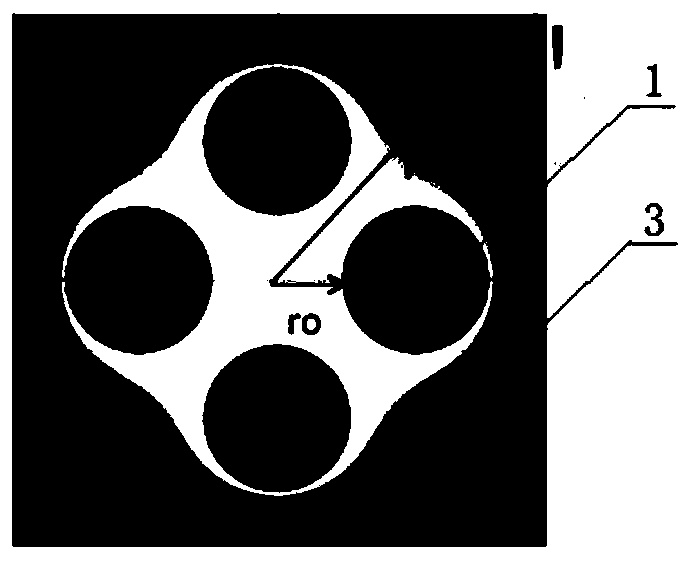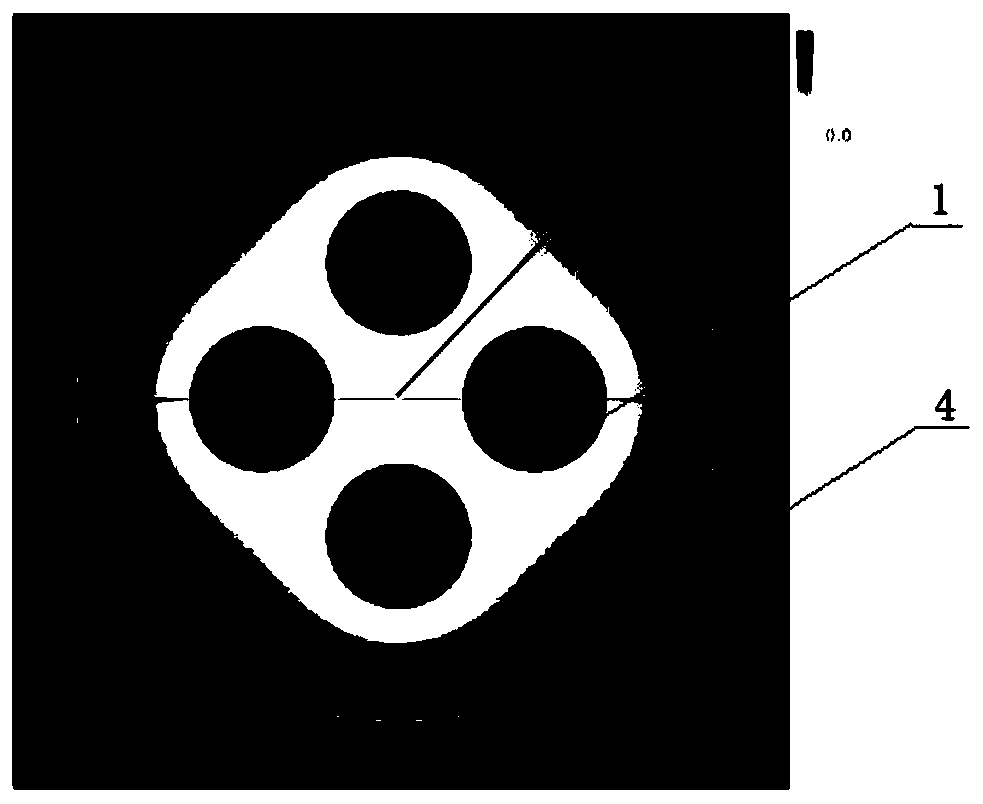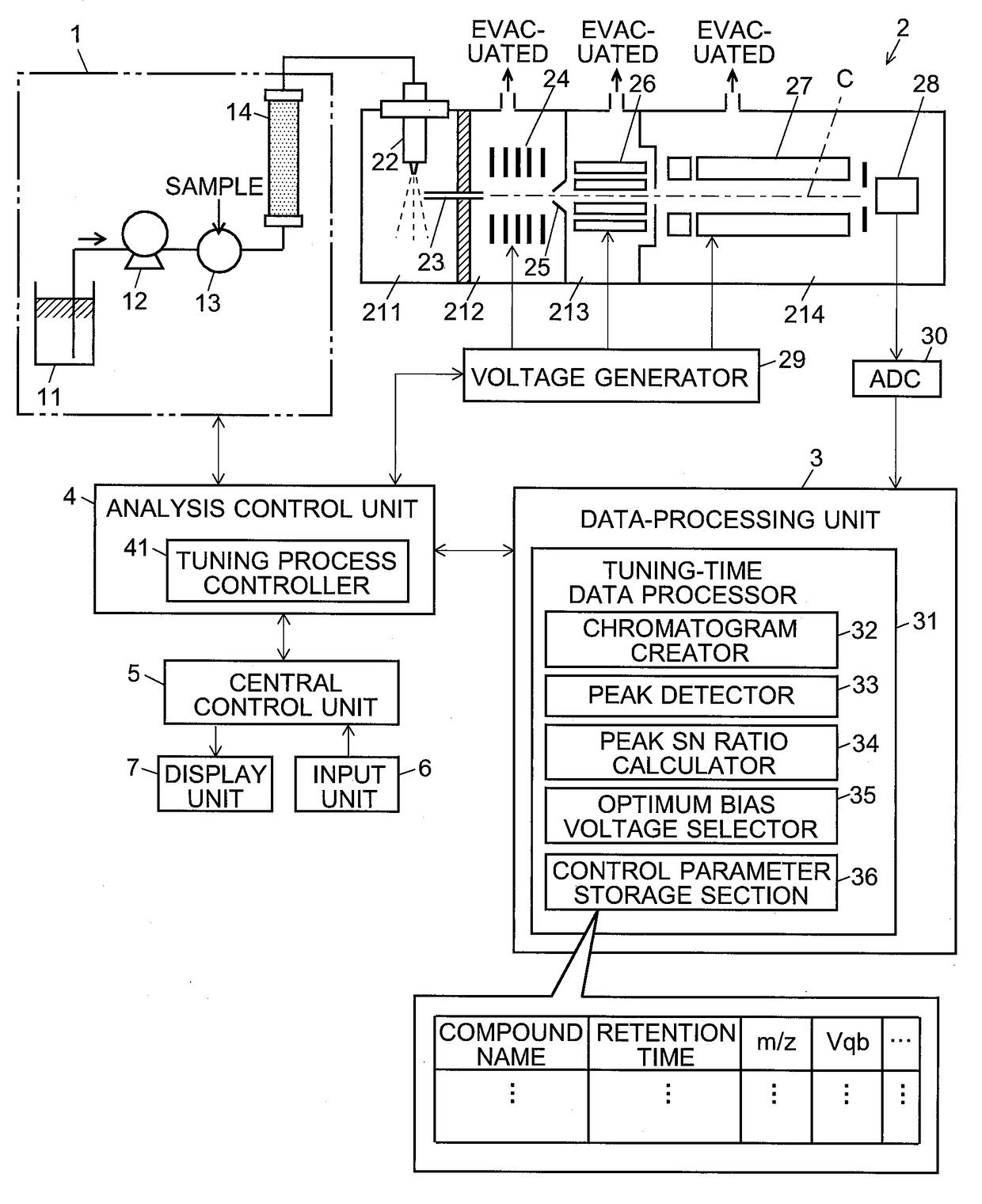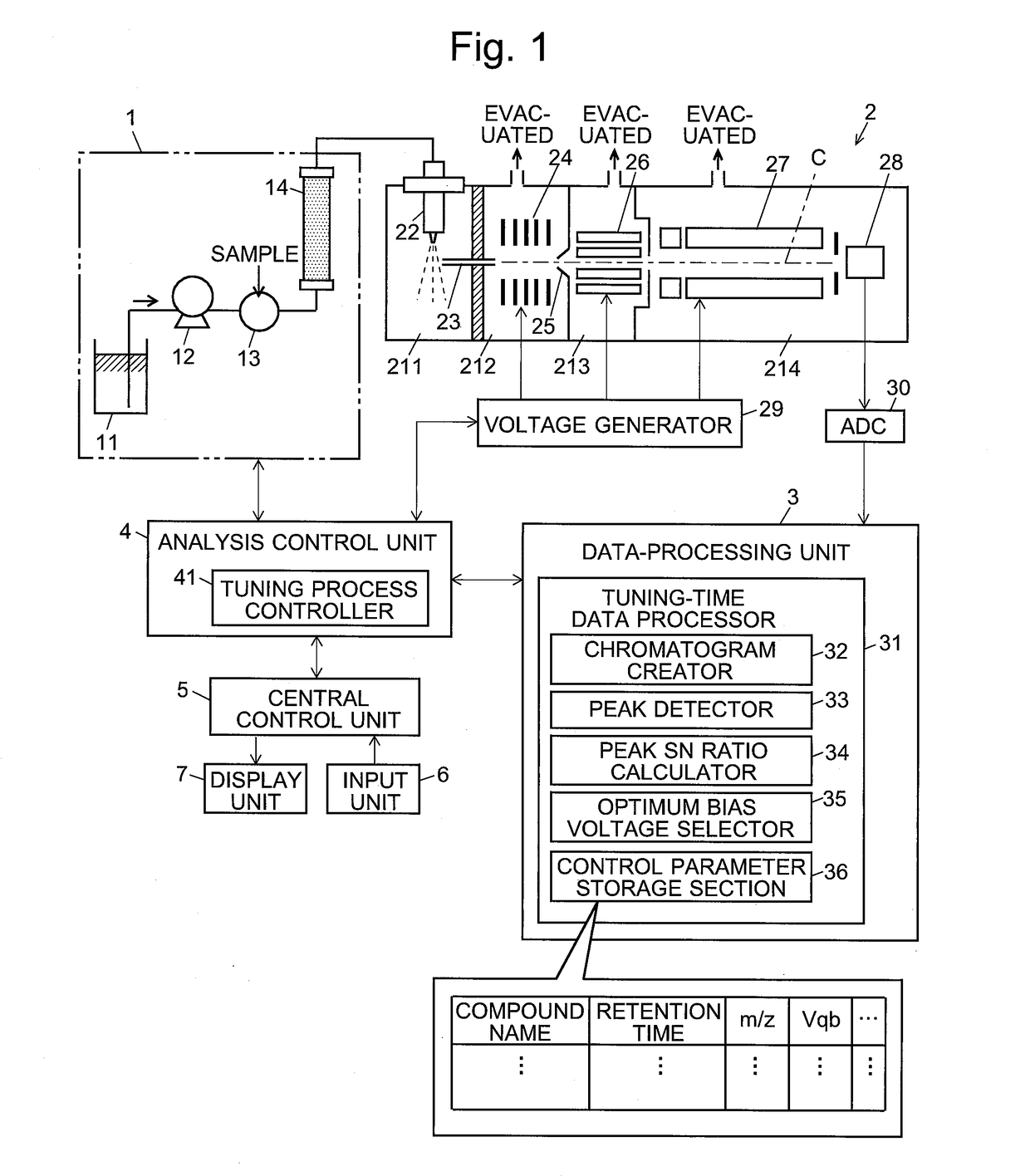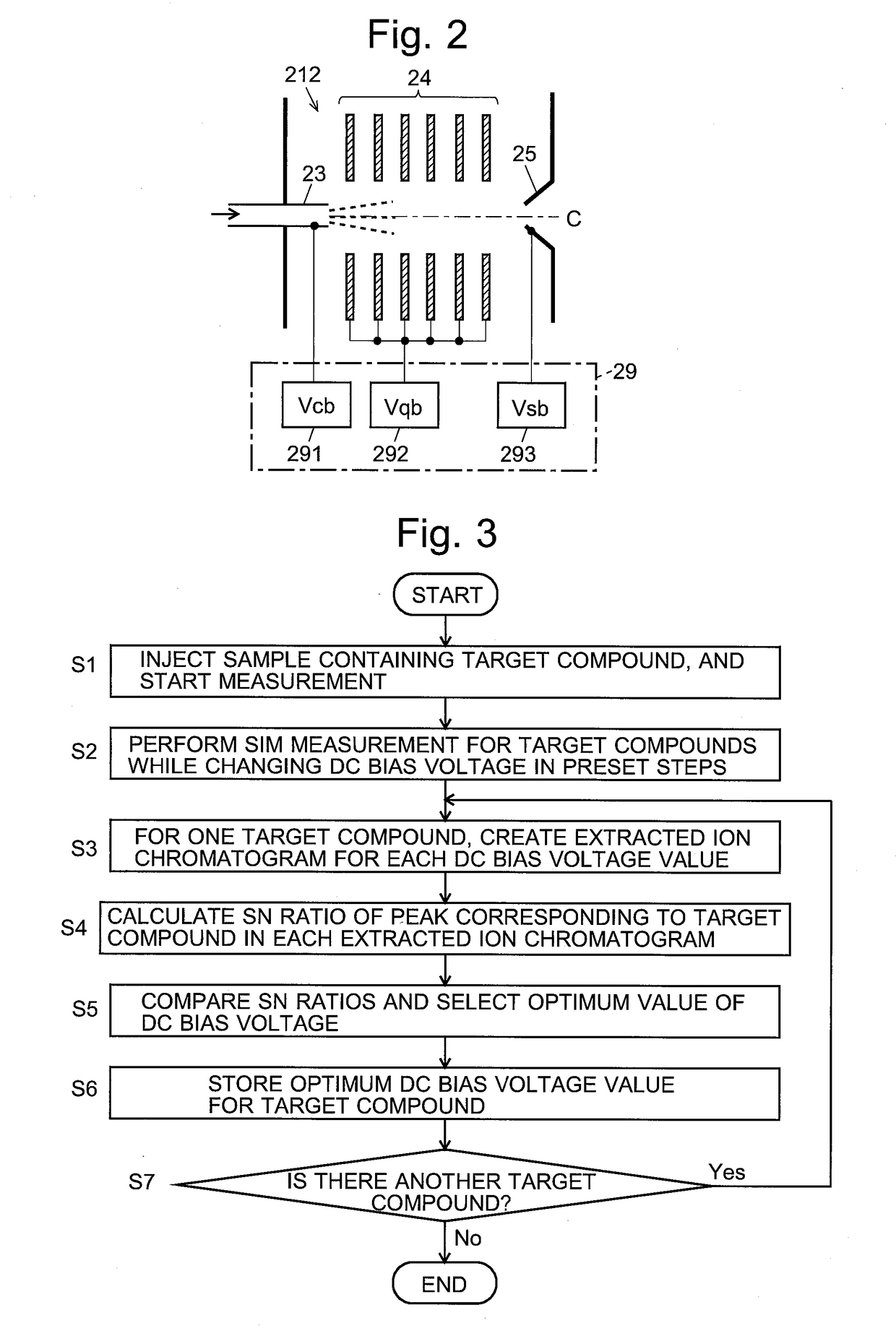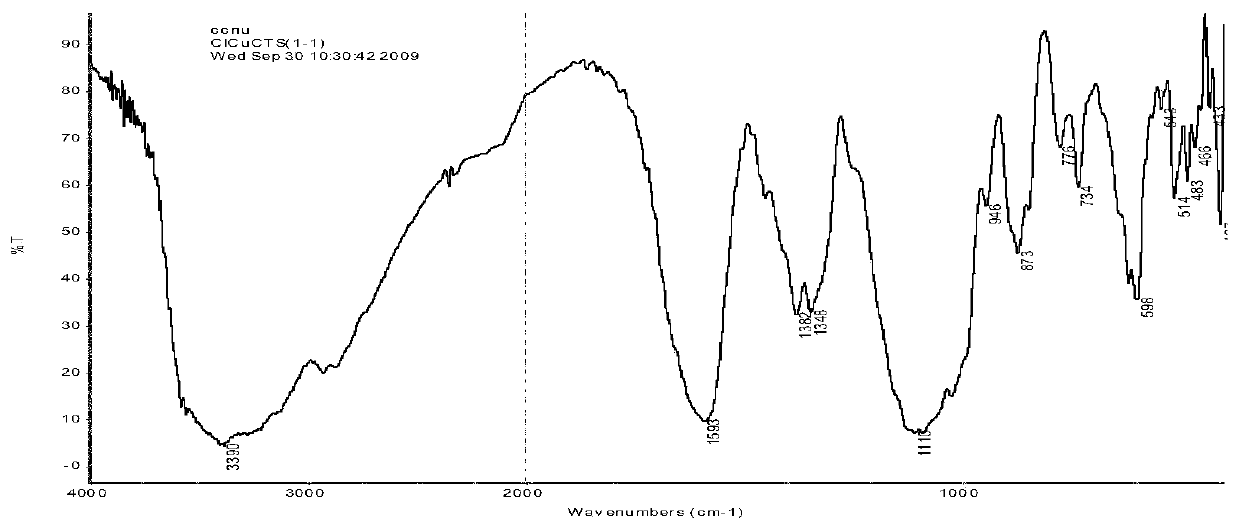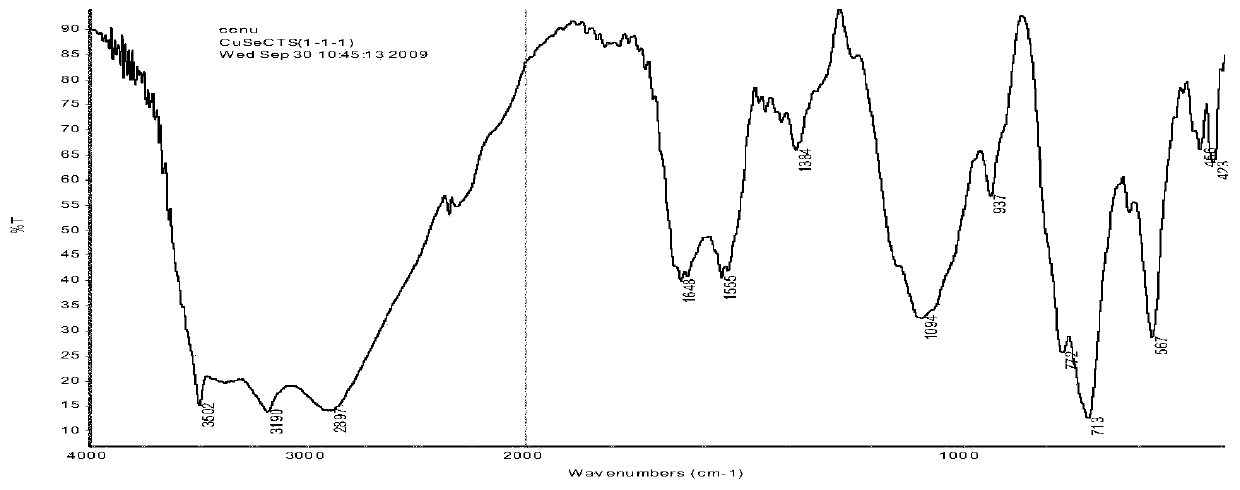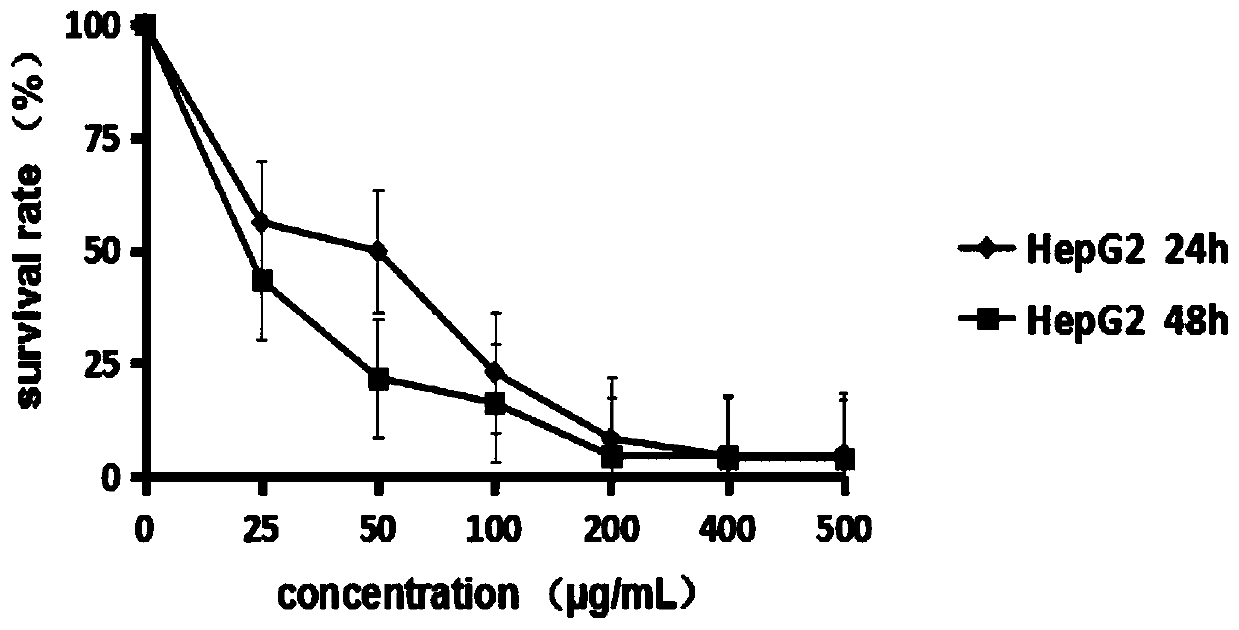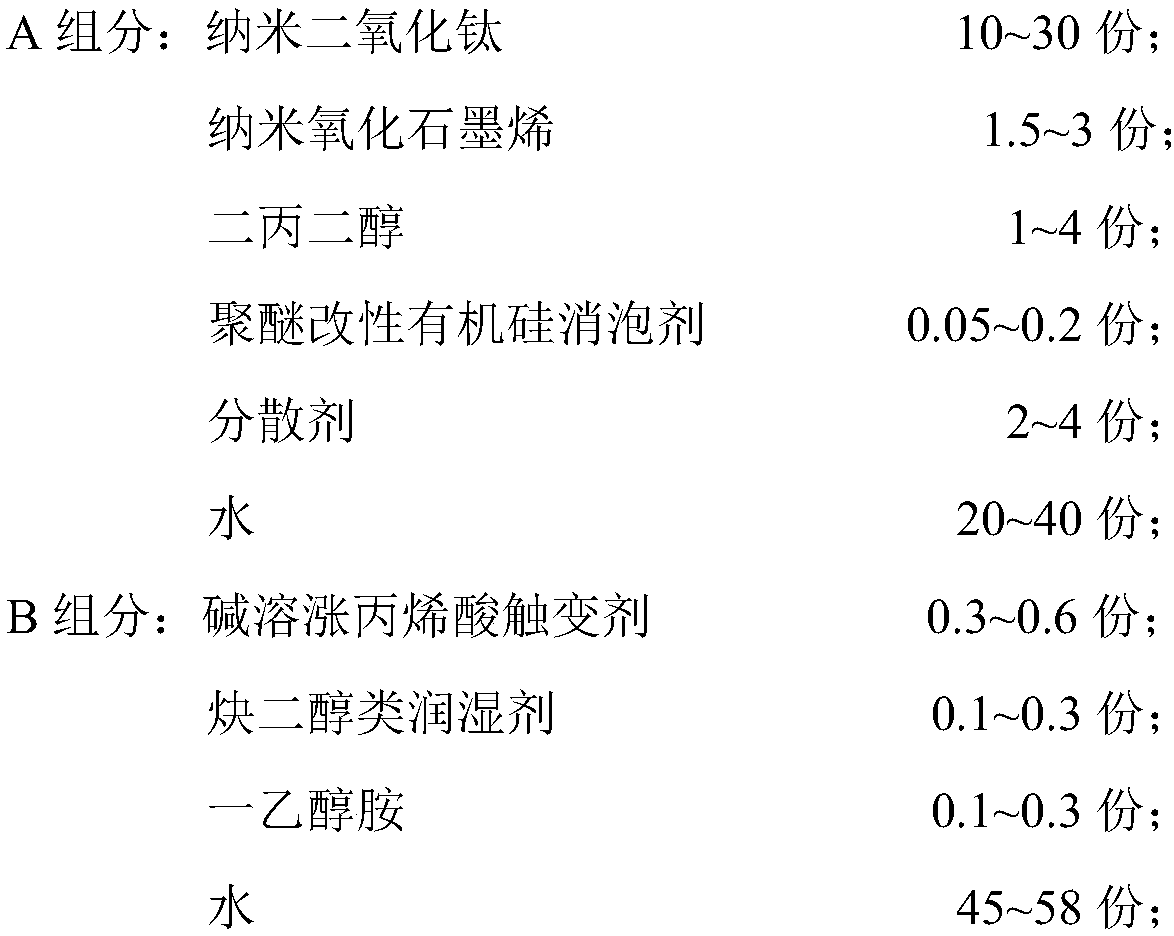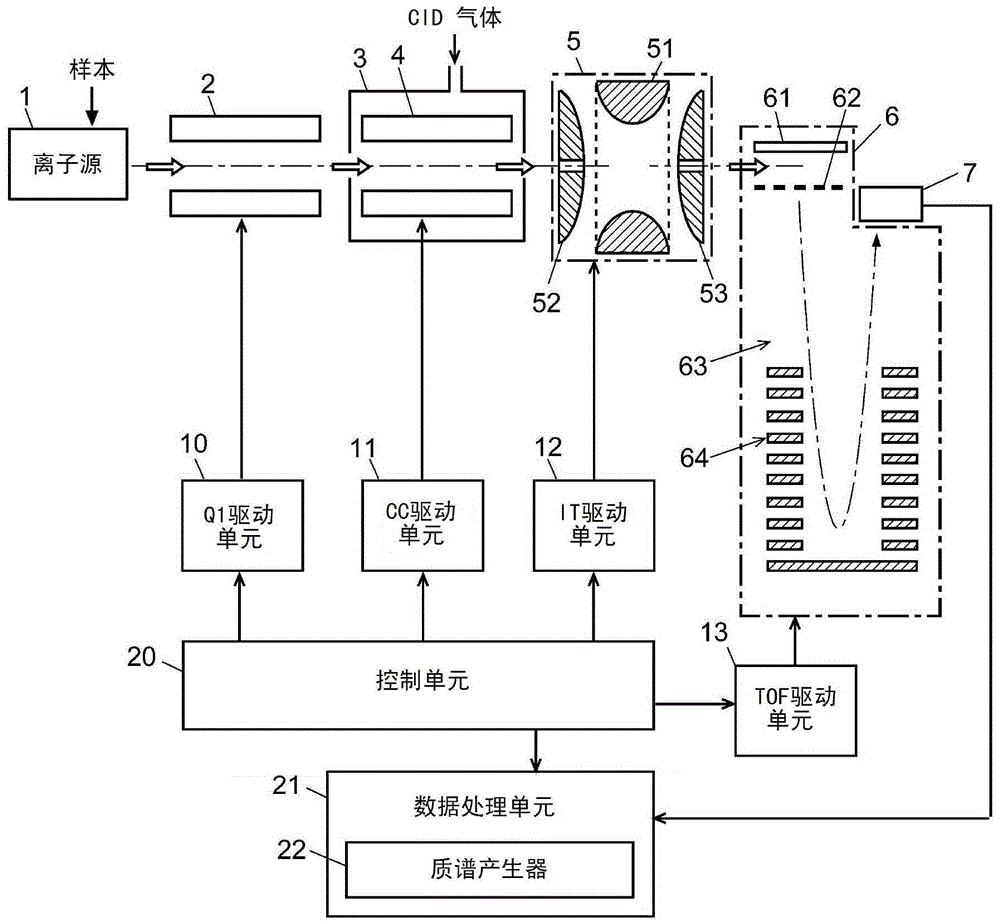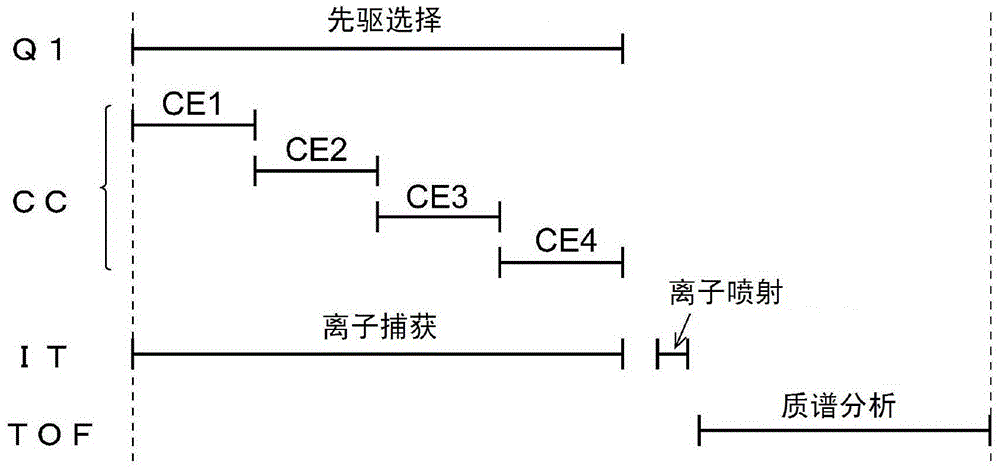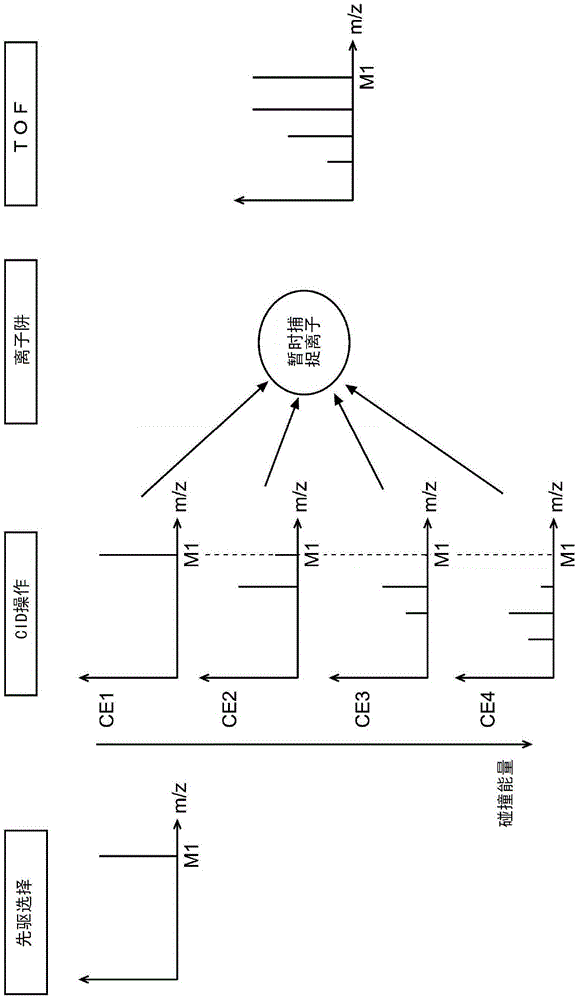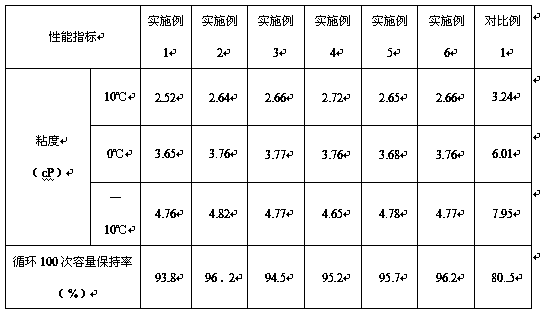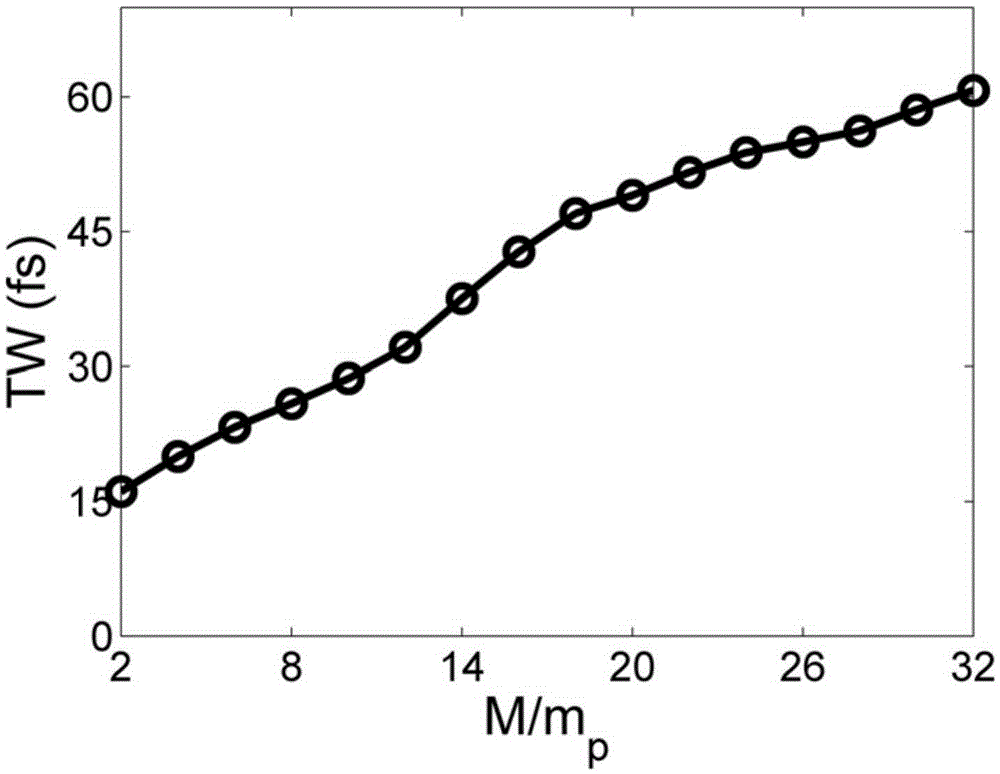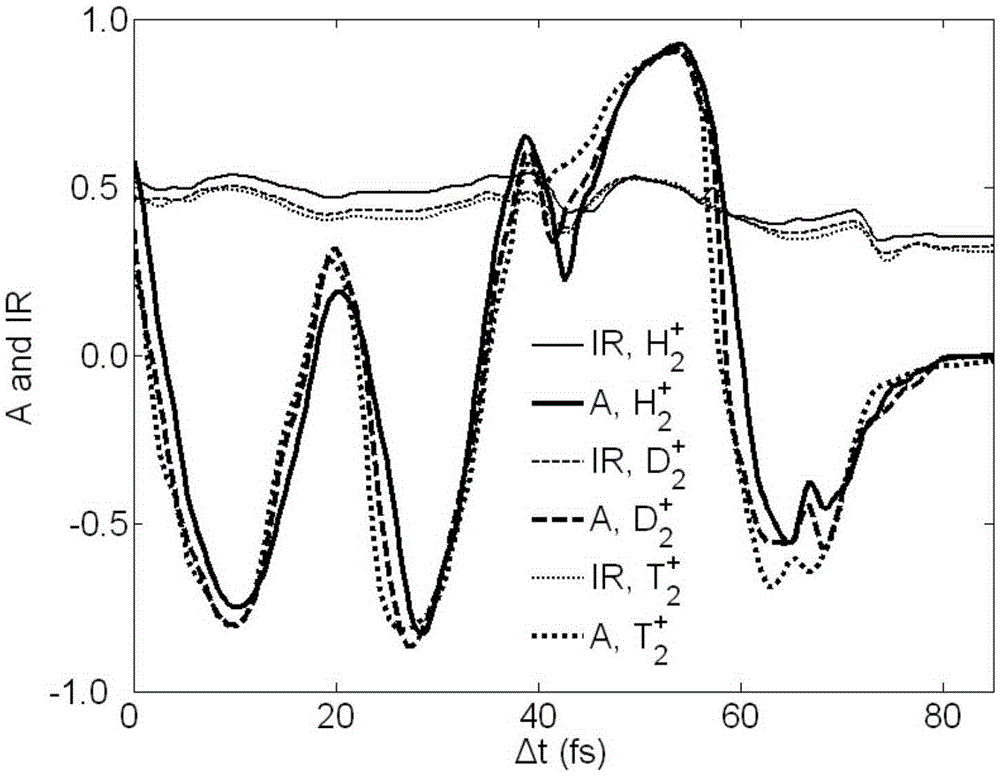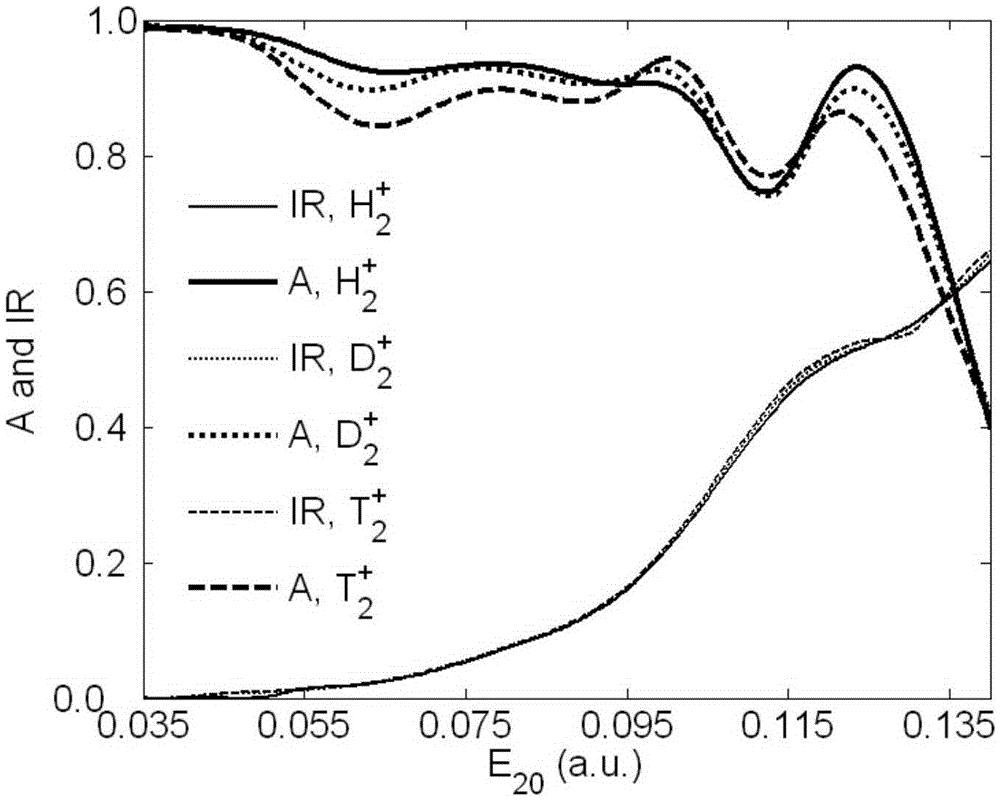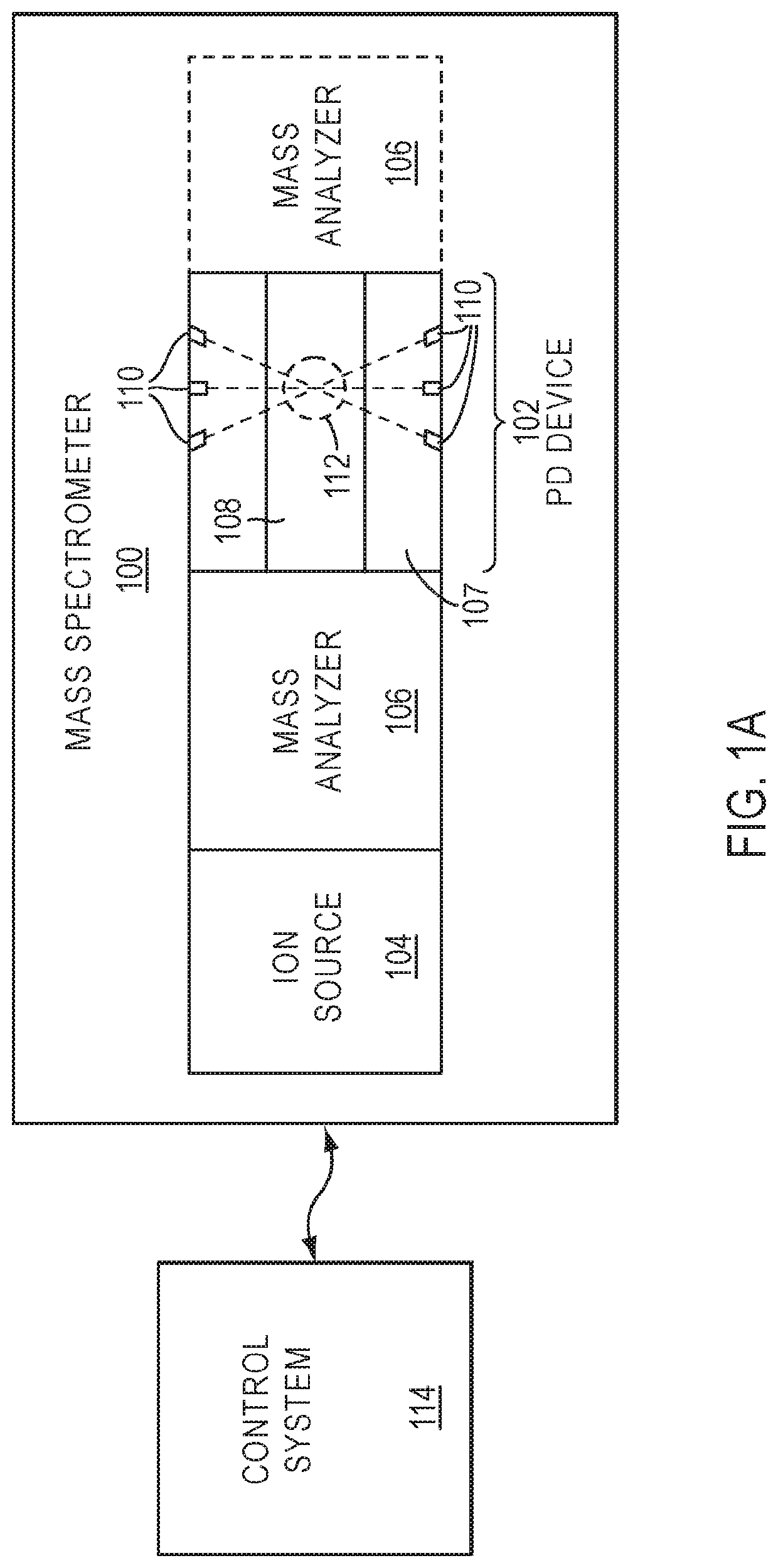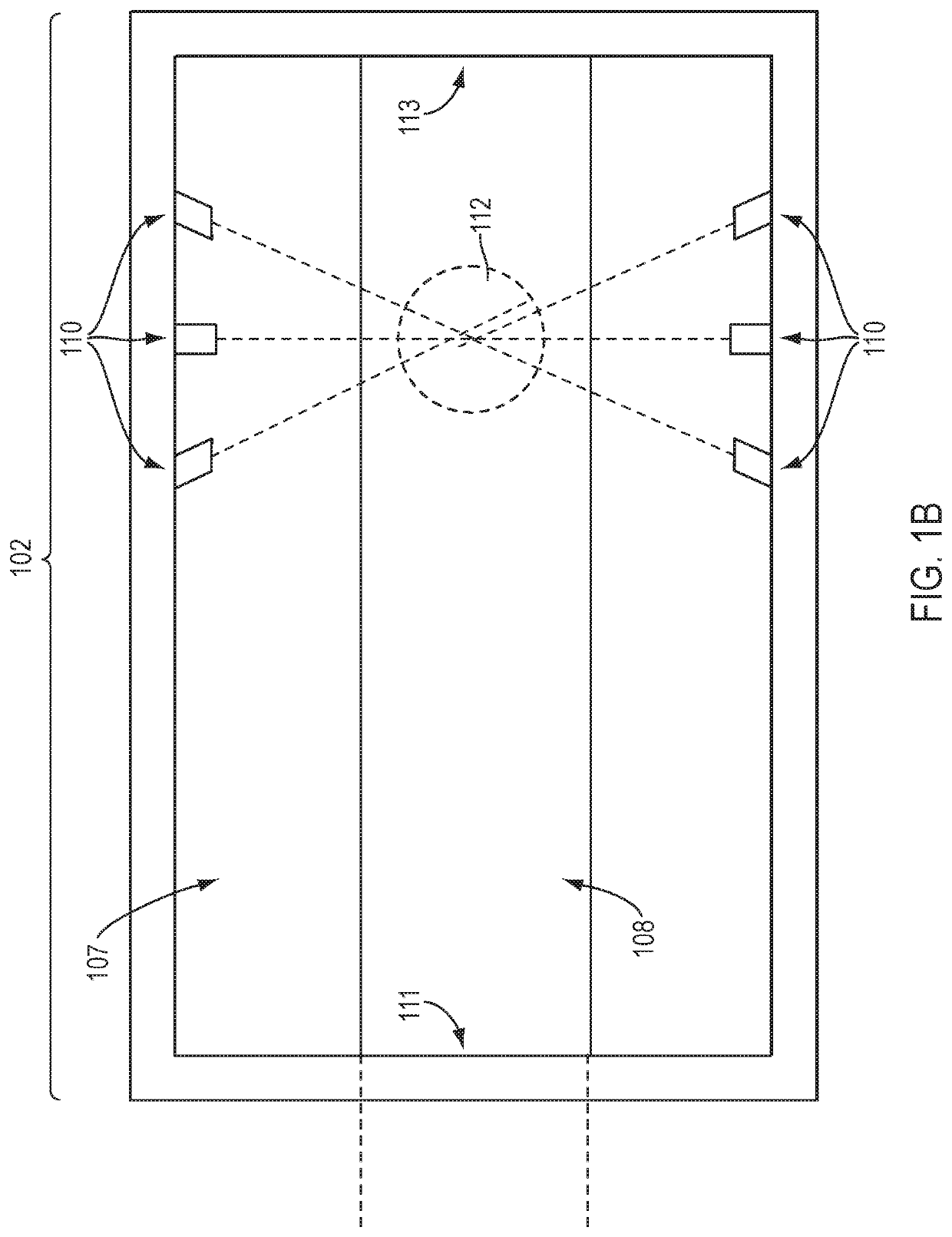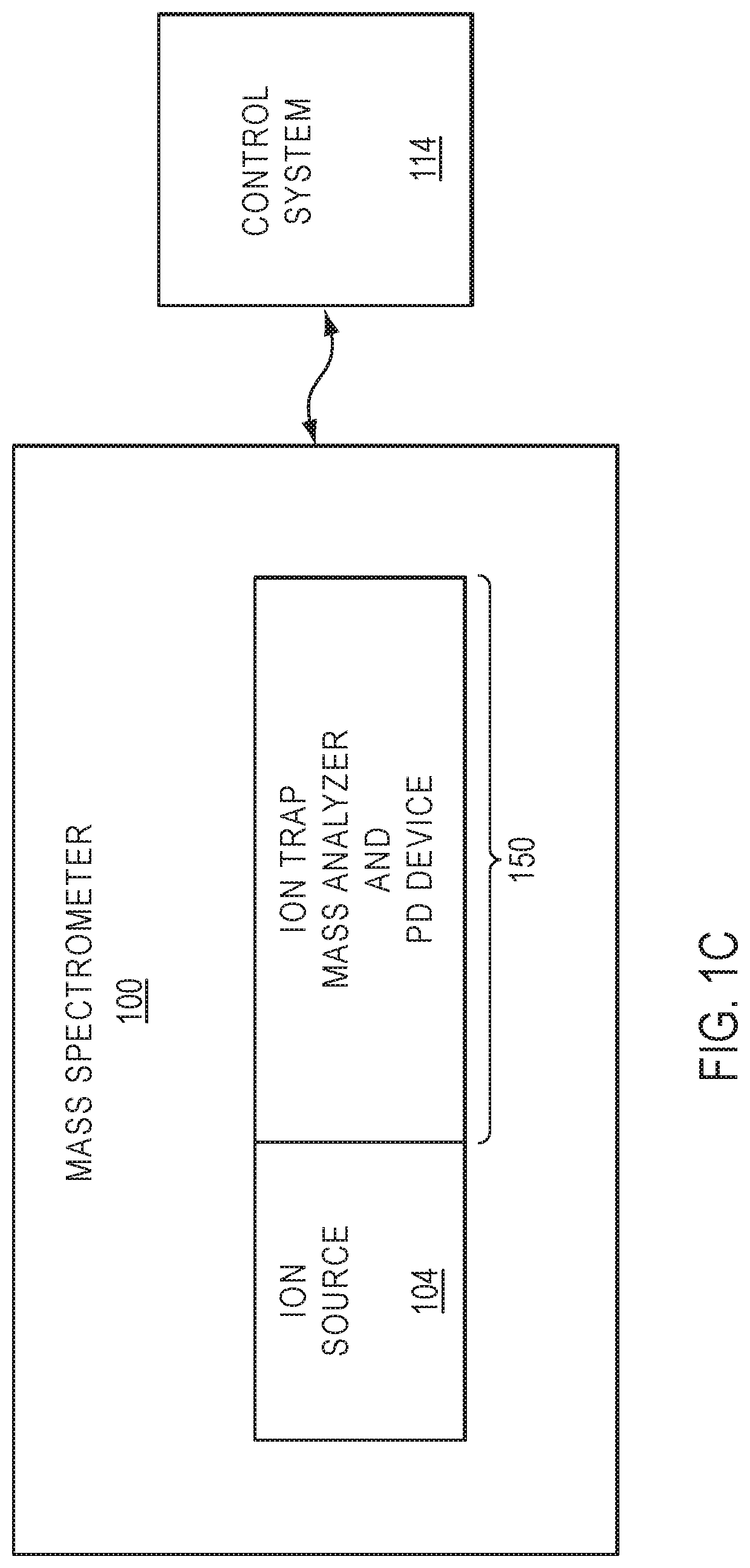Patents
Literature
35 results about "Ion dissociation" patented technology
Efficacy Topic
Property
Owner
Technical Advancement
Application Domain
Technology Topic
Technology Field Word
Patent Country/Region
Patent Type
Patent Status
Application Year
Inventor
Dissociation. When ionic compounds dissolve to produce ions the process is typically called dissociation. Dissociation of ionic compounds occurs when water molecules “pull apart” the ionic crystal. This occurs due to strong attractions between the polar ends of the water molecule and the positive and negative ions within the crystal.
Ion-mobility spectrometer and ion-mobility analysis method
InactiveUS20060071159A1High resolutionLow costTime-of-flight spectrometersMaterial analysis by electric/magnetic meansChemistryIon dissociation
There is provided an ion-mobility spectrometer. This apparatus includes the following configuration components: An ion source for generating first ions, a first drift unit for separating the first ions by flight drift times, an ion dissociation unit for generating second ions by dissociating the first ions separated, and a second drift unit for separating the second ions by flight drift times. Moreover, the first drift unit, the ion dissociation unit, and the second drift unit are located inside a chamber whose pressure is set at 10 mTorr or higher. This apparatus allows execution of low-cost and high-resolving-power ion separation and detection.
Owner:HITACHI LTD
Mass spectrometer and method of mass spectrometry
InactiveUS20110204221A1Prevent ion lossExtended reaction timeTime-of-flight spectrometersIsotope separationIon trap mass spectrometryIon dissociation
When a high-speed analyzer such as a quadrupole mass filter is united with an analyzer which requires a reaction time of 10 msec, such as an ion dissociation chamber of the ion trap type, a problem arises that an ion loss occurs due to a difference in analysis speed between the analyzers. A high-throughput analysis is intended to be achieved by eliminating this loss. A pre ion trap (4) is provided between a quadrupole filter (3) and an ion dissociation chamber (5), and ions are accumulated in the pre ion trap (4) while operations such as dissociation, isolation and ejection are being performed in the ion dissociation chamber (5). This configuration solves a problem with the ion dissociation chamber (5), which is a decrease in transmittance of the dissociation chamber (5), i.e., a decrease in throughput, and accordingly enables a high-throughput structural analysis on a measurement sample.
Owner:HITACHI LTD
Integrated interface-less solid electrolyte lithium ion battery and preparation methods thereof
ActiveCN105576287AImprove bindingImprove uniformityFinal product manufactureElectrolyte accumulators manufactureSolid state electrolyteIon dissociation
The invention provides an integrated interface-less solid electrolyte lithium ion battery. An electrode binder and a solid electrolyte material of the solid electrolyte lithium ion battery contain the same material ingredient and preferably, contain the same fluorosulfonimide group-containing polymer material component. The electrolyte and the electrode material of the integrated interface-less solid electrolyte lithium ion battery have good compatibility. The electrolyte and the electrode material containing the fluorosulfonimide group have low lithium ion dissociation energy so that lithium ion conductivity is improved in charge and discharge and battery internal resistance is reduced. The invention also provides two integrated battery preparation methods which have simple production processes and realize high electrode active material layer uniformity. The preparation methods have a wide application prospect in the field of solid electrolyte lithium ion batteries and especially in the field of high-rate and high-capacity power solid electrolyte lithium ion batteries.
Owner:NINGBO INST OF MATERIALS TECH & ENG CHINESE ACADEMY OF SCI
Process using combined capacitively and inductively coupled plasma process for controlling plasma ion dissociation
InactiveUS20070246443A1Increase ratingsIncrease ion densityElectric discharge tubesDecorative surface effectsCapacitanceIon dissociation
A method of processing a workpiece in the chamber of a plasma reactor includes introducing a process gas into the chamber, simultaneously (a) capacitively coupling VHF plasma source power into a process region of the chamber that overlies the wafer, and (b) inductively coupling RF plasma source power into the process region, and adjusting the extent of dissociation of species in the plasma by adjusting the ratio between the amounts of the capacitively coupled VHF power and the inductively coupled power. The method may further include controlling plasma ion density in the chamber by controlling the total amount of plasma source power capacitively and inductively coupled into the process region.
Owner:APPLIED MATERIALS INC
Rotating excitation field in linear ion processing apparatus
Methods for applying an RF field in a two-dimensional electrode structure include applying RF voltages to main electrodes and to compensation electrodes. The voltages on the compensation electrodes may be adjusted to be proportional to the voltages on the main electrodes. The adjustment(s) may be done to optimize the RF field for different modes of operation such as ion ejection and ion dissociation. For dissociation, a supplemental RF dipole may be applied, or two mutually orthogonal dipoles may be applied in phase quadrature to form a circularly polarized field. Electrode structures may include main trapping electrodes, one or more compensation electrodes, one or more ion exit apertures, and means for applying the various desired voltages.
Owner:AGILENT TECH INC
Mass spectrometer
InactiveUS20070181803A1Possible to detectParticle separator tubesIsotope separationIon trap mass spectrometryIon dissociation
In a mass spectrometer in which a high ion dissociation efficiency is possible, inserted electrodes are arranged with a form divided into two or more in the axial direction of the ion trap, an electric static harmonic potential is formed from a DC voltage applied to the inserted electrodes, and with an Supplemental AC voltage applied, ions in the ion trap are oscillated between the divided inserted electrodes in the axial direction of the ion trap by resonance excitation, and the ion with a mass / charge ratio within a specific range is mass-selectively dissociated. Thus, a high ion dissociation efficiency is realized by the use of ion trap of the present invention.
Owner:HITACHI LTD
Ion-mobility spectrometer and ion-mobility analysis method
InactiveUS7265345B2High resolutionLow costTime-of-flight spectrometersMaterial analysis by electric/magnetic meansIon dissociationAnalysis method
There is provided an ion-mobility spectrometer. This apparatus includes the following configuration components: An ion source for generating first ions, a first drift unit for separating the first ions by flight drift times, an ion dissociation unit for generating second ions by dissociating the first ions separated, and a second drift unit for separating the second ions by flight drift times. Moreover, the first drift unit, the ion dissociation unit, and the second drift unit are located inside a chamber whose pressure is set at 10 mTorr or higher. This apparatus allows execution of low-cost and high-resolving-power ion separation and detection.
Owner:HITACHI LTD
Electrolyte, battery using same and method of use of same, and electrolyte production method
InactiveCN102405551AImprove featuresImprove stabilityFinal product manufactureSmall-sized cells cases/jacketsLithiumImide
Disclosed are an electrolyte that has good ion conductivity at low temperatures, a battery using the same and a method of use of the same, and an electrolyte production method. A solid electrolyte (16) is disposed between a positive electrode (14) and a negative electrode (15). The electrolyte (16) is formed from an electrolyte salt, such as a lithium salt, carbon clusters, such as fullerenes, an organic solvent, such as acetone, and a liquid that is polar and causes ion dissociation of a polar electrolyte salt, such as EMITFSI (1-ethyl-3-methylimidazolium bis(trifluoromethansulfonyl)imide) or other ionic liquid.
Owner:SONY CORP
Rotating excitation field in linear ion processing apparatus
Methods for applying an RF field in a two-dimensional electrode structure include applying RF voltages to main electrodes and to compensation electrodes. The voltages on the compensation electrodes may be adjusted to be proportional to the voltages on the main electrodes. The adjustment(s) may be done to optimize the RF field for different modes of operation such as ion ejection and ion dissociation. For dissociation, a supplemental RF dipole may be applied, or two mutually orthogonal dipoles may be applied in phase quadrature to form a circularly polarized field. Electrode structures may include main trapping electrodes, one or more compensation electrodes, one or more ion exit apertures, and means for applying the various desired voltages.
Owner:AGILENT TECH INC
Adjusting field conditions in linear ion processing apparatus for different modes of operation
ActiveUS7405400B2Stability-of-path spectrometersBeam/ray focussing/reflecting arrangementsField conditionsIon dissociation
Methods for applying an RF field in a two-dimensional electrode structure include applying RF voltages to one or more main electrodes and compensation electrodes. The voltages on the one or more compensation electrodes may be adjusted to be proportional to the voltages on the main electrodes. The adjustment(s) may be done to optimize the RF field for different modes of operation such as ion ejection and ion dissociation. For dissociation and other procedures involving ion excitation, the voltages applied to the one or more compensation electrodes may be different from the voltages applied to the one or more main electrodes. Electrode structures may include main trapping electrodes, one or more compensation electrodes, one or more ion exit apertures, and a device or circuitry for applying the various desired voltages.
Owner:AGILENT TECH INC
Ion trap mass spectrometer
Owner:HITACHI LTD
Photocatalyst suspension, anti-adhesion self-cleaning artificial board decorative paper and preparation method thereof
ActiveCN107151941AStrong reductionStrong oxidation abilityCoatings with pigmentsSpecial paperIon dissociationOperability
The invention discloses nano titanium dioxide suspension. By optimization of selection and proportion of raw material components, a visible light absorption wavelength range is effectively expanded, efficient negative ion dissociation capability is achieved after surface coating formation, and accordingly better air purification and bactericidal efficacies can be achieved. By introduction of nano graphene oxide excellent in thermal conductivity and electricity conductivity into the raw material components, the suspension has excellent anti-adhesion and antistatic performances after solidification. The nano titanium dioxide suspension is high in stability, and a preparation method is simple, high in operability and beneficial to industrial large-scale production. The invention further discloses anti-adhesion self-cleaning artificial board decorative paper. The surface of the anti-adhesion self-cleaning artificial board decorative paper is coated with a nano titanium dioxide photocatalyst coating, an efficient negative ion release performance is achieved, and a preparation method of the decorative paper has advantages of simplicity, high efficiency, environmental friendliness and the like. Laminated artificial decorative boards meet requirements of JC / T2110-2012 Indoor Air Ion Concentration Test Method.
Owner:GUANGDONG T&H NEW MATERIALS CO LTD
Electrochemical antiseptic device using latticed titanium anode and protection device
The invention discloses an electrochemical antiseptic device using a latticed titanium anode and a protection device. A protection cover is arranged on the upper surface of a reinforced concrete member; an electrolyte solution is placed in the protection cover; a metal net is arranged on the inner side of the protection cover; an anode of a direct-current power supply is connected with the metal net through a wire penetrating through a first open hole, and a cathode of the direct-current power supply is connected with a reinforcing steel bar through the wire penetrating through a second open hole, so that an electrical circuit is formed. The protection cover with adjustable area is adopted to place the electrolyte solution, and can be adjusted aiming at different conditions, so that the application range is wide, and meanwhile, the defects of small single working range and low efficiency in existing chloride ion dissociation are overcome; the lithium hydroxide electrolyte are adopted, so that the possibility of alkali-aggregate reaction is less than the possibility by adopting a calcium hydroxide solution; the metal net at the sacrificial anode part adopts the titanium metal net, which cannot be corroded, can also be recycled, and cannot produce pollution on the concrete surface.
Owner:JSTI GRP CO LTD +2
Pulse electroplating agent capable of plating high-aspect-ratio through holes and blind holes, and preparation method thereof
InactiveCN110373687AImprove decomposition efficiencyImprove anode transfer efficiencyIon dissociationPolyamide
The invention provides a pulse electroplating agent capable of plating high-aspect-ratio through holes and blind holes, and a preparation method thereof. The pulse electroplating agent comprises polyethylene glycol, sodium polydisulpropane sulfonate, formaldehyde, a fatty amine and ethylene oxide addition product, crosslinked polyamide, sulfuric acid, ethylene sulfur vein, sodium dodecyl sulfonate, bisbenzenesulfonic acid imide and the balance water. The blocking ability of the low-current zone agent is improved by adding PEG20000, specifically, the anode ion-dissociation efficiency is improved by applying PEG20000, and the anode migration efficiency is improved. Plating layer crystals are refined by adding the bisbenzenesulfonic acid imide, the blind hole filling effect is improved, and the quality of a blind hole plating layer is improved.
Owner:广州皓悦新材料科技有限公司
Polymer single ion conductor and preparation method thereof, composite cathode and solid state lithium battery
ActiveCN110137496AIncrease dissociationIncreased dissociation-association rateSecondary cellsNon-aqueous electrolyte accumulator electrodesCalcium hydroxideElectrical conductor
The invention provides a polymer single ion conductor which is formed by reacting lithium hydroxide with a carboxyl-containing polymer with a structure shown in a formula (I). The polymer has a main chain structure of -CH2-CH-, the main chain is carried with carboxyl lithium side groups, under the action of a polymer chain segment motion, the carboxyl lithium moves with the main chain, and dissociation and combination of lithium ions between the two carboxyl lithium side groups so as to conduct the lithium ions. After a lithium ion dissociation agent containing BF3 is added, -COO<-<Li<+> forms-COOF3B<->Li<+>, and the dissociation degree of the lithium ions is further improved to improve the dissociation and combination rate of the lithium ions and further improve the lithium ion conductivity.
Owner:SAIC MOTOR
Ion dissociation method based on quadrupole rod-ion trap tandem mass spectrometer
ActiveCN110610847ADecreased capture effectivenessDecreased dissociation efficiencyStability-of-path spectrometersIon trap mass spectrometryIon dissociation
The invention relates to the technical field of mass spectrometry and provides an ion dissociation method based on a quadrupole rod-ion trap tandem mass spectrometer. A sample is ionized by an electrospray ion source, ions with a set mass-to-charge ratio are screened out from ionized ions by utilizing a quadrupole rod to enter an ion trap, the ions are dissociated by the ion trap, and dissociatedfragment ions are stored in the ion trap, wherein two processes of screening the target ions by the quadrupole rod and dissociating the ions by the ion trap are carried out at the same time. Differentfrom a traditional dissociation operation which occurs after an ion gate is closed, according to the method, a dissociation operation is applied to the ion trap while the target ions are screened bythe quadrupole rod, so that the target ions and impurity ions with similar mass-to-charge ratios are dissociated immediately when entering the ion trap, the dissociation of the target ions and the capture of the fragment ions are not interfered by the impurity ions, and the analysis accuracy is remarkably improved; meanwhile, the dissociation operation does not need to be carried out in an additional time sequence, so that the operation time is saved.
Owner:NAT INST OF METROLOGY CHINA
Mass spectroscope and mass spectrometry
ActiveUS8274044B2Easy to detectTime-of-flight spectrometersIsotope separationTime-of-flight mass spectrometryIon dissociation
Provided is a mass spectroscope employing electron capture dissociation wherein the peak number of detectable fragment ions is increased. The mass spectroscope comprises an ion source (2) for generating ions from a sample, an ion trap (3) for storing and selecting ions, an ion dissociation section (4) performing electron capture dissociation on ions, and a time-of-flight mass spectrometry section (7) performing mass spectrometry on ions, wherein the reaction time of electron capture dissociation is variable depending on the valence of ions subjected to mass spectrometry.
Owner:HITACHI HIGH-TECH CORP
Mass spectrometer and mass spectrometry method
ActiveUS20160314949A1Improve accuracyHigh sensitivityComponent separationElectron/ion optical arrangementsIon dissociationMass spectrometric
Owner:SHIMADZU CORP
Ion analysis device and ion dissociation method
ActiveUS11075067B2High levelAccurate analysisStability-of-path spectrometersMaterial analysis by electric/magnetic meansIon trap mass spectrometryIon dissociation
After a precursor ion has been captured within an ion trap (2), electrons having a high energy equal to or higher than 30 eV are introduced from an electron irradiator (7) into the ion trap (2) to increase the number of charges of the ion through an interaction between the electrons and the ion. Hydrogen radicals are subsequently introduced from a hydrogen radical irradiator (5) into the ion trap (2) to dissociate the ion by a hydrogen-attachment dissociation (HAD) method. The larger the number of charges of the ion is, the higher the dissociation efficiency by the HAD method becomes. Therefore, for example, even in the case of using an ion source in which most of the generated ions are singly charged ions as in a MALDI ion source, the dissociation efficiency can be improved by increasing the number of charges of the precursor ion within the ion trap (2).
Owner:SHIMADZU CORP
Mass spectroscope and mass spectrometry
ActiveUS20110121174A1Increase number of detectable peakEasy to detectIsotope separationMass spectrometersIon trap mass spectrometryTime-of-flight mass spectrometry
Provided is a mass spectroscope employing electron capture dissociation wherein the peak number of detectable fragment ions is increased. The mass spectroscope comprises an ion source (2) for generating ions from a sample, an ion trap (3) for storing and selecting ions, an ion dissociation section (4) performing electron capture dissociation on ions, and a time-of-flight mass spectrometry section (7) performing mass spectrometry on ions, wherein the reaction time of electron capture dissociation is variable depending on the valence of ions subjected to mass spectrometry.
Owner:HITACHI HIGH-TECH CORP
Ion analysis device and ion dissociation method
ActiveUS20200035478A1High dissociation efficiencyAccurate structural analysisStability-of-path spectrometersMaterial analysis by electric/magnetic meansIon trap mass spectrometryIon dissociation
After a precursor ion has been captured within an ion trap (2), electrons having a high energy equal to or higher than 30 eV are introduced from an electron irradiator (7) into the ion trap (2) to increase the number of charges of the ion through an interaction between the electrons and the ion. Hydrogen radicals are subsequently introduced from a hydrogen radical irradiator (5) into the ion trap (2) to dissociate the ion by a hydrogen-attachment dissociation (HAD) method. The larger the number of charges of the ion is, the higher the dissociation efficiency by the HAD method becomes. Therefore, for example, even in the case of using an ion source in which most of the generated ions are singly charged ions as in a MALDI ion source, the dissociation efficiency can be improved by increasing the number of charges of the precursor ion within the ion trap (2).
Owner:SHIMADZU CORP
High-collision-energy alternating voltage ion dissociation device and mass spectrometry method
PendingCN112233963ASimple structureLow processing and manufacturing costsParticle separator tubesIon dissociationMass Spectrometry-Mass Spectrometry
The invention provides a high-collision-energy alternating voltage ion dissociation device and a mass spectrometry method. The device is characterized in that the device comprises a pair of X electrodes which are parallel to each other, a pair of Y electrodes which are parallel to each other and a pair of end cover electrodes; and the X electrode pair and the Y electrode pair are parallel to eachother and have equal distances to the geometric center of the device. The at least one pair of electrodes is divided into two electrodes in the axial direction (the z direction is perpendicular to thexy plane). The phases of alternating voltages applied to the two electrodes on one side by a first alternating voltage power supply are opposite; and a second alternating voltage power supply appliesalternating voltage with the same or opposite phase as the output signal of the first alternating voltage power supply to the two electrodes on the other side. According to the high-collision-energyalternating ion dissociation device and method, the structure is simple, the machining and manufacturing cost is low, and the voltage applying mode is easy to achieve.
Owner:SHANGHAI YUDA IND
Collision-induced dissociation pool for ion cascade mass spectrometry and application method thereof
PendingCN110310881AImprove the efficiency of collision-induced dissociationIncrease the collision energyElectron/ion optical arrangementsSpectrometer combinationsIon dissociationMass Spectrometry-Mass Spectrometry
The invention discloses an ion collision-induced dissociation pool for ion cascade mass spectrometry. The pool is characterized by comprising a multi-pole electrode system symmetrically distributed about a symmetry central axis of a cascade mass spectrometry electrode system, covering electrodes symmetrically disposed at periphery of multiple poles about the central symmetry axis, and a working power source, wherein the area of a cross section of the covering electrodes along the ion inlet-to-outlet direction of the ion collision-induced dissociation pool gradually increases, the working powersource is used for providing an operating voltage to the multiple poles and the covering electrodes to provide a gradient electric field to make ions move from an entrance of the collision-induced dissociation pool to an outlet. The pool is advantaged in that a potential gradient along the symmetry central axis of the cascade mass spectrum can be generated, fragment ions are accelerated to pass through the ion collision-induced dissociation pool, ion collision energy is enhanced, ion dissociation efficiency is improved, and the time that fragments pass through the ion collision-induced dissociation pool is shortened.
Owner:NINGBO UNIV
Mass spectrometer and mass spectrometry method
ActiveUS9734997B2Improve accuracyHigh sensitivityComponent separationElectron/ion optical arrangementsIon dissociationMass spectrometric
The degree of ion dissociation which occurs within a first intermediate vacuum chamber (212) maintained at a comparatively low degree of vacuum depends not only on the amount of energy of the ion but also on the size and other properties of the ion. Accordingly, a predetermined optimum level of DC bias voltage is applied to an ion guide (24) so as to create, within the first intermediate vacuum chamber (212), a DC electric field which barely induces the dissociation of an ion originating from a target compound in a sample while promoting the dissociation of an ion originating from a foreign substance which will form a noise signal in the observation of the target compound. The optimum DC bias voltage is previously determined by creating extracted ion chromatograms based on data collected under various DC bias voltages and evaluating the SN ratio using the chromatograms. Consequently, the accuracy and sensitivity of the quantitative determination is improved as compared to a conventional system in which only the signal strength of the target compound is considered.
Owner:SHIMADZU CORP
One-pot synthesis method and application of anti-liver cancer drug selenite chitosan copper
ActiveCN110563859AGuaranteed complete esterificationPrevent esterification reactionOrganic active ingredientsAntineoplastic agentsIon dissociationSide reaction
The invention discloses a one-pot synthesis method of an anti-liver cancer drug selenite chitosan copper. The one-pot synthesis method comprises the following steps: 1, dissolving chitosan in a formicacid solution to obtain a chitosan acid solution; 2, adding an aqueous copper sulfate solution into the chitosan acid solution, carrying out a complexation reaction under a heating condition for 1 h,and adjusting the pH value of the obtained solution to 7 for 2-3 times until the complexation reaction is complete and the pH value does not drop in order to obtain a product I; 3, heating the product I, adding an aqueous seleninic acid solution in batches, and carrying out a reaction to generate a product II; and 4, cooling the product II, adding isopyknic ethanol until no precipitate is generated, filtering the obtained solution, and washing and drying the precipitate to obtain the selenite chitosan copper. The invention further discloses an application of the selenite chitosan copper in the preparation of antitumor drugs. The method has the advantages of no great change of the pH value of the solution, avoiding of copper ion dissociation and other side reactions, ensuring of complete esterification of 6-hydroxyl groups of chitosan, and increase of the selenization amount.
Owner:HUBEI UNIVERSITY OF MEDICINE
Photocatalyst suspension, anti-adhesion self-cleaning artificial board decorative paper and preparation method thereof
ActiveCN107151941BImprove stabilityEasy to prepareCoatings with pigmentsSpecial paperIon dissociationOperability
The invention discloses nano titanium dioxide suspension. By optimization of selection and proportion of raw material components, a visible light absorption wavelength range is effectively expanded, efficient negative ion dissociation capability is achieved after surface coating formation, and accordingly better air purification and bactericidal efficacies can be achieved. By introduction of nano graphene oxide excellent in thermal conductivity and electricity conductivity into the raw material components, the suspension has excellent anti-adhesion and antistatic performances after solidification. The nano titanium dioxide suspension is high in stability, and a preparation method is simple, high in operability and beneficial to industrial large-scale production. The invention further discloses anti-adhesion self-cleaning artificial board decorative paper. The surface of the anti-adhesion self-cleaning artificial board decorative paper is coated with a nano titanium dioxide photocatalyst coating, an efficient negative ion release performance is achieved, and a preparation method of the decorative paper has advantages of simplicity, high efficiency, environmental friendliness and the like. Laminated artificial decorative boards meet requirements of JC / T2110-2012 Indoor Air Ion Concentration Test Method.
Owner:GUANGDONG T&H NEW MATERIALS CO LTD
Tandem mass spectrometry and mass spectrometry
InactiveCN104007163BStructural analysis improvedComprehensive collectionSamples introduction/extractionMaterial analysis by electric/magnetic meansStructure analysisIon dissociation
The invention relates to a tandem mass spectrometer and a mass spectrometry method, aiming at improving the precision of structural analysis and identification of compounds by collecting information of many product ions in a short time. For this purpose, an ion trap (5) is arranged between the collision cell (3) and the time-of-flight mass separator (6). During the time period during which precursor ions originating from the same compound are selected using the quadrupole mass filter (2), the collision energy is changed from one to the other. Various product ions generated by dissociation under multi-level collision energy respectively and precursor ions that are not dissociated are temporarily trapped in the ion trap (5), and are captured in the form of packets in the state where these ions are mixed is injected and introduced into the time-of-flight mass separator (6) to be subjected to mass spectrometry. Thereby, in the data processing unit ( 21 ), an MS / MS mass spectrum is generated in which the product ions produced in the various dissociation modes occur under the various CID conditions.
Owner:SHIMADZU SEISAKUSHO CO LTD
Modified diatomite additive for electrolyte for lithium battery and preparation method
InactiveCN108666621AGood effectReduce flatulenceSecondary cells servicing/maintenanceIon dissociationDecomposition
The invention provides a modified diatomite additive for an electrolyte for a lithium battery and a preparation method. The method comprises the steps of firstly preparing a starch ether solution andadjusting the starch ether solution to strong alkalinity by using sodium hydroxide; adding fatty acid and diatomite powder to the starch ether solution, carrying out heating and stewing and adjustinga system to strong acidity by using diluted hydrochloric acid; and filtering, washing a product to neutrality by using deionized water and carrying out vacuum drying dehydration to obtain the modifieddiatomite additive for the electrolyte for the lithium battery. According to the method, decomposition of hexafluorophosphate is inhibited in a lithium ion dissociation process through filling diatomite with starch ether and absorbing the hydrogen fluoride and trace water by the diatomite, gas expansion of the lithium battery is effectively reduced and the viscosity stability of the electrolyte for the lithium battery at low temperature can be improved, thereby improving the low temperature performance of the lithium battery.
Owner:CHENDU NEW KELI CHEM SCI CO LTD
Hydrogen and its isotope molecular ion dissociation device and dissociation method
The invention relates to a device and a method for dissociation of hydrogen and isotope molecular ions of hydrogen. The method comprises the steps of exciting the electrons in hydrogen and the isotope molecular ions of hydrogen into a dissociative state by ultrashort resonance ultraviolet pulse with the central wavelength of 200 nanometers; after that, controlling the movement of the electrons which are in the dissociative state by terahertz pulse (11.7 terahertz) with the central wavelength of 25.6 microns to realize the control for the dissociation process of hydrogen and the isotope molecular ions of hydrogen and further realize the control for the chemical reaction process. The simulated results prove that for H<2+>, 99.3% of electrons which are in the dissociative state are controlled within a selected nucleon; for D<2+> and T<2+>, the dissociation control rates of 98.9% and 98.2% can be realized.
Owner:SHANGHAI INST OF OPTICS & FINE MECHANICS CHINESE ACAD OF SCI
Devices, systems, and methods for dissociation of ions using light emitting diodes
ActiveUS11133160B2Minimize damageFacilitate alignment and overlapSpectrometer circuit arrangementsIon sources/gunsIon dissociationMass analyzer
Systems, methods, and devices to dissociate ions using one or more light emitting diodes (LEDs). A mass spectrometer for ion dissociation includes an ion source for providing ions for dissociation, a mass analyzer, and a photodissociation (PD) device. The PD device includes an ion transport device. The ion transport device is configured perform one or more of: transporting the ions through the PD device, and trapping the ions within a region of the PD device. The PD device also includes one or more LEDs positioned to irradiate the ions in the PD device, resulting in fragmentation of the ions.
Owner:THERMO FINNIGAN +2
Features
- R&D
- Intellectual Property
- Life Sciences
- Materials
- Tech Scout
Why Patsnap Eureka
- Unparalleled Data Quality
- Higher Quality Content
- 60% Fewer Hallucinations
Social media
Patsnap Eureka Blog
Learn More Browse by: Latest US Patents, China's latest patents, Technical Efficacy Thesaurus, Application Domain, Technology Topic, Popular Technical Reports.
© 2025 PatSnap. All rights reserved.Legal|Privacy policy|Modern Slavery Act Transparency Statement|Sitemap|About US| Contact US: help@patsnap.com
